INTERVIEW: Dr Linda Mulligan, Chief State Pathologist






































































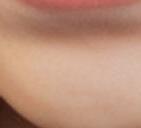



























































































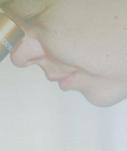




























































INTERVIEW: Dr Linda Mulligan, Chief State Pathologist






























































































































































































































“When I got my diagnosis I decided that I would do anything to stop this from happening to anyone else.”
Laura Brennan,1994 - 2019
If you missed out on the HPV vaccine at school, see if you are eligible to get one now as part of the Laura Brennan catch-up programme on HPV.ie

4 NEWS: UNESCO calls for new rules to curtail or ban smartphones from schools; New MicroCreds site launched
5 NEWS: Fund a publicly-run Early Years and School Age Care system by 2029 - Early Childhood Ireland; Over 3,500 family members supported by free online eating disorders programme since 2020
7 NEWS: Young people to learn about shaping EU democracy with a toolkit for schools; New platform 'IELTS Ready: Premium' provides British Council IELTS test-takers with advanced test prep; Department confirms 15,625 Ukrainian pupils enrolled in Irish schools
34 OMW Supplies - Sports and recreation supplies fully covered
37 The James Joyce Centre: Joyce and the City
38 BRIEFING: The DARE route to third level access
40 FEATURE: University of Galway Access Centre
42 Irish Defence Forces General Service
47 OEM Engineering Apprenticeship at Cavan and Monaghan ETB
48 The ESB Networks Apprenticeship Programme
50 Transport Operations and Commercial Driving Apprenticeship
Editor: Niall
GormleyProduction: Michael
FarrellPublishers
Ard Education Ltd.
P: 01 832 9246
E: ardeducationltd@clubi.ie www.educationmagazine.ie
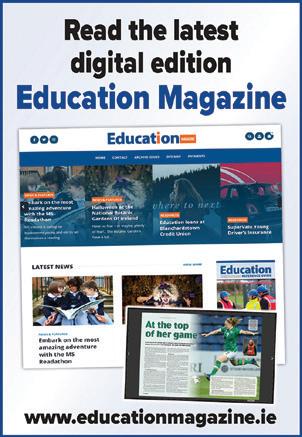
Design
Real Issues
086-8986827
Printers W&G Baird Ltd
At the time of press information in Education is believed to be accurate and authoritative. However, some information may change due to circumstances beyond our control. Acceptance of advertisements, does not constitute an endorsement of products or services by the publishers.
© 2023. All rights reserved.
Reproduction in whole or in part without permission is prohibited.
ISSN 0791-6161
9 NEWS: Hubs offering electric cars, e-bikes and e-cargo bikes to test potential of shared e-mobility to decarbonise transport; New €5m pilot of counselling and wellbeing/mental health supports; Revised National Framework for Doctoral Education and MyPhD.ie launched
11 NEWS: New profile of students with a disability in higher education; UL to participate in a unique new large-scale DutchIrish offshore renewables project
13 NEWS: Mother and daughter pen dual language children's book; UCC opens state-ofthe-art high-performance gym
15 Law Modules Ireland: A Transition Year and Senior Cycle Law Programme
17 Kick start your radio career with Learning Waves
18 COVER: Cork College of FET - Direct your own future
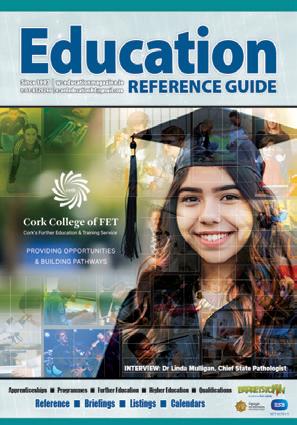
19 INTERVIEW: Dr Linda Mulligan, Chief State Pathologist
23 Gartan Outdoor Education and Training Centre - Experiences on water and land
24 BRIEFING: Graduate Outcomes - What becomes of graduates after graduation?
26 Heritage Ireland OPW - Where the learner is at the centre of the educational experience
28 BodyWhys - Body image and why it matters
30 Vocations Ireland - Answer the call
32 BRIEFING: The HEAR route to third level learning
52 FEATURE: So you want to be a pilot? (Part 2)
54 Who are FIT? Creating wider access to tech skills training
58 BRIEFING: National Framework of Qualifications - Grid of Level Indicators
60 Liberties College - Your Further Education College in the Heart of the City
61 Rathmines College - an excellent way to progress
62 Training Services at Kilkenny and Carlow ETB
64 Paving the way for your future
67 Kerry College Listowel Campus
68 Nursing and Midwifery at UCC
70 NEWS: First consortium-led, multi-campus manufacturing engineering apprenticeships accredited
72 Sallynoggin College - From SCFE to Calvin Klein – who knows where your QQI Level 5 could take you?
74 GREEN NEWS: Householders generally positive towards new wind and solar farms
76 BRIEFING: The education system in numbers
78 LISTINGS:
81
THE Irish Universities Association (IUA) has launched a new national platform for short, flexible and university-accredited courses, MicroCreds.ie, developed as part of the MicroCreds project.
MicroCreds.ie will continue to evolve over the coming months, making it easier for both learners and enterprise to engage with short, flexible, and accredited courses in Ireland. Irish universities are continuing to develop new micro-credentials to address specific skills needs and these new course offerings will continue to be added to the platform over the coming months.
MicroCreds is a 5-year, €12.3 million project (2020-2025) led by the IUA in partnership with seven IUA universities: DCU, Maynooth University, TCD, UCC, UCD, UG and UL.
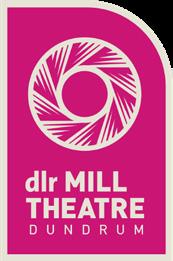
Through the MicroCreds project, Ireland is the first European country to establish a coherent National Framework for quality assured and accredited microcredentials.
"THE digital revolution holds immeasurable potential but, just as warnings have been voiced for how it should be regulated in society, similar attention must be paid to the way it is used in education.
"Its use must be for enhanced learning experiences and for the well-being of students and teachers, not to their detriment. Keep the needs of the learner first and support teachers. Online connections are no substitute for human interaction."


So said UNESCO DirectorGeneral Audrey Azoulay calling for the 'appropriate' use of technology in the world's classrooms. The statement came on foot of the release of a new global UNESCO report 'Technology in education: A tool on whose terms?'
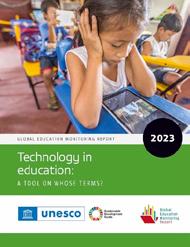
The report cites evidence showing that learning benefits disappear if technology is used in excess or in the absence of a qualified teacher.
UNESCO Director Manos Antoninis said: "We need to teach children to live both with
and without technology; to take what they need from the abundance of information, but to ignore what is not necessary; to let tech support, but never supplant human interactions in teaching and learning".
The report also acknowledges advantages new tech has for education and learning. It says accessible technology and universal design have opened up opportunities for learners with disabilities.
The report said: "Online learning stopped education from melting down during COVID-19 school closures. Distance learning had a potential reach of over 1 billion students; but it also failed to reach at least half a billion, or 31% of students worldwide – and 72% of the poorest".
The report says the focus should be on outcomes. In Peru, when over 1 million laptops were distributed without reference to teaching, learning did not improve. In the US, analysis of over 2 million students found that learning gaps widened when instruction was exclusively remote.
EARLY Childhood Ireland (ECI) is calling for children to be at the heart of Early Years and School Age Care in Ireland. ECI says that a large body of international evidence has established that high-quality care experiences for children provide long-lasting benefits for them, their families, and their communities in their 2024 budget submission document.
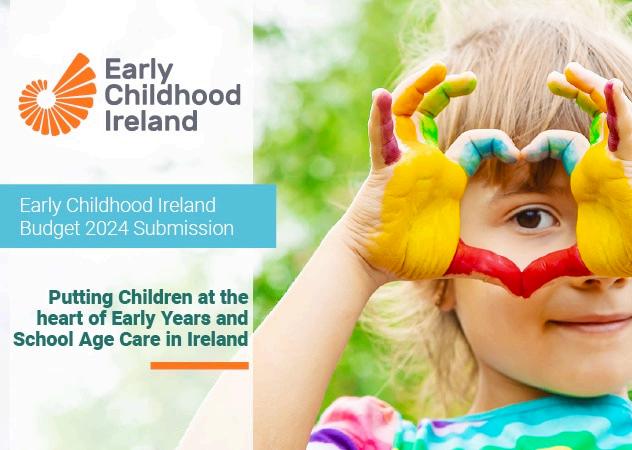
In its Budget submission, the organisation outlines five key proposals which build on existing provisions and policies but would also be transformative for the childcare sector.
■ Publish a 5-year plan for implementing additional investment, to reach €4bn – 1% of GDP – by early 2029, thus achieving a publicly funded Early Years and School Age Care system in Ireland.
■ Building on Aistear and as part of increasing investment, embed the philosophy of the world-renowned Reggio Emilia Approach in the system to ensure that the rights of children are interlinked with educators, families, and communities.
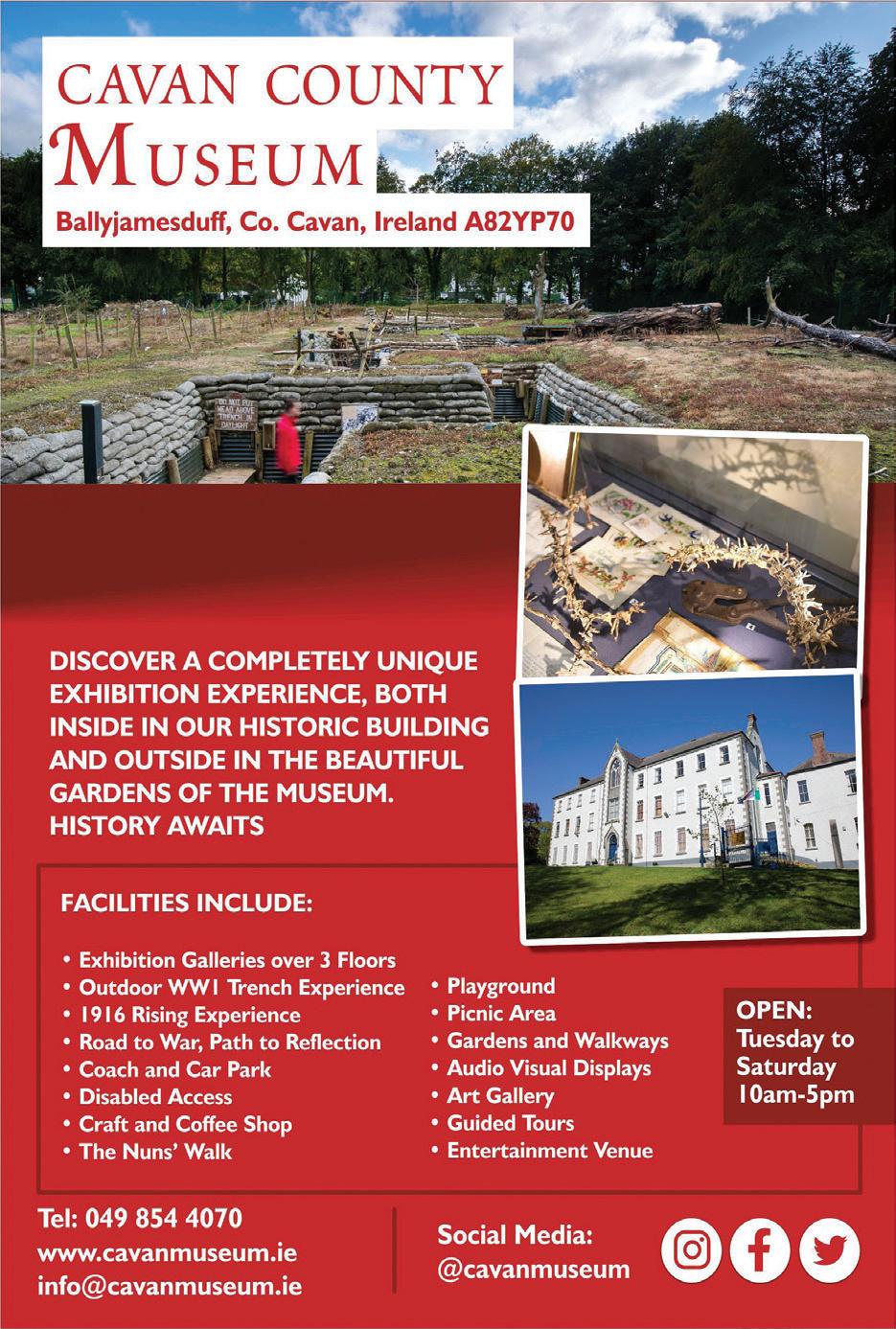
■ Unify the existing funding programmes: National Childcare Scheme (NCS), Early Childhood Care and Education (ECCE) and Core Funding, to allow settings to use capacity, not children’s attendance, as a funding measurement. This would offer improved flexibility to children, with no financial consequences for providers or parents.
■ Increase the Graduate Premiums to further incentivise the recruitment and retention of graduates.
■ Implement fully the ‘Better data’ recommendations from Partnership for the Public Good, and initiate a system of national and local 2-year and 5-year planning cycles to ensure there are enough Early Years and School Age Care places in settings and in childminders’ homes for children in their own communities.
"BODYWHYS has been running PiLaR, our family support programme, in an online capacity to provide this much needed support, with over 3,500 family members throughout the country having attended since 2020. We have extended our suite of services to provide additional support for families. A person does not need a diagnosis to avail of this support” according to
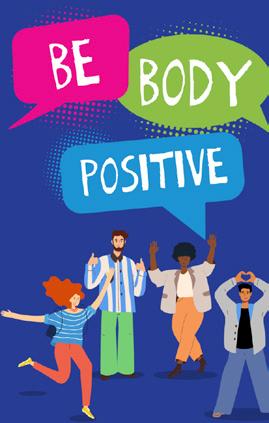
According to a recent report by the Health Research Board (HRB), the number of admissions for eating disorders to child and adolescent inpatient units, has more than doubled in the last 5 years, from 33 in 2018 to 80 in 2022.
Eating disorders are serious and complex mental health conditions with increased risk of mortality
Over 3,500 family members supported by free online eating disorders programme since 2020
Wide range of courses available in disiptines

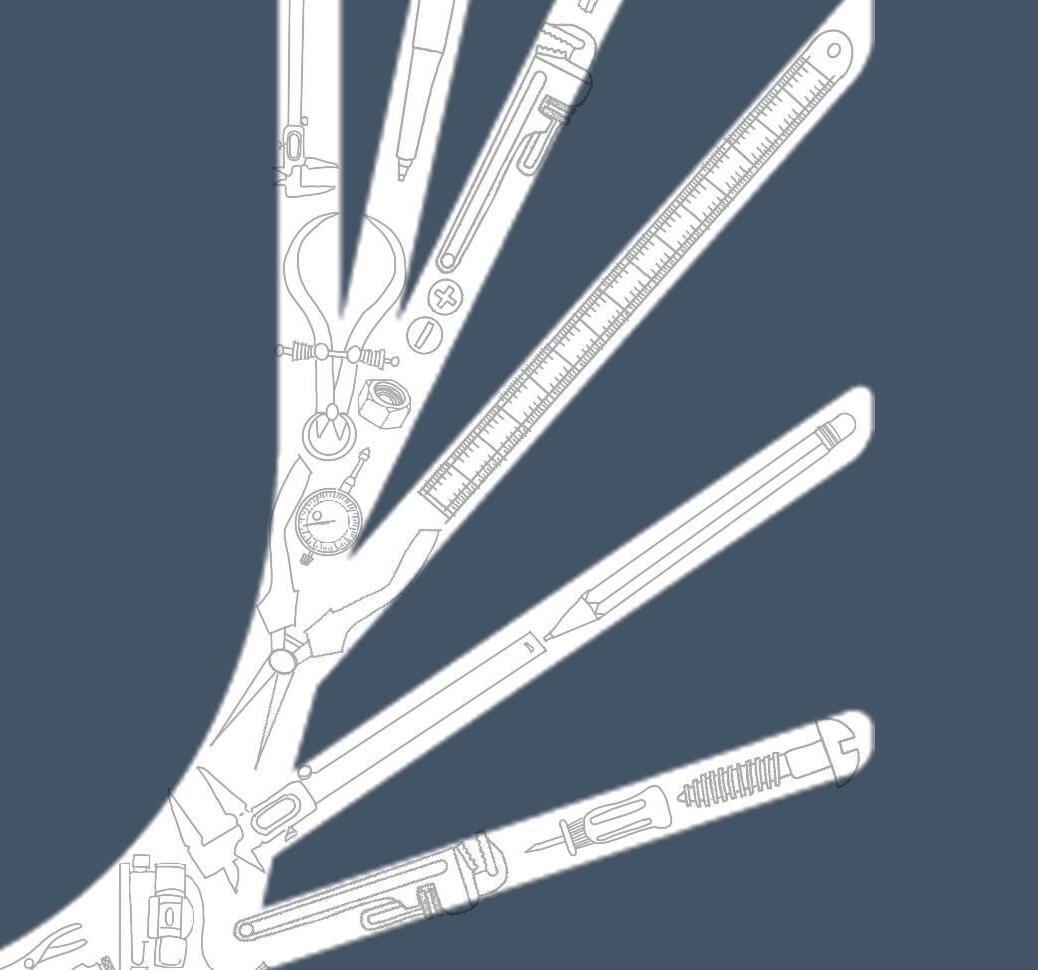
Electronic & Electrical Engineering Mechanical & Manufacturing Engineering Building Services & Sustainable Energy Engineering Construction Management, Quantity Surveying & Sustainable Civil Engineering, Architecture & Architectural BIM Technology
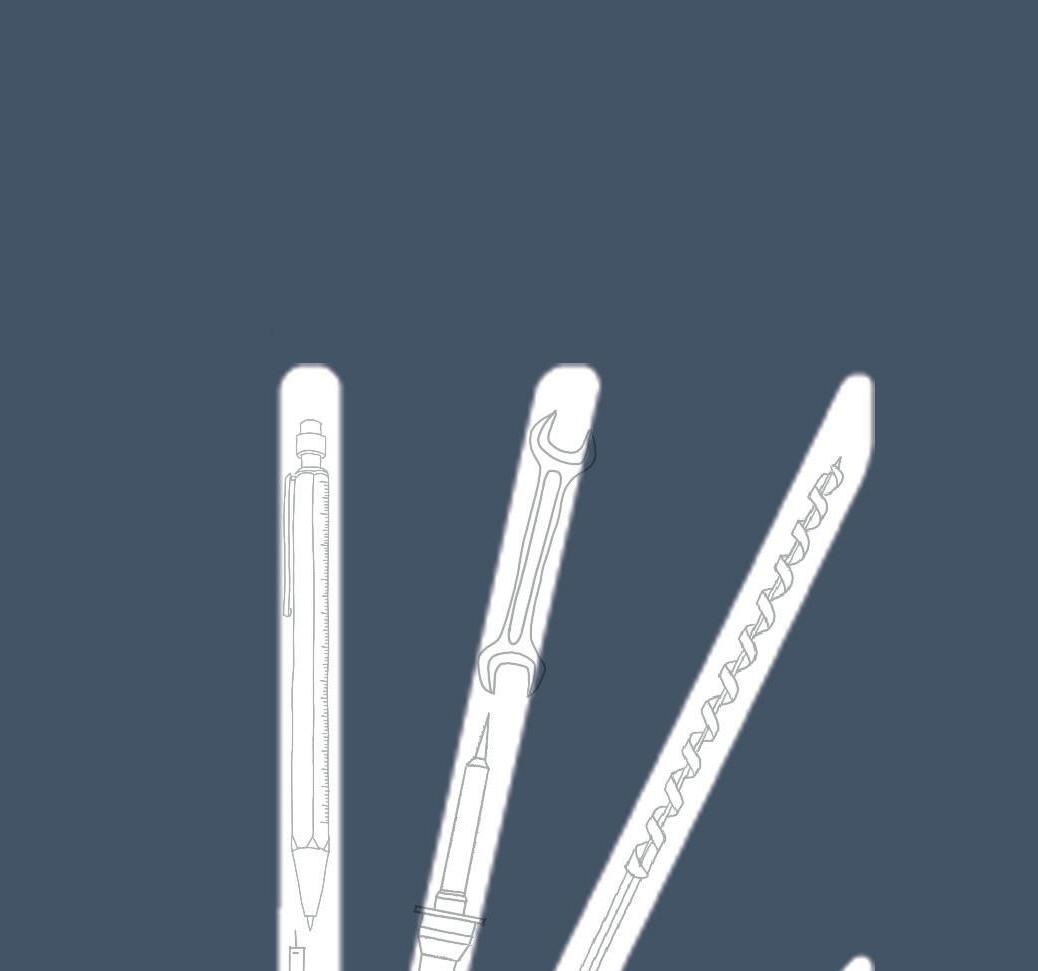
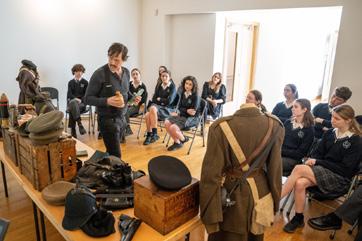
YOUNG people from across Europe will be able to learn how to shape the EU thanks to the toolkit for schools ‘EU Democracy in Action – Have Your Say with the European Citizens' Initiative’, launched in June.
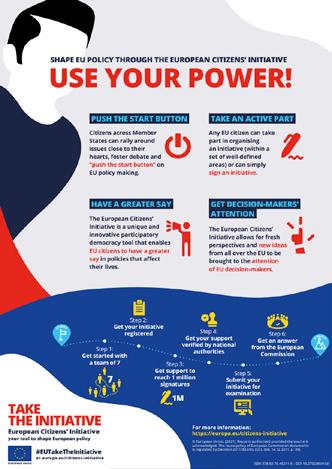
The toolkit has been designed to help high school students understand the benefits of cross-border cooperation and potentially launch their own initiatives to shape the democratic process across the EU.
The interactive ECI Toolkit for schools is designed to equip high school students with the knowledge and skills that will allow them to become more active and engaged EU citizens.
The toolkit comprises four thematic units, each with a different focus, moving from more general information about the European Union to specific information and activities related to the European
Where are we?
Galway City Museum is located close to the Spanish Arch and some of the finest remains of Galway's Medieval Wall
A range of exhibitions look at the various aspects of Galway's history.
Citizens’ Initiative.
More than 900 citizen organisers have started 101 European citizens' initiatives, out of which 17 were Irish organisers. More than 18 million signatures that support initiatives have been collected from across the EU, of which around 117 000 signatures were collected in Ireland.
More information is available at europa.eu/citizens-initiative
THE International English Language Testing System (IELTS) is the world’s most popular English language proficiency test for higher education and global migration.
More than 11,500 organisations globally trust IELTS. These organisations include educational institutions, employers, governments and professional bodies.

British Council IELTS have launched a new service, IELTS Ready: Premium, providing
innovative support for those preparing to take an IELTS test with the British Council.
The new platform is free for every person, who will register for IELTS with the British Council. It will include 40 IELTS mock tests, recorded classes and will be fully supported by native English speaking IELTS experts.
THE Dept of Education has confirmed that at the end of the school year 2022 / 2023, 15,625 Ukrainian pupils had been enrolled in schools across Ireland.
Out of that figure, 10,141 of
these pupils had been accommodated in primary schools while 5,484 pupils had enrolled in post-primary schools.
Data indicated an enrolment rate of 88% among Ukrainian children aged 5-18.
Engage with the archaeology of Galway and the stone forts of Aran in the MONUMENT exhibition.
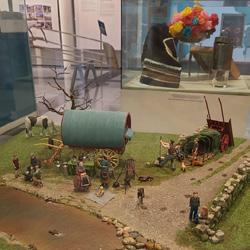
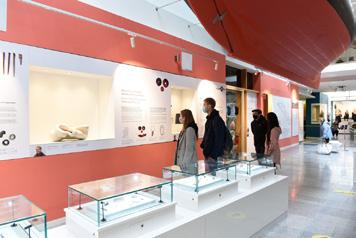
Appreciate the rich diversity of Galway's cultural tapestry
How would you like to engage with your museum? We can tailor tours to suit your needs.
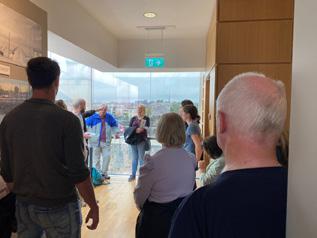
For more information on what there is to see and do at Galway City Museum

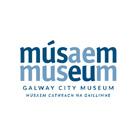
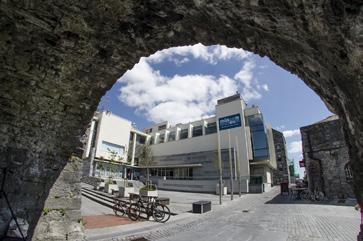
Concern Worldwide’s Global Citizenship Education Programme 2023-2023
Bring the world into your classroom and develop the skills of your students to become active global citizens through:
• Primary and secondary debating programmes
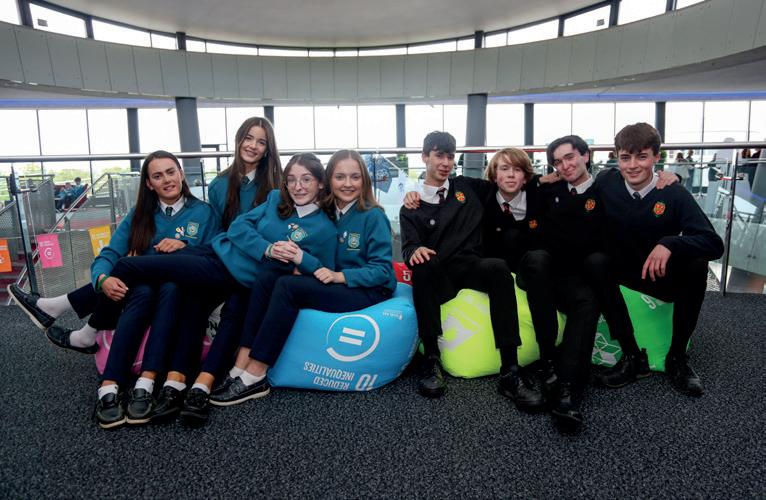
• Global Citizenship Education workshops focusing on the root causes and impacts of climate change, hunger, poverty, conflict and gender inequality
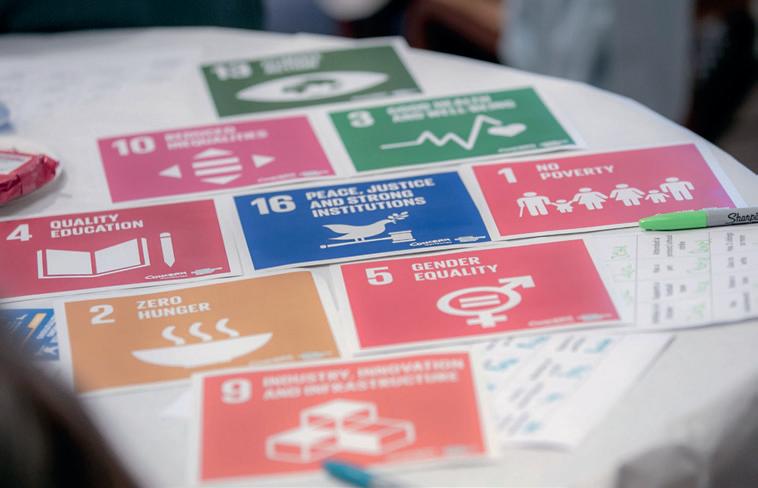
• School led programmes
• Work experience
• A range of resources to support you to support teaching and learning
For more information, visit www.concern.net/schools-and-youth or email schools@concern.net
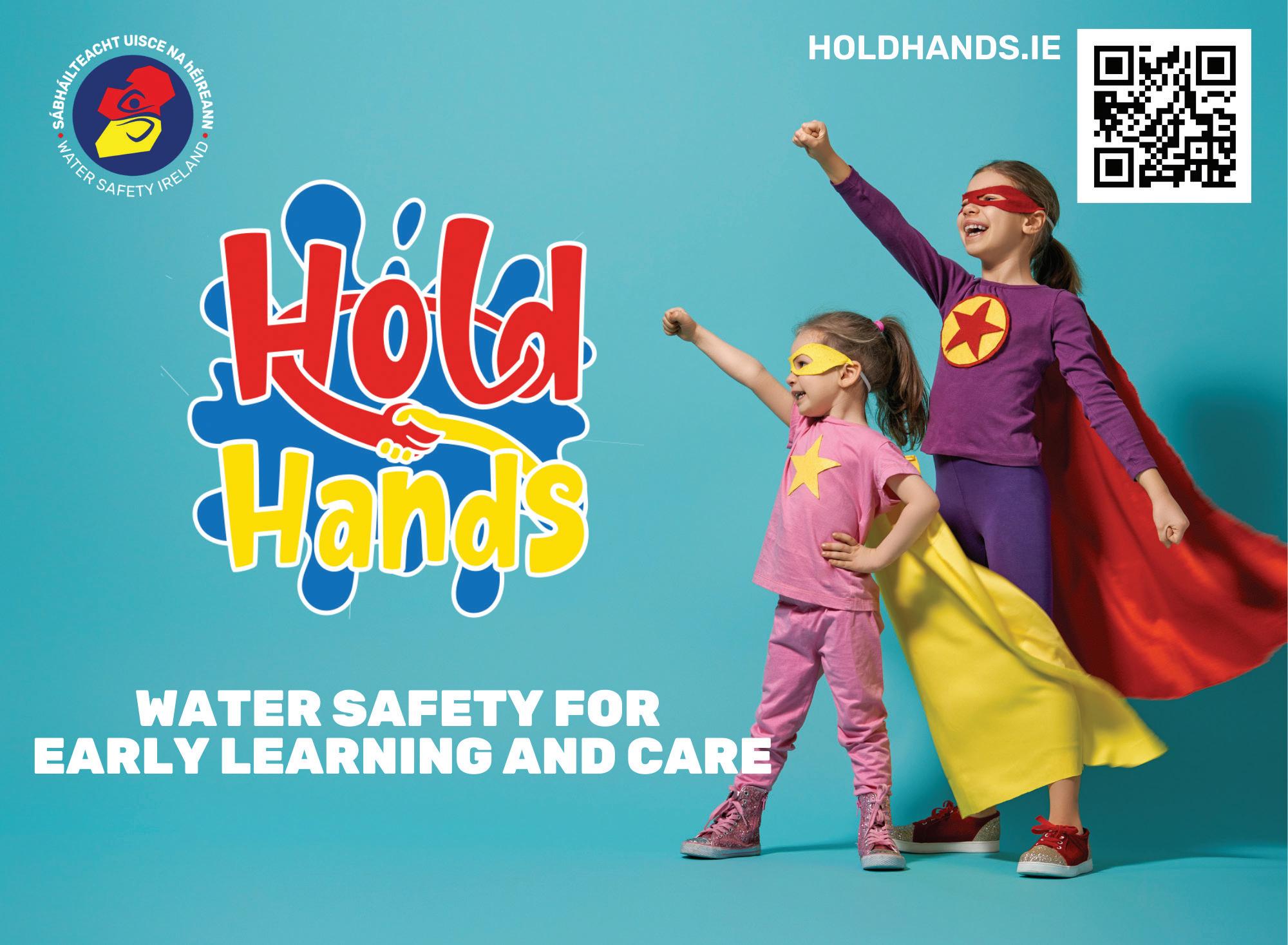
ATLANTIC Technological University together with Trinity College Dublin, ESB and Enterprise Rent-A-Car, will lead a €1.35m shared electric mobility project.
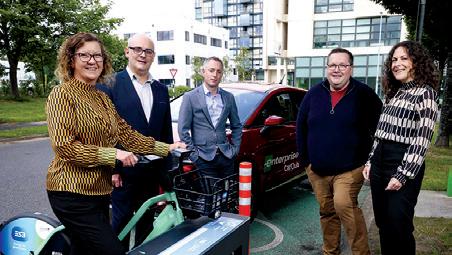
This project will deliver four shared electric mobility hubs in Dublin, Galway, Sligo and Donegal with each hub providing charging infrastructure, electric cars, ebikes and ecargo bikes for shared use.
The project will assess community adoption and hub usage patterns over a three-year trial period, testing the potential of shared emobility to decarbonise transport in Ireland. From the trial, the project will provide evidence on how such hubs can
THE government has announced details of the second strand of a programme of counselling and wellbeing/mental health supports to be piloted in a number of primary schools across the country from September 2023.
Strand two of the pilot programme will see the establishment of a new type of support for clusters of primary schools, as well as the introduction of Education Wellbeing / Mental Health Practitioners who will work under the direction and supervision of the National Educational Psychological Service.
Clusters of primary schools in Cork, Carlow, Dublin 7 and Dublin 16 will have the opportunity to take part in the second strand of the pilot programme.
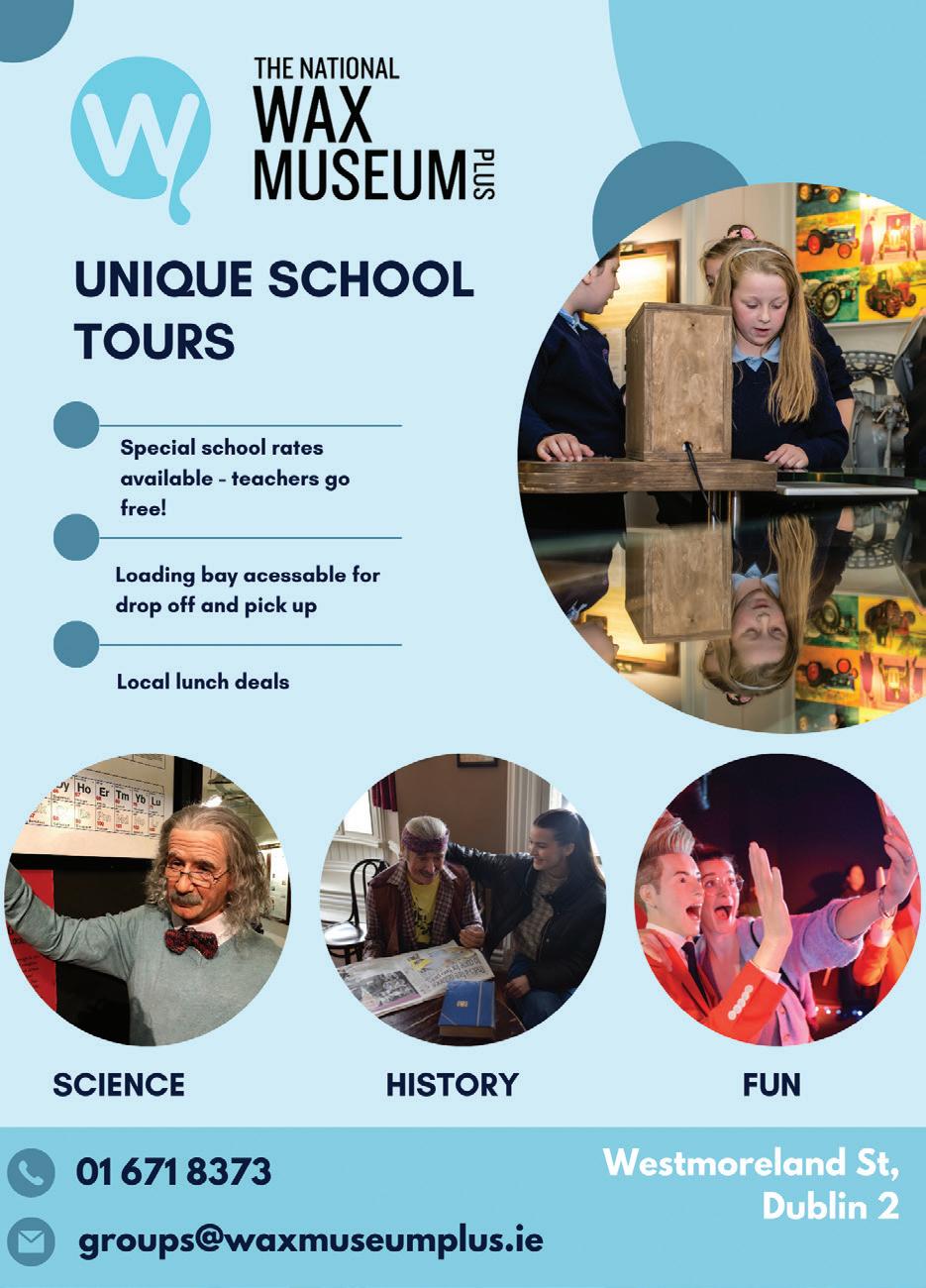
The supports to be provided will focus on strengthening whole-school preventative approaches and include the provision of psycho-education support for parents and teachers, as well as the provision of early intervention to groups of children or individual children with mild or emerging needs, using low-level therapeutically informed approaches.
Earlier, the first strand of the pilot includes the provision of an allocation of one-to-one counselling sessions for primary schools across counties Cavan, Laois, Leitrim, Longford, Mayo, Monaghan and Tipperary, via access to a Dept-approved counsellor.
work in different parts of the country and inform national and international transport decarbonisation policies.
Funding of almost €850,000 has been awarded by the Government through the SEAI.
THE revised National Framework for Doctoral Education (NFDE) was launched at the HEA Research Futures event in July. The event focused on the next steps to support Ireland’s research culture, research capacity, and infrastructures via our higher education and research system and how best to produce research with impact.
MyPhd.ie, a microsite that will act as a central online information hub for doctoral education in Ireland, was also launched at the Research Futures event. The site, generated by QQI and the IUA, includes a roadmap for the PhD journey from pre-entry to post-graduation.




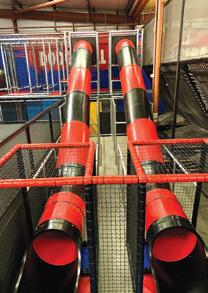

Why not check out our Jump Zone Trampoline and Inflatable Adventure Parks? Our Jump Zone Sandyford Park has had a major renovation while Jump Zone Liffey Valley is conveniently located in the shopping centre, or try out our brand new Inflatable Adventure Park in Santry. We have something for everyone!!
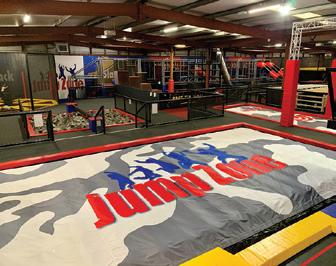
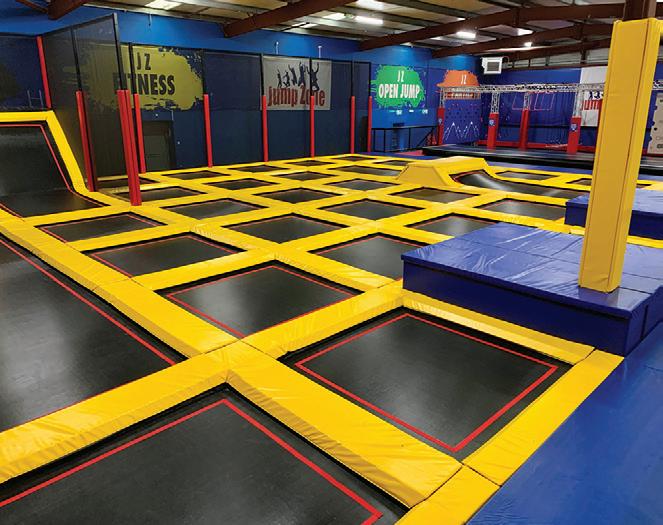
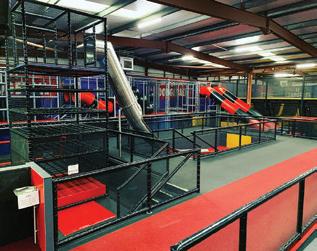
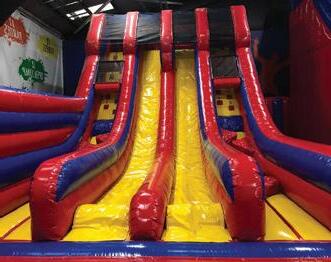
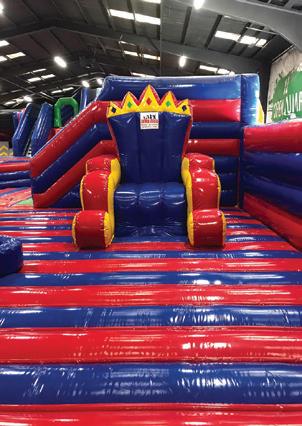
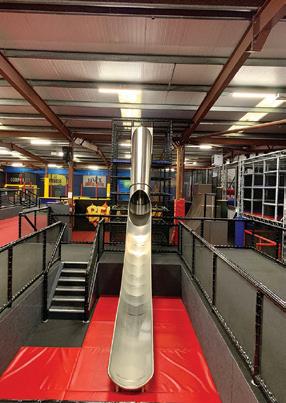
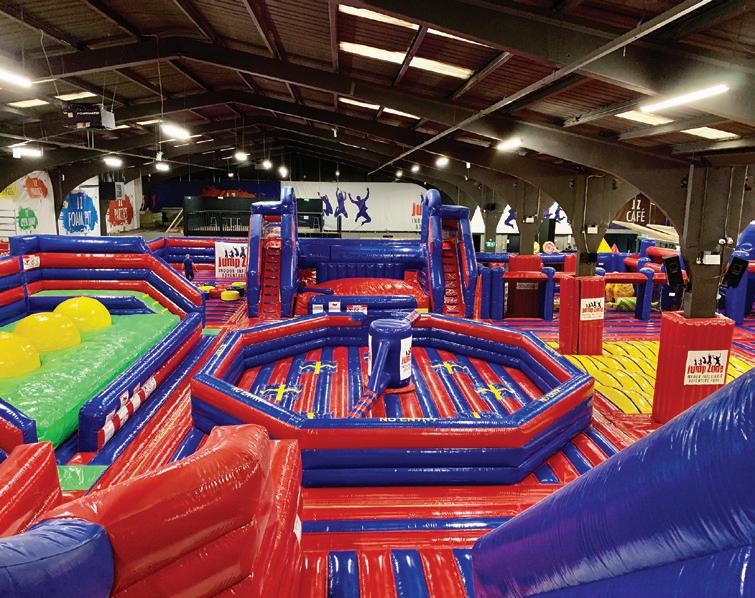
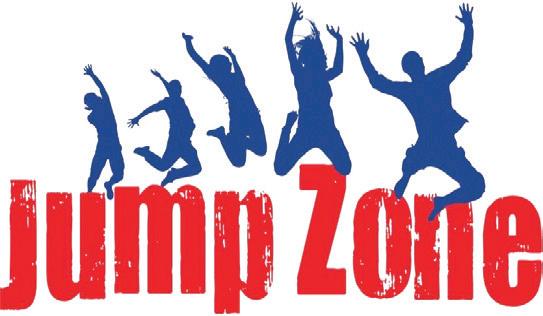
THE Higher Education Authority (HEA) has launched the first profile of students with a disability in higher education in Ireland. This profile compiles data from the last three academic years.
This report provides a first glance at the profile of students who report a disability in Irish higher education institutions. Understanding the profile of students with a disability is pivotal – to provide robust data and evidence, to improve equity of access and to promote accessibility to thirdlevel education for all. This report will assist the HEA to progress targeted interventions, as outlined in the National Access Plan 2022-2028.
Data from this report comes from the Equal Access Survey, a voluntary survey disseminated to first year students in HEAfunded institutions
The main findings in the report are:
■ Almost 3 in 4 full-time undergraduate new entrants respond to the Equal Access Survey
■ 18% of respondents state they have a disability
■ The most common disability amongst new entrants is Learning Conditions (37.0%), followed by Psychological / Emotional Conditions (31.2%)
■ Those with Learning Conditions are 53.9% male, whereas in all other categories women outnumber men
■ There are higher rates of mature students amongst those with Multiple Conditions (13.7%) and Physical Conditions (11.2%)
■ Wicklow has the highest rate of new entrants with a disability, at 23.1%

■ Those with a Physical Condition are most disadvantaged, with 13.9% coming from disadvantaged areas
■ 3% of new entrants who state they have a disability enter higher education through DARE
■ Arts & Humanities is the most common field of study for new entrants with a disability, as opposed to Business, Administration & Law for students without a disability
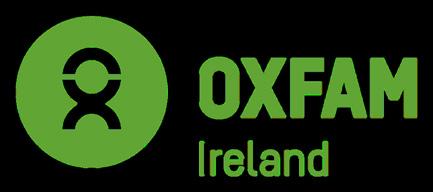
UNIVERSITY of Limerickis one of the stakeholders in the Dutch-Irish research project HybridLabs, to help accelerate the deployment of offshore renewable technologies for both electricity and hydrogen production.
It comes on foot of the declaration by An Taoiseach Leo Varadkar that the Shannon Estuary can become the ‘green digital powerhouse for the country’.
A unique Dutch Irish infrastructure of hybrid experimental facilities, simulators, and offshore demonstration sites, UL’s initial contribution to HybridLabs will be composed of research in materials circularity at the Bernal Institute and will be

embedded in a wider group of relevant projects.
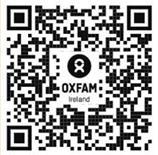
HybridLabs has been funded to the tune of €10m by the Netherlands Science Foundation NWO to address energy transition needs whilst also strengthening the offshore food and ecological transitions

CNI are a Healthcare Recruitment Agency providing a comprehensive sta ng and recruitment services to the healthcare sector throughout Ireland. We pride ourselves on our professional, personal and personable business approach. We have extensive experience in and knowledge of the Nursing and general health care recruitment eld having over 15 years’ experience within the Industry.
The CNI team are guided by four simple principals, The four M’s:





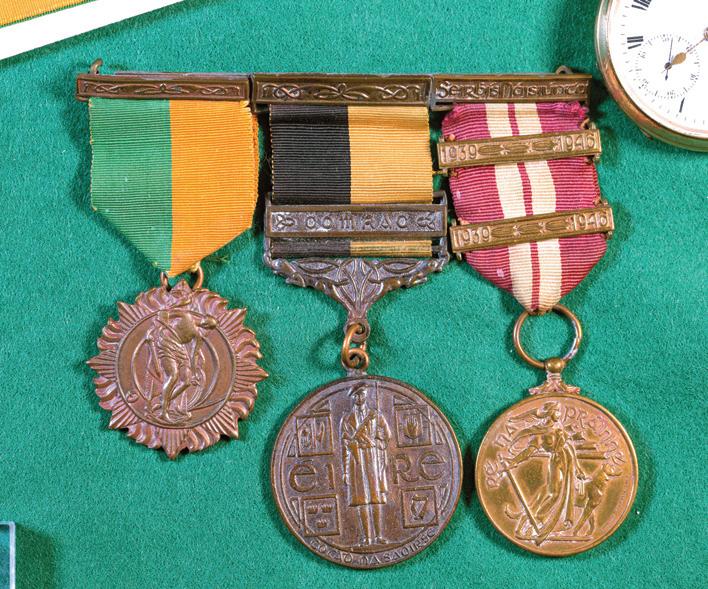

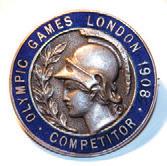

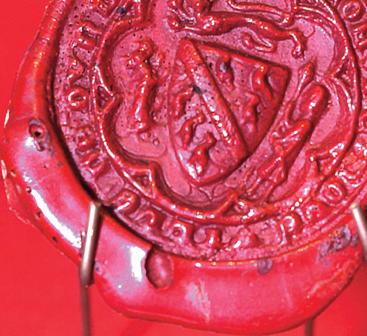


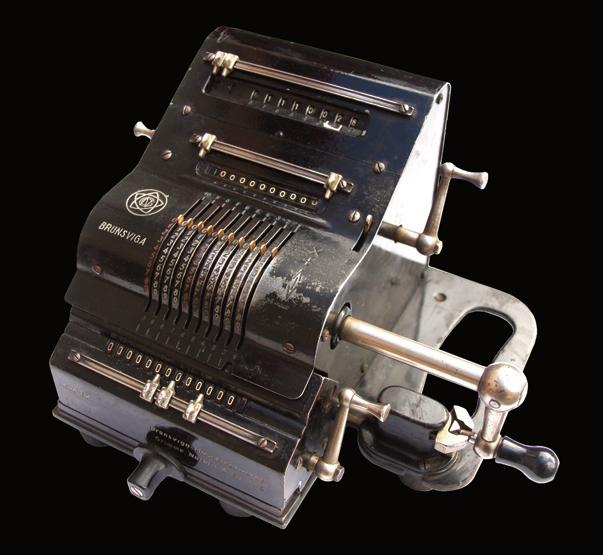

Matching, Monitoring, Managing and Mentoring
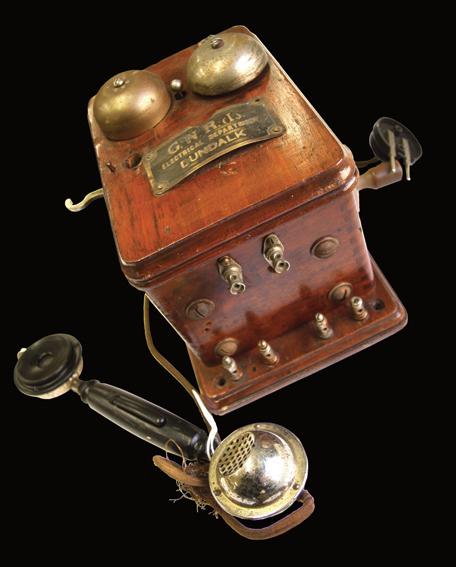
✔ We match your core skill sets to patients needs.
✔ We monitor your progress within each healthcare environment.

✔ We manage your placements in a manner that is unique to your availability.
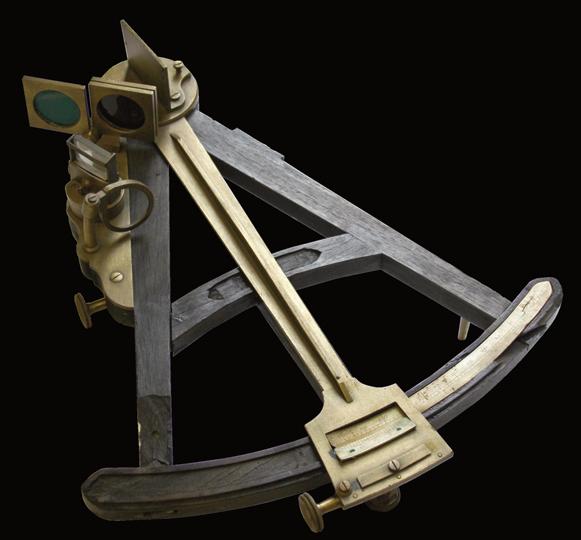









✔ We mentor our team members through the placement process in order to best develop their core skills and realise their professional ambitions.
As part of the CNI team, we will provide you with a wide range of part time and full-time professional options in a broad variety of locations throughout the country.
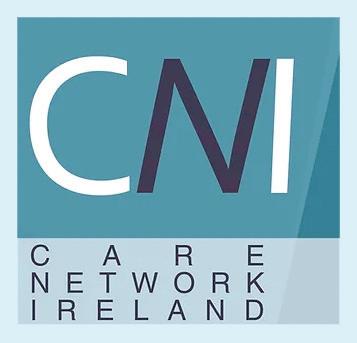
We o er agency hours for both HSE and private hospitals in areas such as acute care, care for the elderly and for those with intellectual disabilities. We also have a range of full-time positions in a broad spectrum of nursing and associated care areas.
We don't just place healthcare professionals in posts, we place them in the right posts.
Therefore, as a member of our team, we will meet with you in order to assess the right job for you.
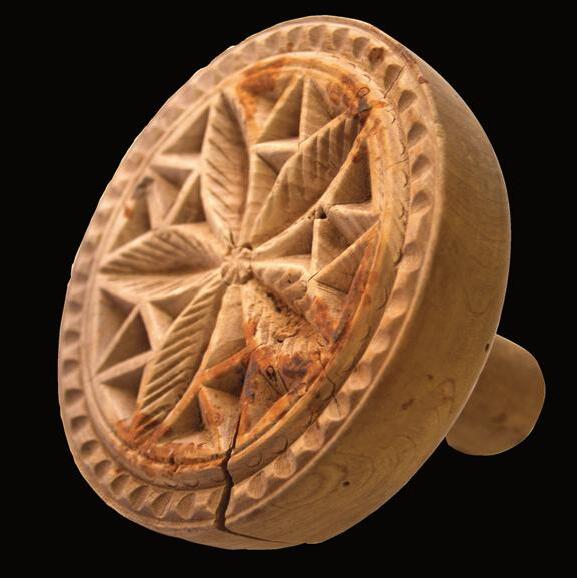
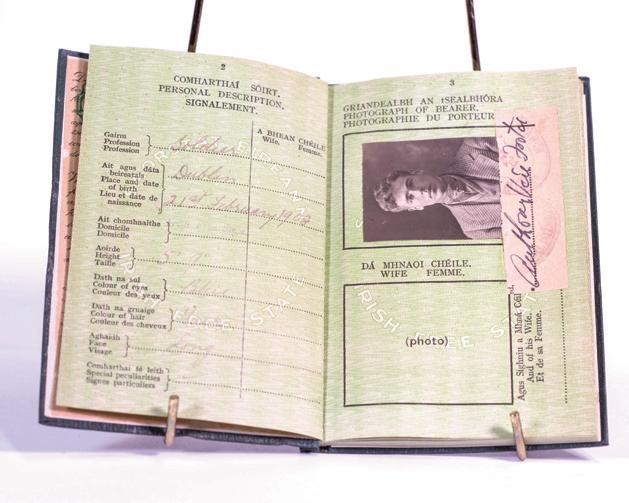
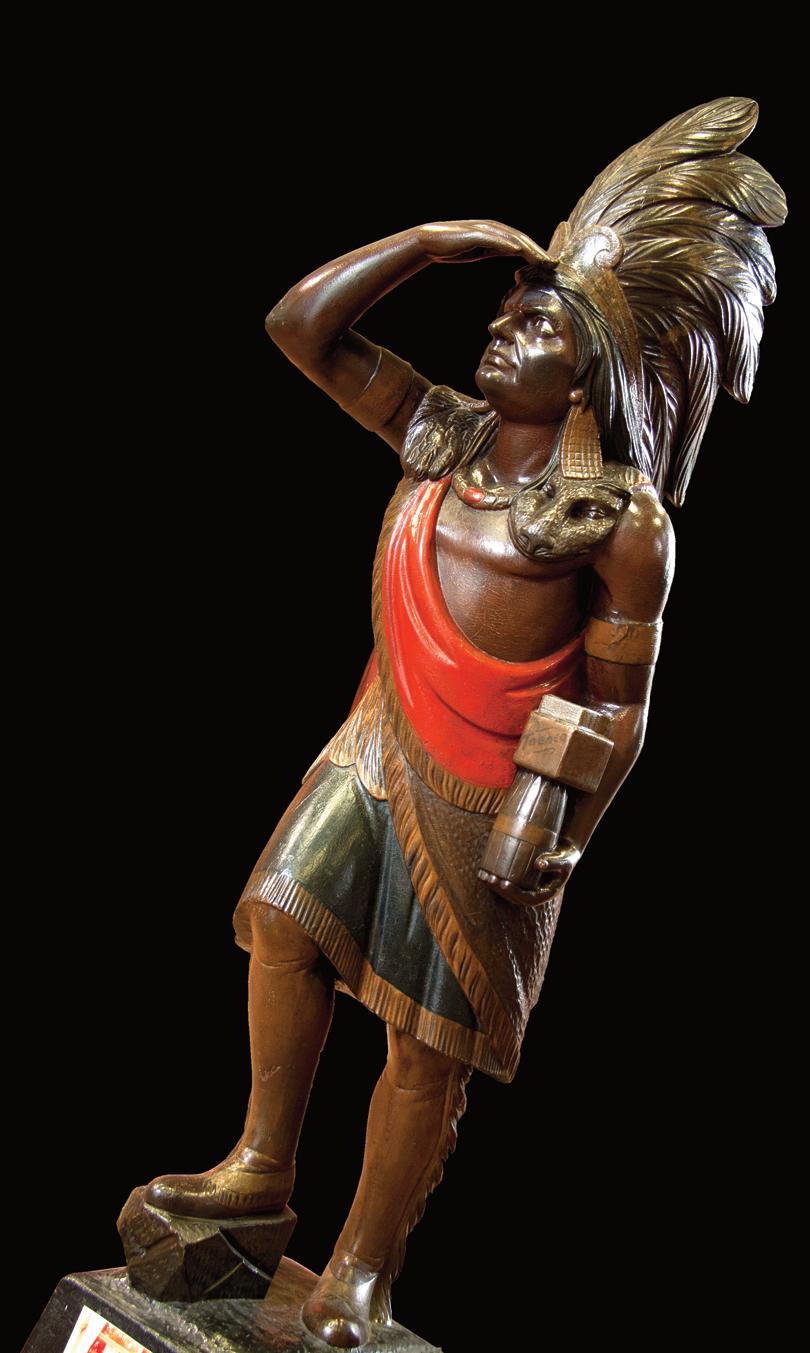
www.carenetworkireland.ie
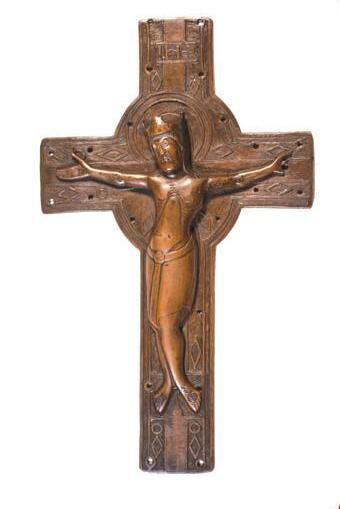
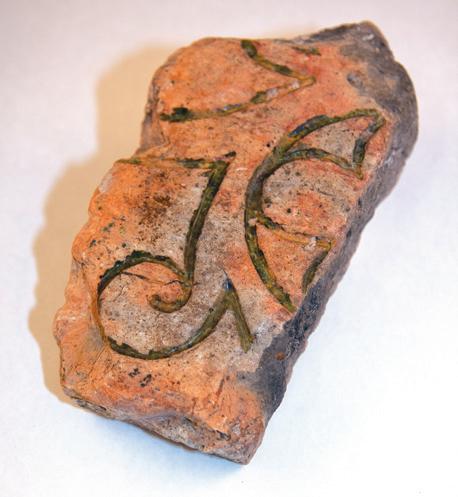
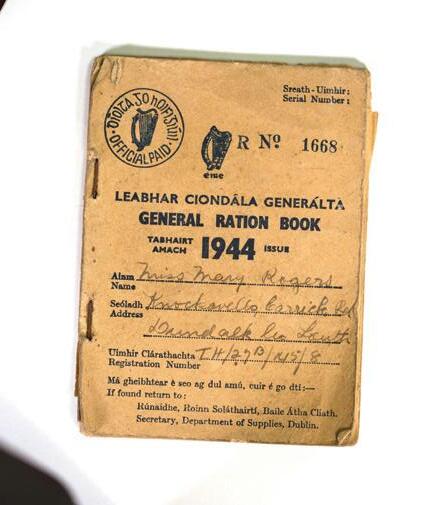
MOTHER and daughter duo, Ånne Hoey and Leah Egan have been telling stories for over 50 years combined.
School teacher and storyteller Ånne has over 40 years of working with children as a primary school teacher. Leah is an award-winning actor, director, narrator and playwright with over a decade of experience in the audiobook, theatre and Film & TV industry.
Together, mother and daughter, they released their first children's book publication, Smokie the Dragon, in 2020. The Irish language edition, An Dragan Lasán, launched June 1st and is currently available in store and online on buythebook.ie.
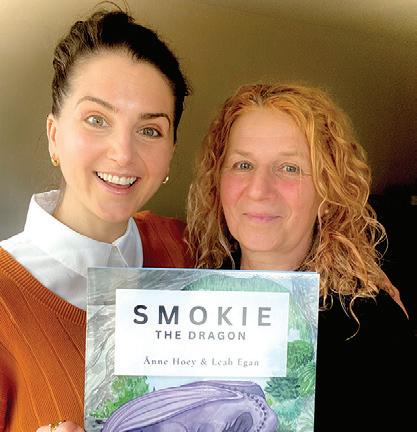
Smokie the Dragon/An Dragan Lasán
“Smokie the Dragon lives a lonely life. Alone in her swamp cave, she wishes for a friend. One day, an unexpected visitor comes her way. Will Smokie be brave enough to embark on a fun and magical adventure through the skies?”
The book is aimed at children aged 3-8 years on the themes of friendship, bravery, fantasy and kindness.
The Irish language edition contains a keyword glossary. Both books include conversation starters and activity pages to enhance learning and keep young minds engaged.
Teachers and school staff are entitled to 10% off all Finicky Heart publications. Simply visit www.buythebook.ie and enter discount code TEACHER10 for 10% off at checkout!
To find out more about Finicky Heart Books you can visit their website at www.finickyheart.com.
A HIGH -Performance Strength and Conditioning Gym has been opened at UCC's Mardyke Arena in July.
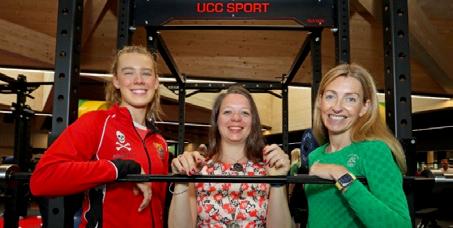
The High-Performance Gym aims to be a centre of excellence, dedicated to empowering athletes and teams to reach their highest potential. Through cutting-edge training, research, innovation, and holistic athlete development, the gym will provide student athletes and teams with the resources they need to excel on the national and international sports arena.
The 420 m2 facility was designed by O’Connell Mahon Architects Cork and built by Summerhill Construction, with the support of UCC Buildings and Estates.
For over 110 years, the Mardyke has been va witness to local, national, and interna-
tional sporting events. Since its official opening in 2001, the Mardyke Arena UCC has established itself as a world-class facility. It is a training home for all types of sportspeople at all ages, including many of Ireland’s elite athletes, thousands of UCC students and staff, and the local community.

SparkED is a youth leadership programme that empowers young people by teaching them valuable life skills.
Our online platform allows the students to access all our workshops and extra resources remotely. Students will be able to complete interactive workshops on our website sparked.ie, in areas such as CV Skills, Presentation Skills, Interview Skills, Time Management and Study skills, Computer/ IT Skills and Volunteering.
Our programme includes:
n Access to all pre-recorded workshops and resources through creation of a personal account
n Access to multiple zoom live workshops throughout the year

n Access to our expanding career guidance section which includes college course guides from college students, career advice, videos from professionals in different careers, Leaving Cert subject guides and ‘how to’ guides
n Interactive segments for the students including feedback on their CV
We hope to give a fresh, student perspective on life after secondary school. SparkED is coordinated by college students volunteering with Enactus UL, which is a social entrepreneurship society based in the Kemmy Business School, University of Limerick.
The programme costs just 5 euro per student. We have also partnered with Uber this year to sponsor DEIS schools to receive our programme free of charge.
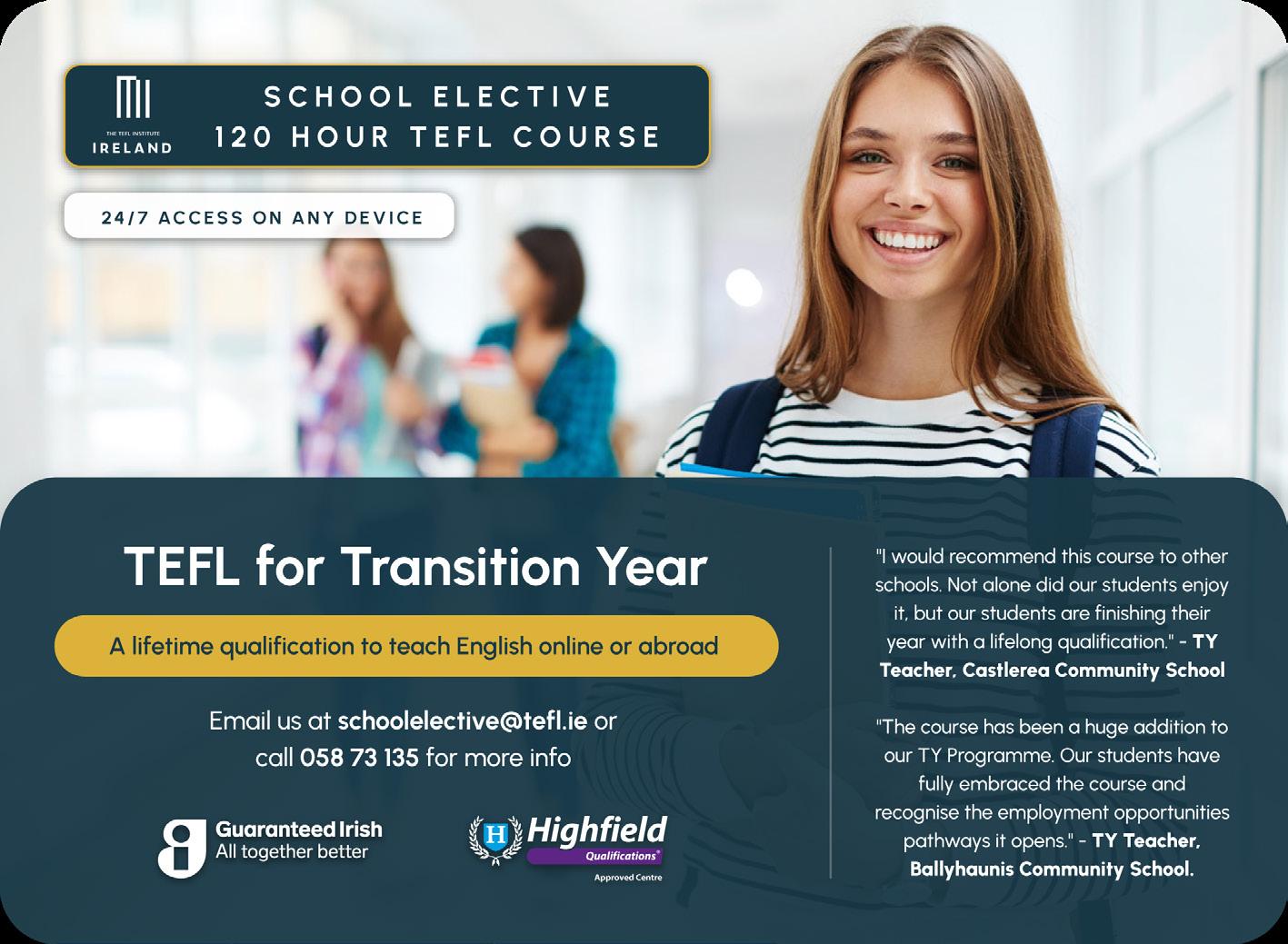
If your school wants to get involved email us at sparkedenactus@gmail.com and check out our website at www.sparked.ie
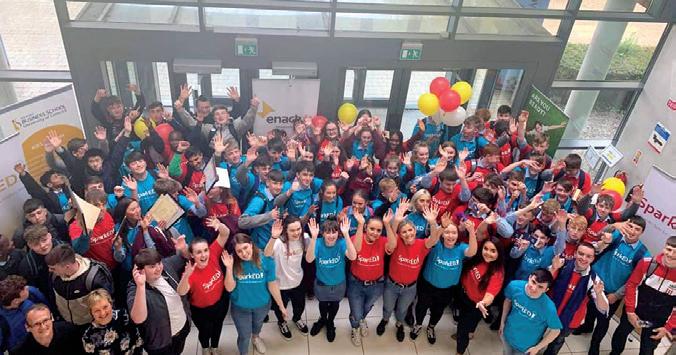
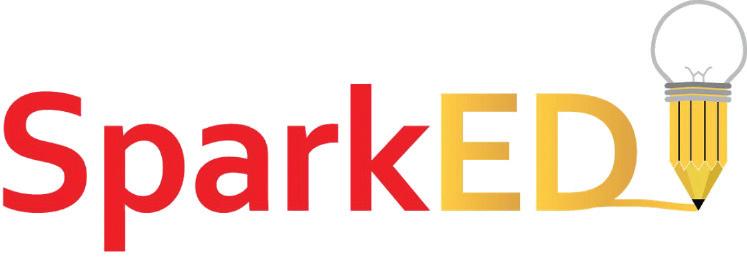


LAW MODULES IRELAND onsite provincial workshops are available throughout Ireland. Our panel members, comprising of legal practitioners (Barristers, Solicitors and Members of An Garda Síochána) attend at your school and conduct the legal workshop, focusing on designated legal topics of interest to students, while unravelling the intricacies of the Irish Legal System.
The interactive Law Day incorporates critical legal thinking, discussions, legal quizzes, legal crossword puzzles and Coco's Law Scenarios. The highlight of the day is the interactive Mock Trial facilitated with the students. The students play the part of the defence and prosecution lawyers, the accused, the witnesses and the Judge and Jury.
The students receive in-depth insight into the Irish Legal System, the court structure and how to become a qualified lawyer, with a focus on laws relatable to their age group (we discuss driving legislation; penalties; insurance and personal Injury claims in Ireland, the role of Gardaí and the DPP, cyber-crime and cyber bullying, plus many more relatable topics).

The focus is on 'bringing the Court Room into the Classroom'. Annually we host a Mock Trial Competition at Limerick Courthouse. All schools involved with LMI are invited to compete. We link in with major Universities and students are invited to attend a Law University Day.
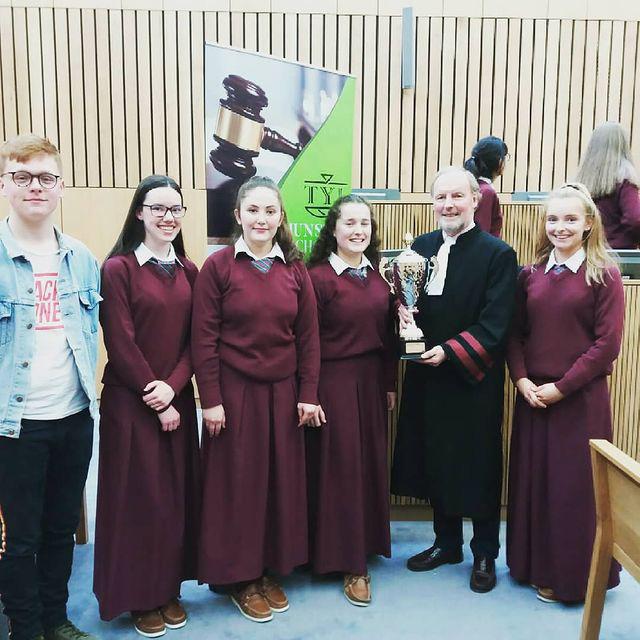
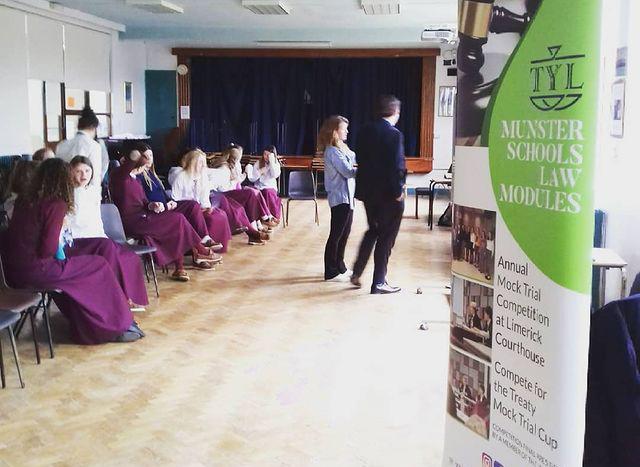
For more information please contact our module co-ordinator Catherine McLoone BL at LMI on 061-275983 / 087-7507776. Our website is: www.lawmodulesireland.ie. We would be delighted to take a booking from you.
B.A. Degree - Courses on offer on the Degree Programme are:
PHILOSOPHY Mindfulness
PSYCHOLOGY Choice Theory
GAEILGE COMHRÁ (conversation)
LOCAL HISTORY
IRISH HISTORY Ireland 19th century, Act of Union to Celtic Revival

EUROPEAN CULTURE History, Literature, Art
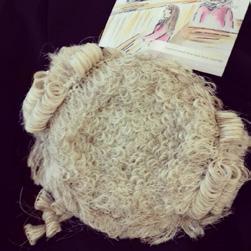
THEATRE and DRAMA Contemporary Theatre in North America .
JAMES JOYCE Ulysses - follow Joyce through all the episodes. HERITAGE STUDIES Manuscripts, Mythology, Ulster Cycle, The Táin. LITRÍOCHT na GAEILGE (Gearrscéalta, Filíocht, Úrscéalta)
POETS/FILÍ T. Kinsella; B. Kennelly; M. Mhac an tSaoi; M. Ó Direáin; Seán Ó Ríordáin.
There are no exams - credits are awarded on Course Work and a Thesis (the topic for research may be chosen by the student). Credits are also awarded on attendance at Summer School and the presentation of course at seminars. There are 10 weeks lectures in the 1st and 10 weeks in the 2nd term. There are 5 weeks in the last term with seminars. The Summer School nishes in May.
Entrance: What is asked of the students is that they are coming to enjoy the course and share their ideas. There is no competition --co-operation and collaboration create an enjoyable learning atmosphere. Student Fee €500 per year. Lecturers and administration give their services free of charge.
Remote Learning: All courses will be on 'zoom' starting in October with some meetings in college (arranging what suits the students)
October 2023.
We are the largest Counselling and Psychotherapy Association in Ireland. The IACP was established in 1981 to identify, develop and maintain professional standards of excellence in Counselling and Psychotherapy

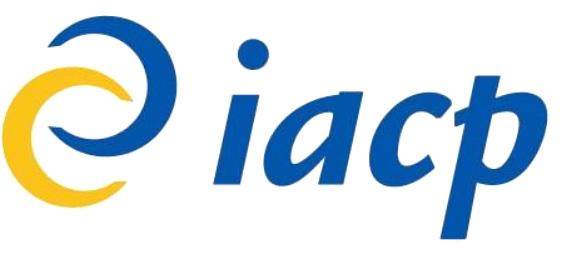
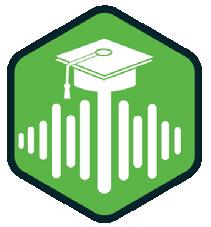
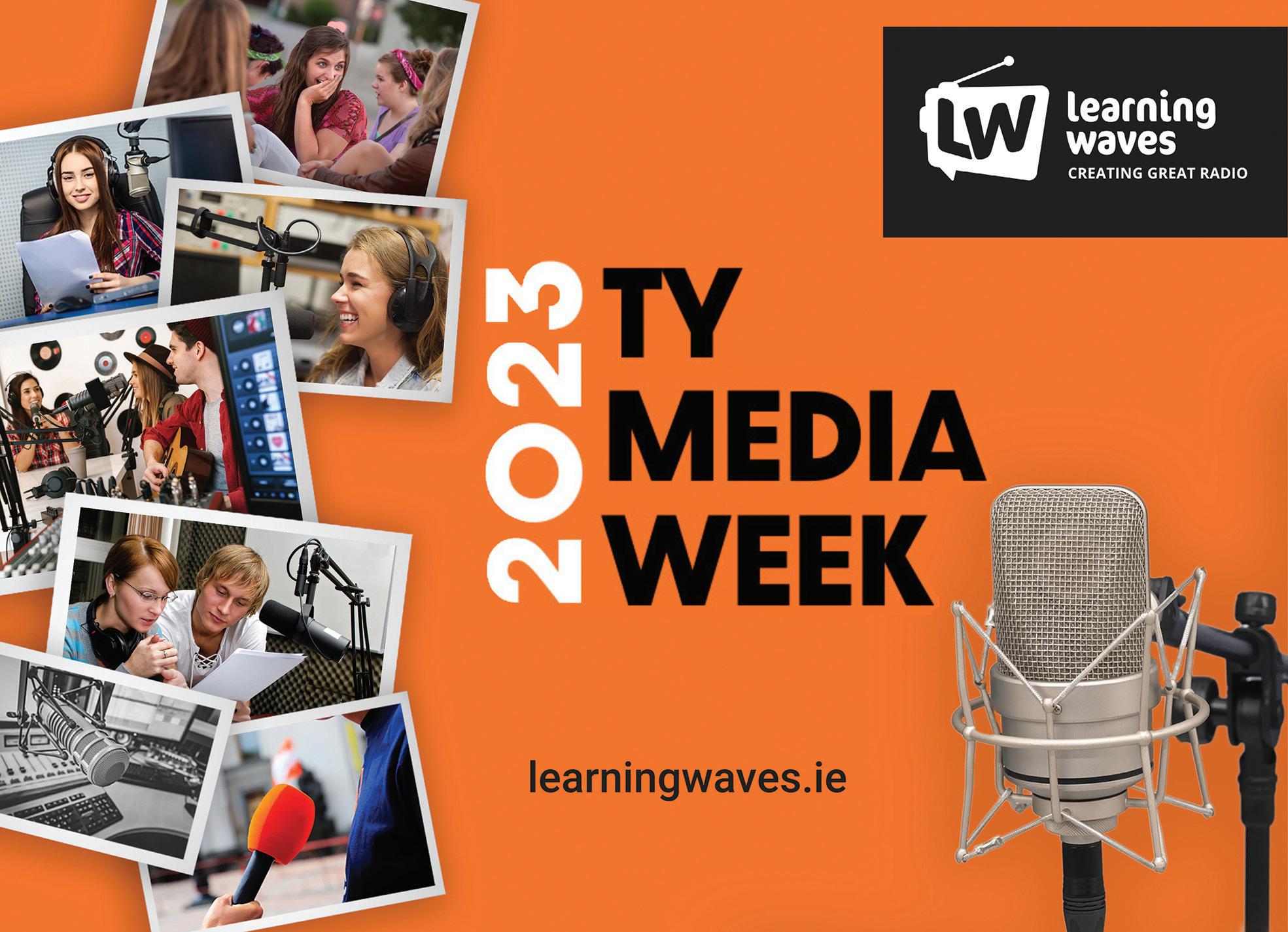
LEARNING Waves, the training body for the Independent Radio Sector in Ireland, offers TY students and graduates a route to the sector in Ireland through its training and content creation initiatives.
The TY Media Week offers students the unique opportunity to research, create and present content that matters to them on one of Ireland’s Independent Radio stations in Ireland.
It is a unique programme where students become immersed in a radio station for a week, where they will be supported by a mentor who will take them through a training programme designed by Learning Waves.
During the week students will get the opportunity to meet their radio heroes, create content that matters to them, have their voice heard on radio, get an insiders view on radio
and create new connections. The content created by the students is broadcast on the radio station in which they complete their TY Media Week.
Students are required to complete an application form in order to take part in the programme. Students are then selected by the station and the programme commences.
In many cases students who have completed this programme have gone on to create podcasts, to present programmes on Christmas schedules in radio stations and many are now studying media in third level colleges.
To apply for the 2023 programme go to : www.learningwaves.ie/tymedia-programme
In addition to offering opportunities for TY students, Learning Waves has developed an internship for Journalism Graduates.
Journalism Graduate Programme
"In 2022, 8 out of the 10 graduates on this programme received full-time employment in the sector on completion of the internship"
This programme offers 10 graduates the opportunity to work in one on Irelands Independent Radio stations for a period of 5 months. This is a paid internship and graduates are supported on the internship by a training programme devised by Learning Waves.
In 2022, 8 out of the 10 graduates on this programme received full-time employment in the sector on completion of the internship. In addition to this graduates, on successful completion of the programme, receive a Diploma in Broadcast Journalism from the London College of Music.
Graduates who have completed the programme have also won awards at the IMRO radio awards for content created during the programme.
Applications for 2023 are now closed for this programme, to apply for the 2024 programme go to: learningwaves.ie






















































































































With over 200 courses from our 7 campuses in and around Cork City and County, we have plenty of opportunities to help you find the pathway to your future career,




























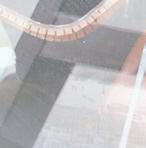

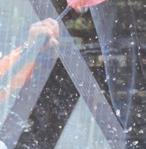
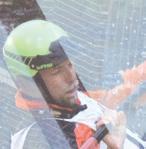



























Ireland has, perhaps uniquely amongst our European Union, a preoccupation with going to college on the completion of post primary schooling. The CAO points race, the “league table”, the conversation amongst parents at a GAA match, Feis or other event more often than not comes back to what college course sons and daughters aspire to, and the points required for entry.




One has to ask is this healthy, indeed if it is fundamentally flawed. Does every 17 or 18-year-old know exactly what career they want to embark on, what if despite their best efforts they fail to achieve the required points? What if they are not ready for college, or if financial circumstances don’t support a college degree, or what if they want to start work after finishing school? And bearing in mind that the current generation will have several careers before they reach retirement age, are there other options that allow




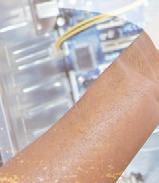





























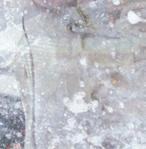
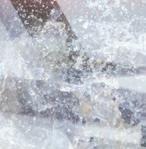
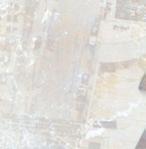

























•No CAO points needed

•Level 5 & 6 Qualifications

•SUSI, Vocational Training Opportunities Scheme, Back to Education Allowance







•Crèches


•Excellent progression opportunities
a young (and not so young) person explore careers and opportunities outside the CAO/College system?




Thankfully, there are real, viable alternatives. Further Education and Training (FET) programmes, delivered nationwide by the Education and Training Boards, provide a range of options for people wishing to progress their education towards employment, or to enter into paid training for employment.
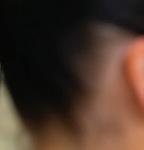
Funded by SOLAS, the further education and training agency, Irelands apprenticeship system has been reinvigorated, with an expanded range of options available for young people. While the “traditional” craft apprenticeships remain strong (for construction related roles as electricians, plumbers, instrumentation technicians, etc.) they have been joined by a range of new apprenticeships in fields as diverse as Property Services, Accounting Technician, Chef, Insurance, Cyber Security to name but a few of these new “earn and learn” options. All lead to a recognised qualification and
involves both on and off the job learning opportunities.
Level 5 and 6 Post Leaving Cert courses provide another valuable avenue to further study and employment. The range of courses (generally of 1- or two-years duration) is diverse, ranging from Furniture Design to Veterinary Nursing, from Childcare to Laboratory Science. For a school leaver who maybe is unsure of their preferred career path, or who did not gain the points required for college entry, these courses allow them to gain a qualification that provides opportunities to progress to employment or enter college. Many of these level 5 and 6 courses have direct links into Higher Education programmes, both in Ireland and abroad, and the experience of many students who have studied at these levels before going on to college is that the intermediate step of the FET course has made the transition to college life and study easier. FET courses generally have smaller numbers, ensuring better support, and eligible learners may avail of SUSI grant funding.
•Alternate pathway to Higher Education

•Extensive range of courses
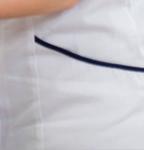







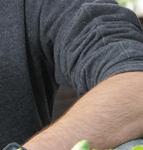




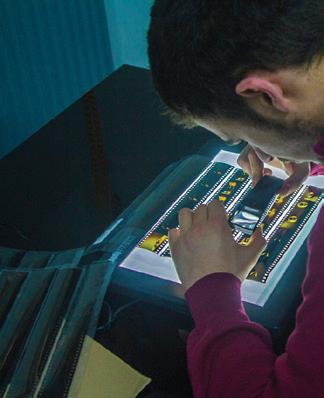
•Excellent campus facilities
•Courses linked to employment






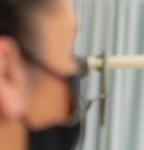

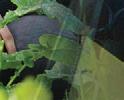










Students in Cork are probably better catered for with alternatives than anywhere else in the country. Cork ETB, through its Cork College of FET Campuses delivers a wide range of courses that can cater for almost any ambition. Details are available at www.corketb.ie/fet, or on www.fetchcourses.ie, and applications will be open until the middle of September.
So, if you are unsure about going to third-level, or if you wanted to go but didn’t get the points required, there is no need to panic. There are other options. No one option is intrinsically better than another; each student has to choose what is right for them. Cork Education and Training Board prides itself on providing a “Pathway for every learner”; take the next step, and identify the first step on that pathway that is right for you.
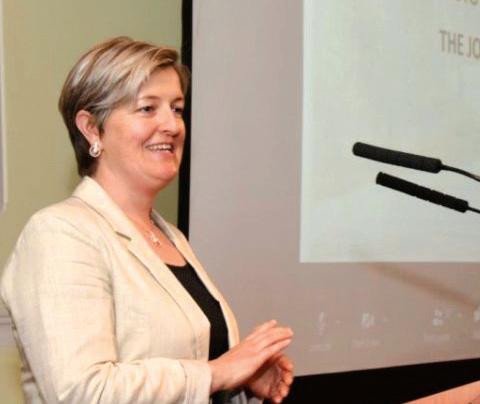

WATCHING television is probably not what guidance counsellors advise their charges to spend their time on but for Ireland's Chief State Pathologist, Dr Linda Mulligan, TV detectives were an inspiration for a career based on curiosity and discovery.
in St. James’s Hospital, Tallaght University Hospital and St. Vincent’s Hospital among others.
Dr Mulligan speaking at the Faculty of Pathology Annual Symposium, Royal College of Physicians of Ireland (above) and at work in the lab during Covid.
"I didn't realise forensics pathology was really a career until I was sixteen and seventeen," she says. "I used to watch Cracker and Taggart, and I was into the X-Files. I was interested in the investigation side of things. I discovered forensic pathology was a real career and I ended up asking my career guidance teacher about it and she advised me to try nursing or teaching!"
"So I said 'I really want to do this' and she sent me off to UCD. I ended up talking to one of the medical students there and that’s how I found out about pathology, blood sciences, laboratories and all of that."

She thanks honours maths for helping her get the points for UCD but she also studied both biology and chemistry in the Leaving Cert. She spent six years studying medicine in UCD followed by two years in Australia working in hospitals as a clinical doctor.
After returning from Australia, Linda trained as a histopathologist on the South Dublin Scheme, working
"Histopathologists are the doctors who look at the cells and the tissues of the body to diagnose cancers and other diseases. As part of that, if someone dies in the hospital, they’ll do an autopsy, which is aimed at finding the cause of death. I was always interested in that side of things - not a lot of pathologists like autopsy - but for me it was a giant puzzle and I was fascinated by it."
On completion of her histopathology training, Dr. Mulligan wanted to train as a forensic pathologist. "The Office of the State Pathologist decided to start a new position of Deputy State Pathologist where they would take on a histopathologist and then train them up in forensics over a two year period. And that’s what I was… a guinea pig!"
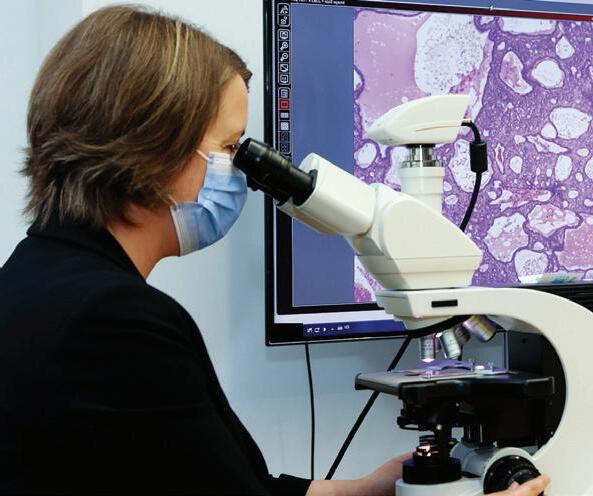
The Office is part of the Department of Justice and is an integral part of many of the highest profile garda investigations and criminal trials. Having a background in science is one thing and dealing with the law is another. I asked Linda how she had felt about the courts, trials and the prospect of being cross-examined by barristers.
"Terrified," she says with a laugh. "Yes, that is probably the most intimidating part of the job. The barristers are very good, with experts in every topic. Our evidence is based on the facts of the autopsy and what we have found. We are expert witnesses and always have to have evidence to support our interpretation of the findings.
"So what I did to address my fears was to go to court as often as I could with other pathologists and watched them giving evidence. On top of that I also did an expert witness training course which helped to develop skills for cross examination"

The State Pathologists' Office forms part of network when it comes to major investigations which includes working with the gardaí, legal teams, coroners, Forensic Science Ireland and the courts. For Dr Mulligan this is one of the most rewarding aspects of the job.
"It’s a team role, our contribution is around the cause of death and interpretation of any injuries. It forms part of the larger picture, where scene-of-crime investigators are recording the scene; the gardaí are carrying out their investigations. We are just one cog in a larger machine."
A more difficult part of the role is dealing with the families of people killed in different circumstances. In the bigger investigations there is no contact between the Office and families - this takes place at inquests run by coroners. Linda also finds this a rewarding part of the job in that they are able to answer questions people may have about the deaths of their loved ones and to help bring about closure.
On her journey to the Chief Pathologist's office Linda has experienced changing attitudes to women in science and professional careers. She thinks that science was an early option for many women and in her course at UCD the gender balance was around 50:50. At the moment all six of the forensic pathologists in the Office are women.
"Gender equality to me is the right person for the job. If you have the skillset you should get the job," she says. "But it does seem that science and women are a good match"
Teaching forensic pathology
Her role, and that of the Office, also has an education side to it. Last year Dr Mulligan was made a Clinical Professor in UCD School of Medicine where she lectures.
"We lecture for the Royal College of Surgeons, Trinity College, UCD, Galway and Dr. Bolster covers Cork University Medical School."
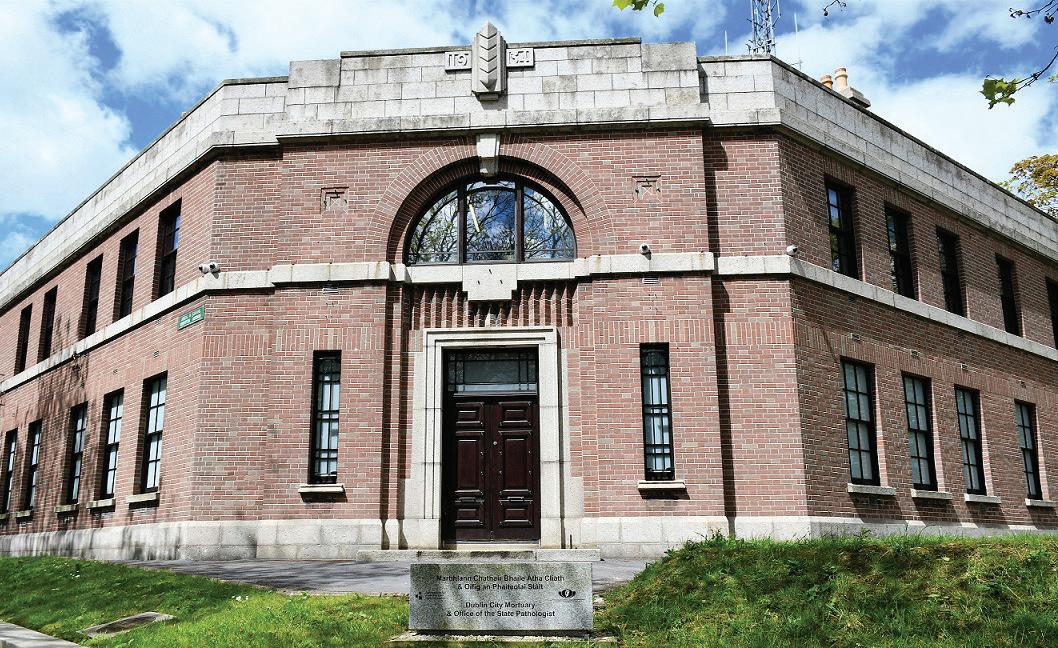
In addition to teaching on courses for the Gardaí and Military Police, the office also promotes science in transition year programmes and in secondary schools.
As well as all that Linda has the office to run. During 2021, 327 cases were dealt with by the Office (this figure was 345 in 2020, 335 in 2019, 286 in 2018 and 261 in 2017). About one in six of these cases involve attending the scene of the incident. Part of the work can involve skeletonised remains sometimes from many years ago requiring forensic anthropology skills.
The Office provides an on-call service 7 days per week, 365 days a year. There is always a forensic pathologist on duty.
 The headquarters of the Office of State Pathologist (OSP) in Whitehall in Dublin. The OSP provides the State with a national forensic pathology service where a forensic pathologist is on duty, twenty-four hours a day, each day of the year. An on-call rota is provided to An Garda Síochána and to all Coroners on a continual basis.
The headquarters of the Office of State Pathologist (OSP) in Whitehall in Dublin. The OSP provides the State with a national forensic pathology service where a forensic pathologist is on duty, twenty-four hours a day, each day of the year. An on-call rota is provided to An Garda Síochána and to all Coroners on a continual basis.

NESTLED in the Derryveagh Mountains and on the shores of Gartan Lough, Co Donegal, Gartan Outdoor Education and Training Centre has been engaging Young People in the Outdoors since 1988.
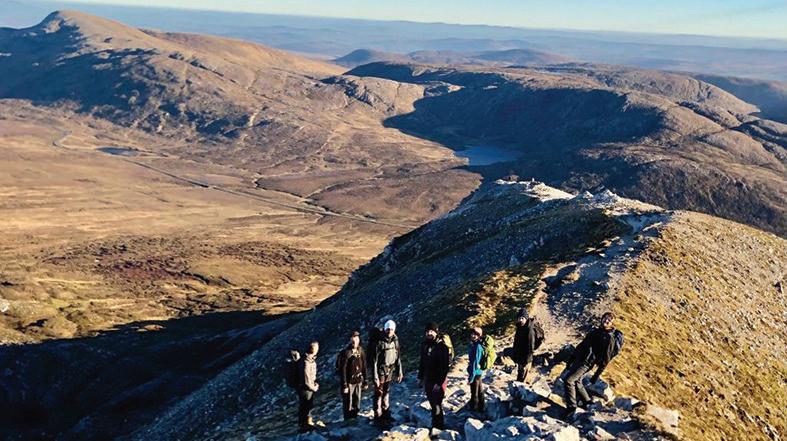
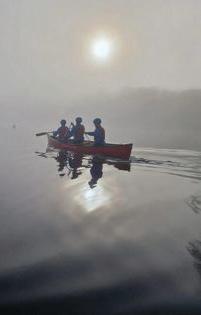
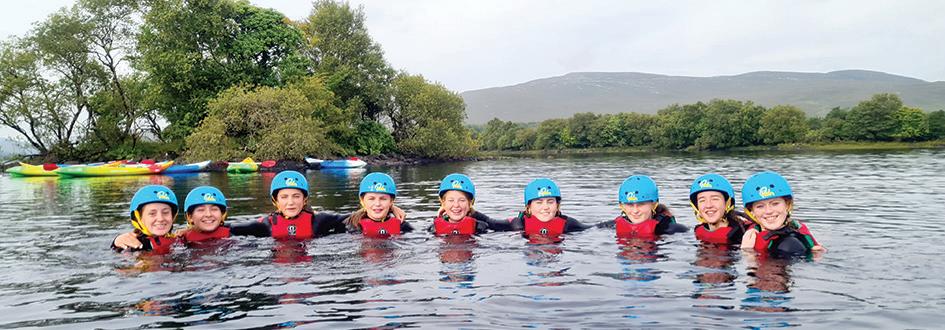
Whether your group is residential or a day visit, our aim is to provide positive shared and personal experiences for every Young Person and Educator that visits us.
We provide a wide range of water and land based Adventure Sports that provide the means for developing inter and intra personal skills. Our Outdoor Team have years of post qualification experience delivering learning through Adventure Sports, whilst our Catering and Accomodation Team ensure you are well fed and comfortable during your stay.
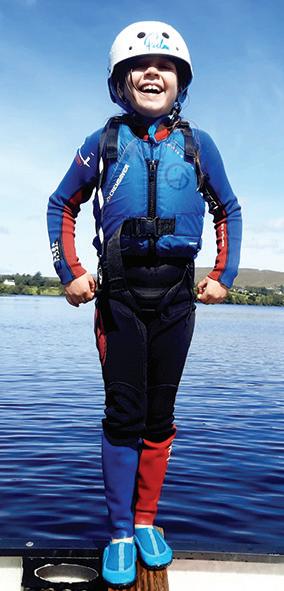
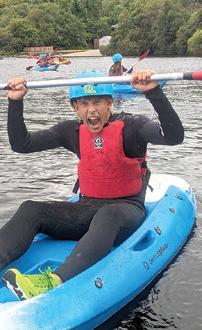
Get in touch to discuss your needs and we will design a programme that supports your intended learning outcomes.
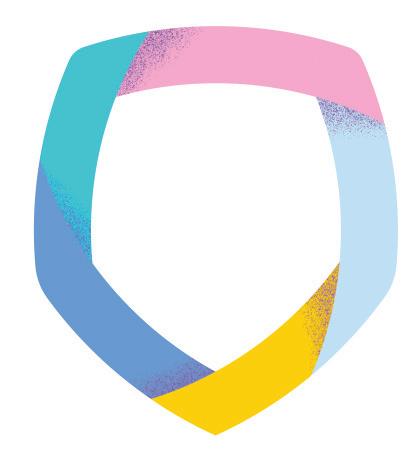
Gartan Outdoor Education & Training Centre
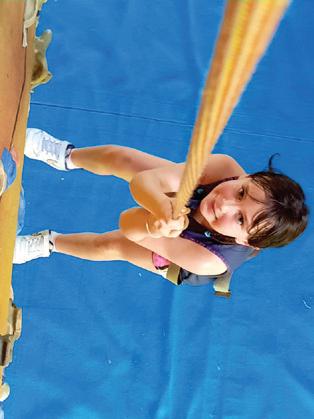
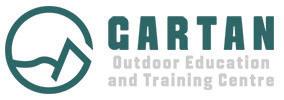
Churchill, Co. Donegal. F92 T853
T: +353 (0) 74 913 7032
E: gartanoffice@donegaletb.ie
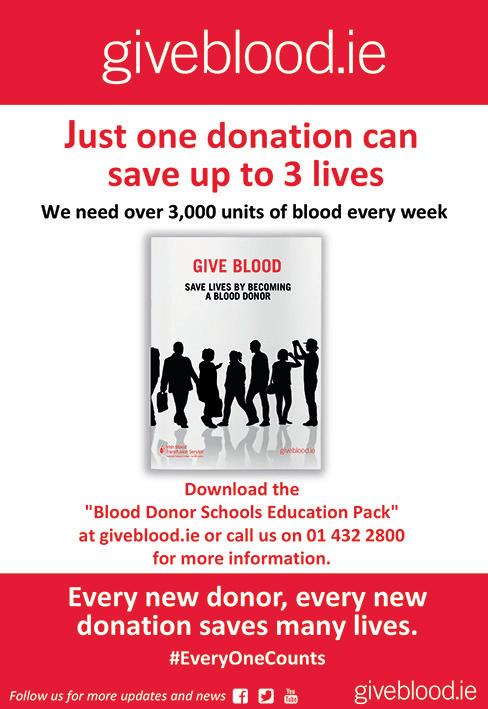
www.gartan.com
The ISPCC Shield Programme provides a range of resources, giving children and young people the necessary coping skills to deal with and protect themselves from bullying. Discover


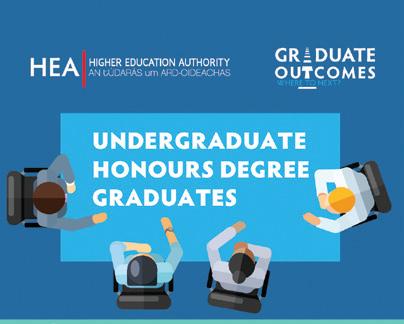
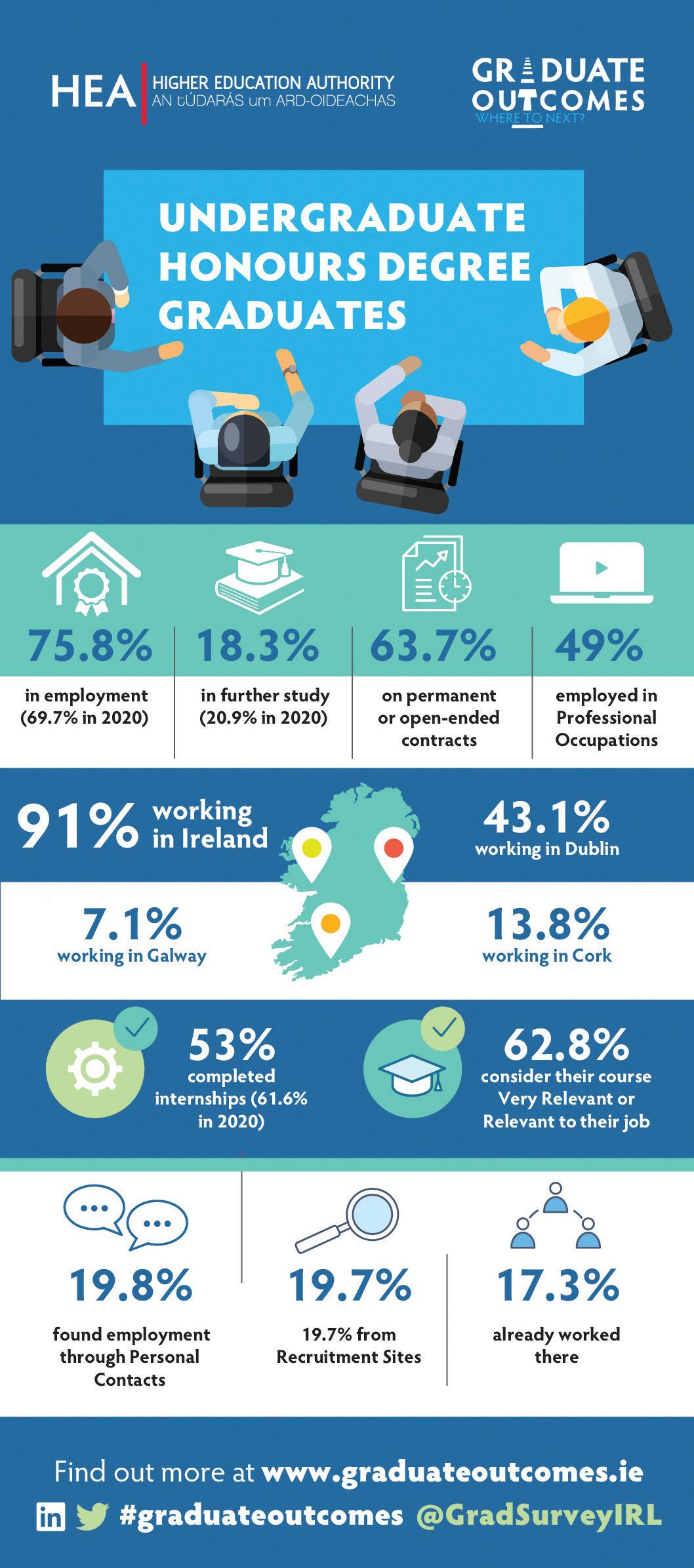
9 months after graduation
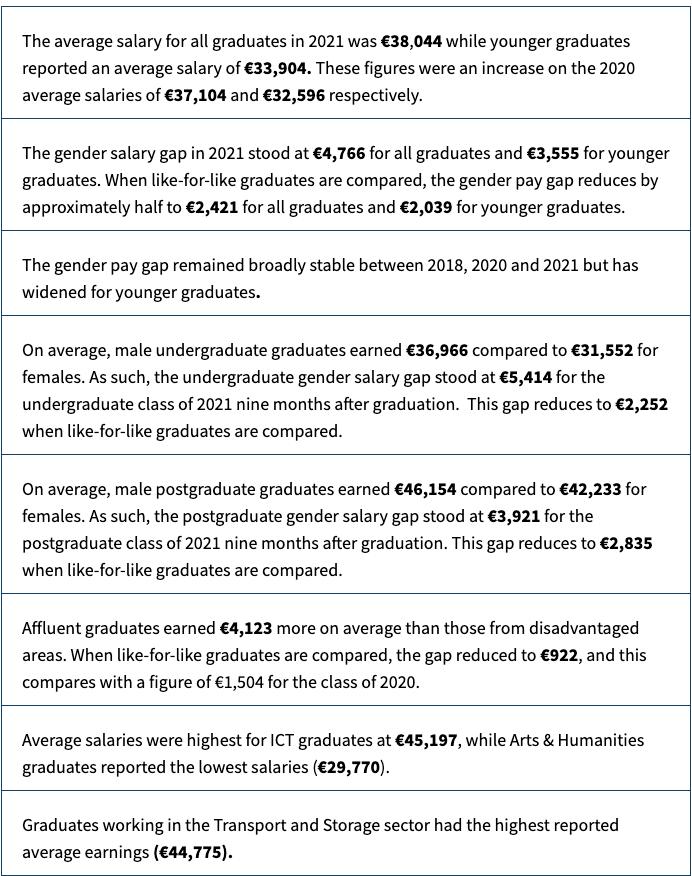
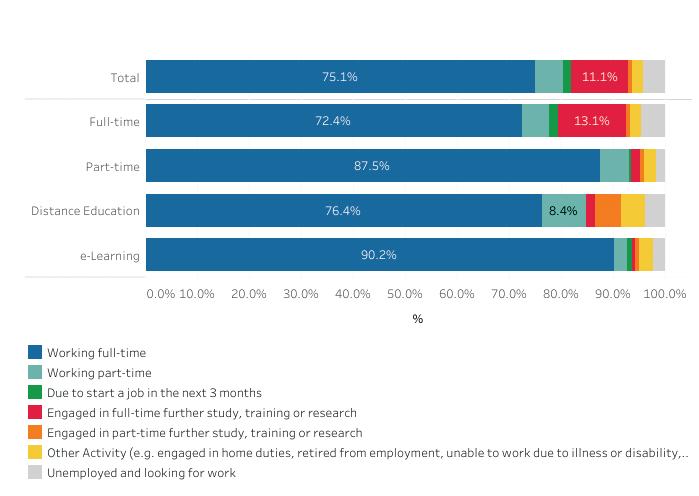
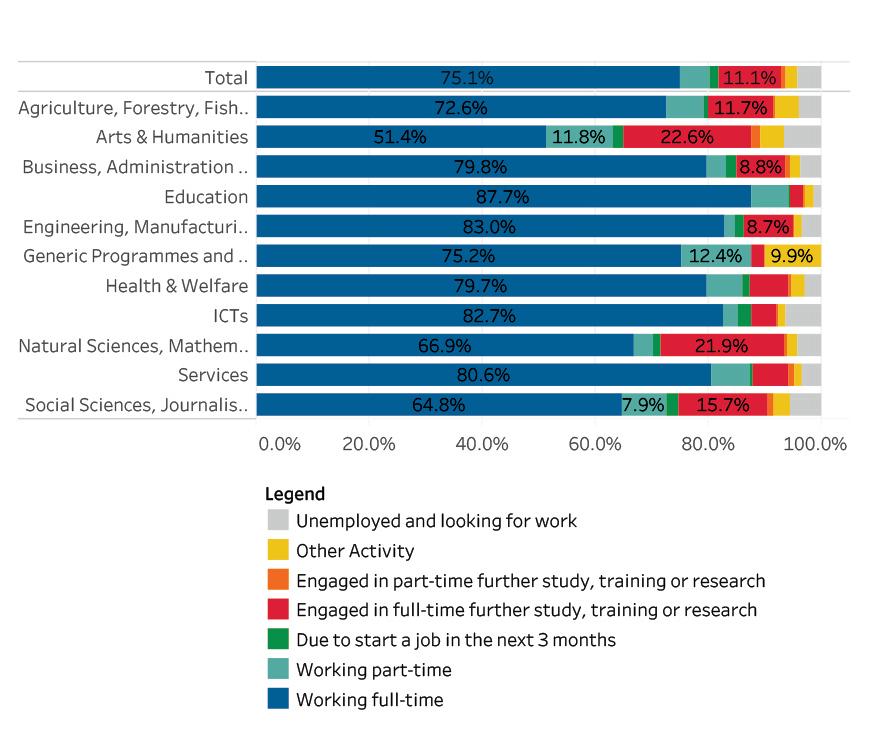

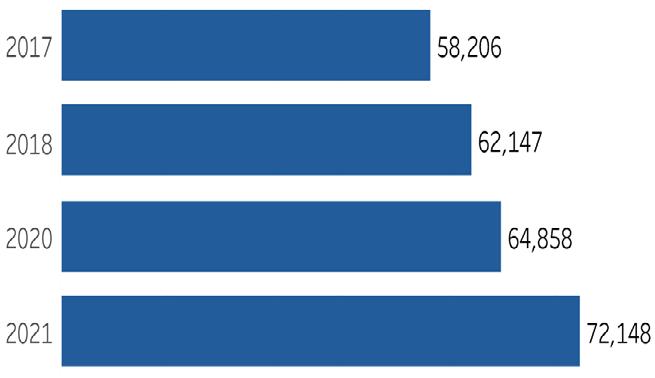
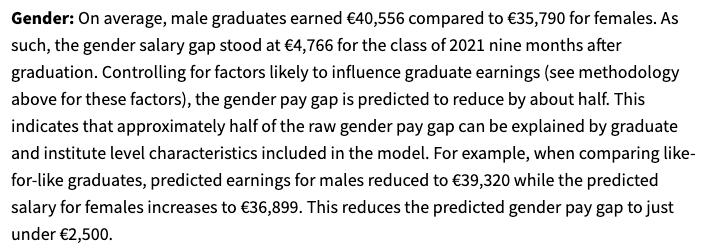
INSPIRE your class this term with a unique and memorable school trip. Step outside of the classroom and into the places where history really happened, on a visit to one of the Office of Public Work's historical sites.

With over 70 OPW heritage sites, dating from the Stone Age to the War of Independence, you can bring your students to where history happened. Visits, including admission and guided tours at OPW Heritage Ireland sites are FREE for primary and post primary schools in Ireland and many of our sites are open year round. All school visits must be booked in advance and make sure you check out heritageireland.ie for terms and conditions, booking forms and resources
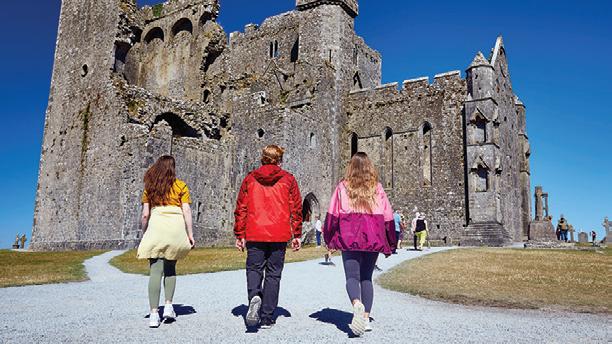
Our expert curators, historians, librarians, guides, gardeners, botanists and conservators have pulled together their top ideas for memorable learning experiences which are perfect for studying a range of topics across the key stages.
History, Geography, Art, Maths, Science, Irish, Music, Politics and Citizenship.
A visit to any OPW Heritage Site is an incredibly valuable opportunity to learn, outside of the classroom, encouraging their enquiry skills, fuels their imaginations and helps them
feel a sense of self in a wider context.
But with 5,000 thousands years to cover, it can be hard to know where to start. We have gathered together sites under themes.
Events, exhibitions
Our cultural programming is second to none. We have an outstanding schedule of events, including wideranging exhibitions of art and history, performances by world-class theatre companies and musicians of various genres, and special tours of our amazing locations.
What We Do
OPW Heritage Ireland – caring for the nation’s past.

The Office of Public Works provide high-quality and authentic interpretative experiences at our heritage sites.
We develop and apply best practice approaches and standards to the
sustainable promotion, protection, and management of the heritage estate.
We look after and promote various important collections of art and artefacts. We are privileged with the care of many noteworthy examples of artistic and cultural production from Ireland and around the world – from the seventeenth-century canopies of state in Dublin Castle to the editioned Picasso ceramics at Glebe Gallery in County Donegal.
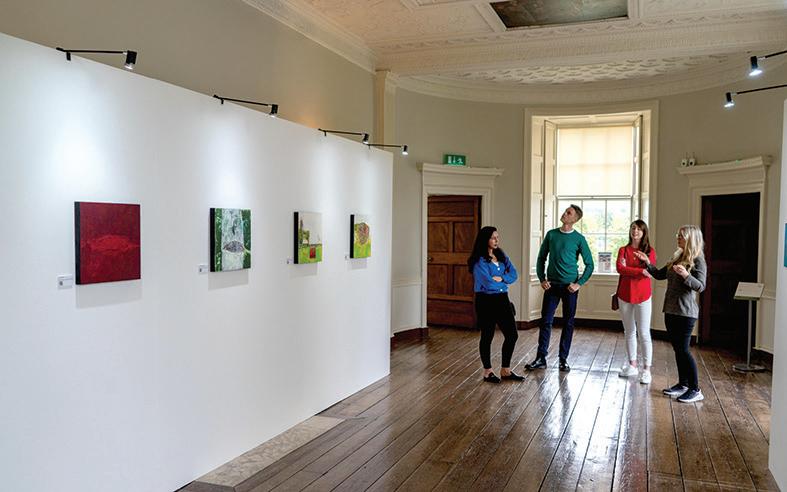
We are responsible for Ireland’s most important heritage sites. Iconic sites ranging from the Rock of Cashel in Tipperary to Skellig Michael on a small island off the Kerry coast, are just some of the stunning 780 heritage sites in our care.
Our team of dedicated experts look after the buildings, landscapes and collections entrusted to us and make them available to over 12 million visitors each year to learn from
Browse our wide range of learning resources and materials. Our resources have been designed to meet the needs of the curriculum and are ideal for supporting learning in the classroom and at our sites. Find out more on heritageireland.ie.
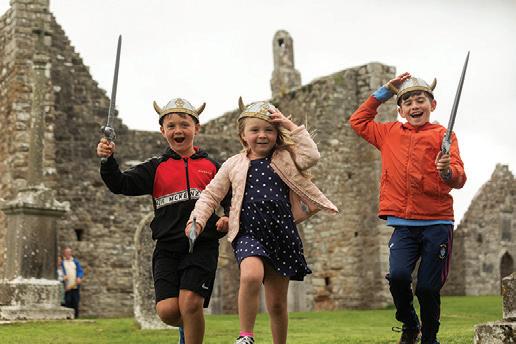
■ Outdoor Classroom at Glebe House and Gallery, Co. Donegal
■ Dedicated Biodiversity Centre at Phoexix Park, Dublin
■ Primary and secodary level work sheets are available at all sites - enquire directly with the site.
and enjoy. Every day we work to make Ireland proud of the fabric of its history.
We undertake vital scientific work, especially in the area of plant conservation. At the National Botanic Gardens, for example, we have a DNA research lab and an internationally significant collection of plants.
We collaborate with the UNESCO World Heritage Centre to look after Ireland’s two World Heritage Sites, Brú na Bóinne and Skellig Michael. Our highly skilled staff work hard to make the global public aware of the extraordinary cultural and historical value of these places and to keep them safe for future generations.
We work closely with our local communities. In fact, we depend on people in all parts of Ireland to help protect their local historic places and present them to visitors.
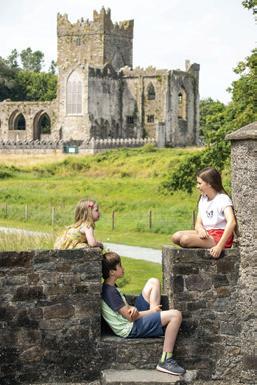

We produce top-quality publications to add to your heritage knowledge base. Our Heritage E-zine is available on heritageireland.ie with many interesting articles.
A visit to an OPW site for TY students, provides an insight into many career opportunities in the Office of Public Works gov.ie - Jobs at the OPW (www.gov.ie)
Find out more about a range of accessibility supports at our sites on heritageireland.ie.
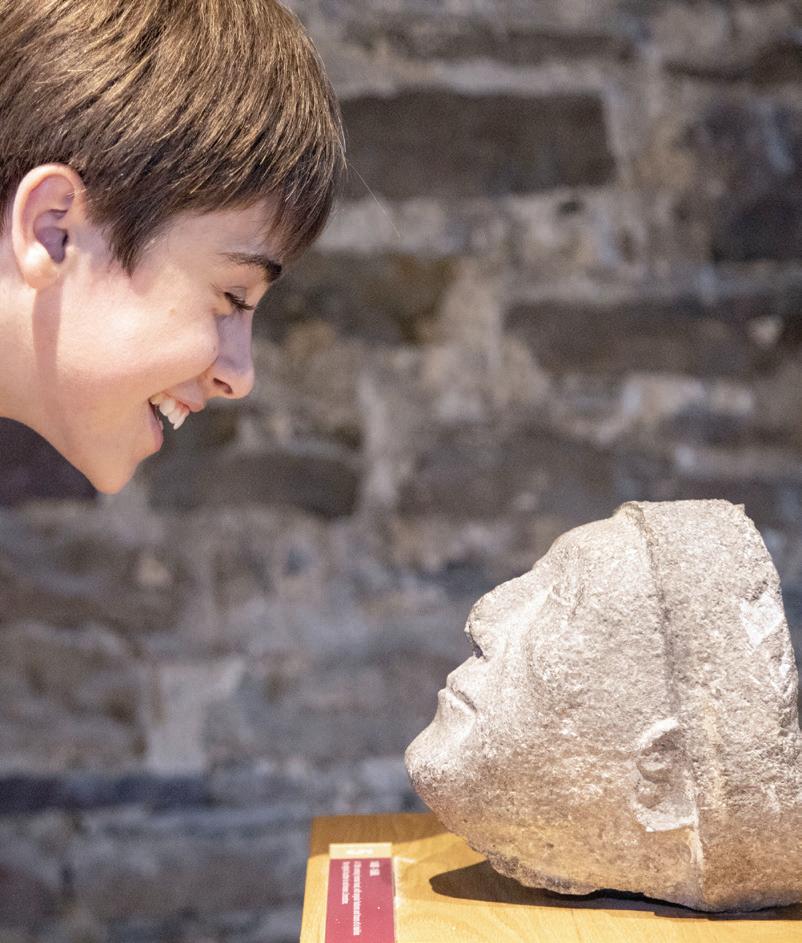
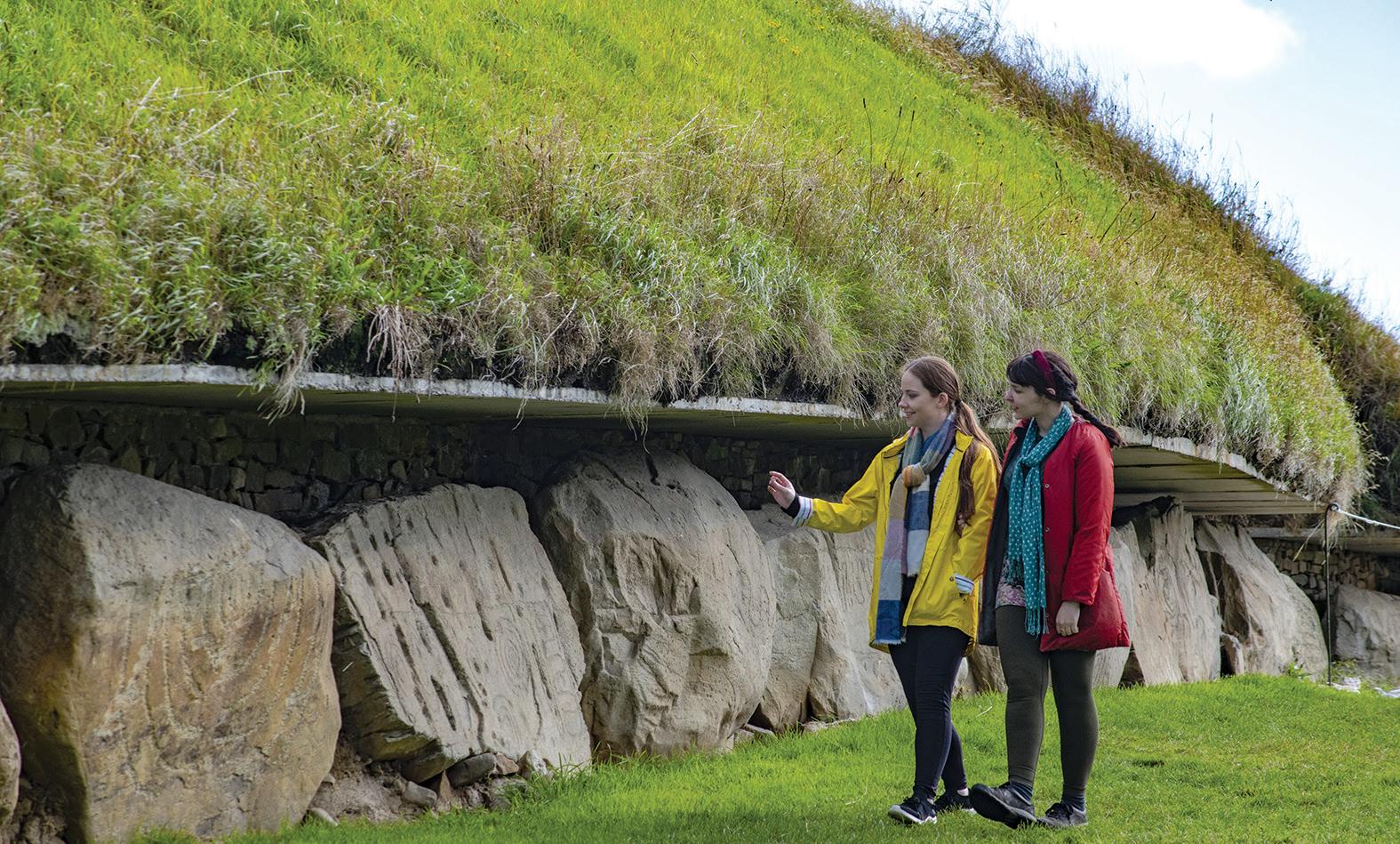
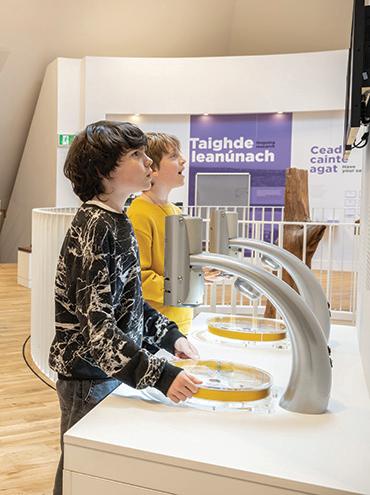
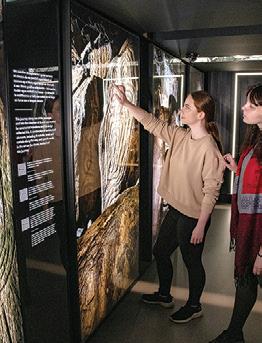
BODY image is a key aspect of youth mental health. Unfortunately research in Ireland indicates that many young people are dissatisfied with how they look (Dooley et al., 2019)*
This is concerning as negative body image is linked to higher levels of depression, anxiety, eating disorders and to substance and alcohol misuse, self harm and suicide. A recent report (Ombudsman for Children, 2023)** indicated that 65% of young people indicated body image concerns made them feel depressed or anxious.
It is vital that we support young people in developing positive body image and self esteem. Research in Ireland and internationally indicates that body image concerns are starting earlier than before and emphasises the importance of addressing risk factors at an earlier stage.
Bodywhys have a range of supports for teachers including teacher training, resources to use in the classroom and other support options.
The Bodywhys resources are evidence informed and have been developed through a multi-stage process involving consultation with educators, mental health professionals and young people.
Given the unique pressures to body image experienced by young people, Bodywhys prioritise youth engagement. In line with WHO Europe (2022)*** guidelines, Bodywhys ‘listen to and understand the perspectives, experiences and needs of young people in’ in developing resources which affect them.
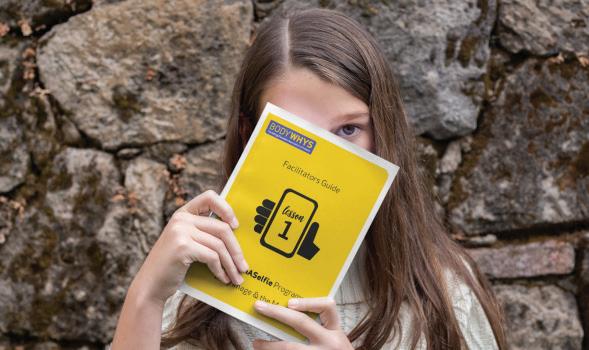
Bodywhys will be offering schools nationwide an opportunity to participate in Bodywhys body image research in 2023/2024. This is a unique opportunity for your students to have a voice on matters which affect them.
Participating schools will receive the following: Bodywhys Training, Bodywhys workshops to promote positive body image and awareness of eating disorders to First Year, Second Year and TY groups. Participating schools will also be supported to complete the ‘Be Body Positive’ Flag Initiative and the ‘Be Body Positive’ Flag for display outside their school.
To find out more about what’s involved in the Bodywhys Research 2023/2024 please contact info@ bodywhys.ie for more information.
Bodywhys offer training webinars throughout the school year to provide teachers, school staff and youth workers with an understanding of eating disorders and body image issues to support them in early recognition of an eating disorder or body image concerns in a student

and the correct pathways to follow should a concern arise.
The evidence informed #MoreThanASelfie programme includes four lessons with accompanying student workbooks and facilitators guides. This programme was designed in collaboration with young people and teachers to promote media and social media literacy, positive body image and to foster a peer supportive environment to promote and maintain positive body image and self-esteem.
The #MoreThanASelfie programme was funded by the Irish Research Council and conducted in collaboration with the Centre for Mental Health and Community Research in Maynooth University.
This programme was piloted in three secondary schools, selected based on location, gender and school type, The results from the pilot phase are a positive endorsement of the programme.
The vast majority of participants indicated that the lessons were good for their class (91.4%) and that they would like a younger sibling or friend to receive these lessons (87.9%). The results also indicate some positive changes in relation to body image and attitudes to appearance in students who received the programme, lessening the impact of the muscular ideal for males and a lessening of perceived appearance-related pressure for females.
Some positive changes were also noted in relation to social media behaviours.
"Bodywhys have a range of supports for teachers including teacher training, evidence informed resources to use in the classroom and other support options. The Bodywhys resources are evidence informed and have been developed through a multi-stage process"
The ‘Be Body Positive’ Flag initiative aims to encourage schools, youth groups, colleges, clubs and organisations to actively promote positive body image in children and young people. It is intended to enhance and reward positive action taken in relation to promoting positive body image. Please see visit us online at www.bodywhysbodyimage.ie for more information.
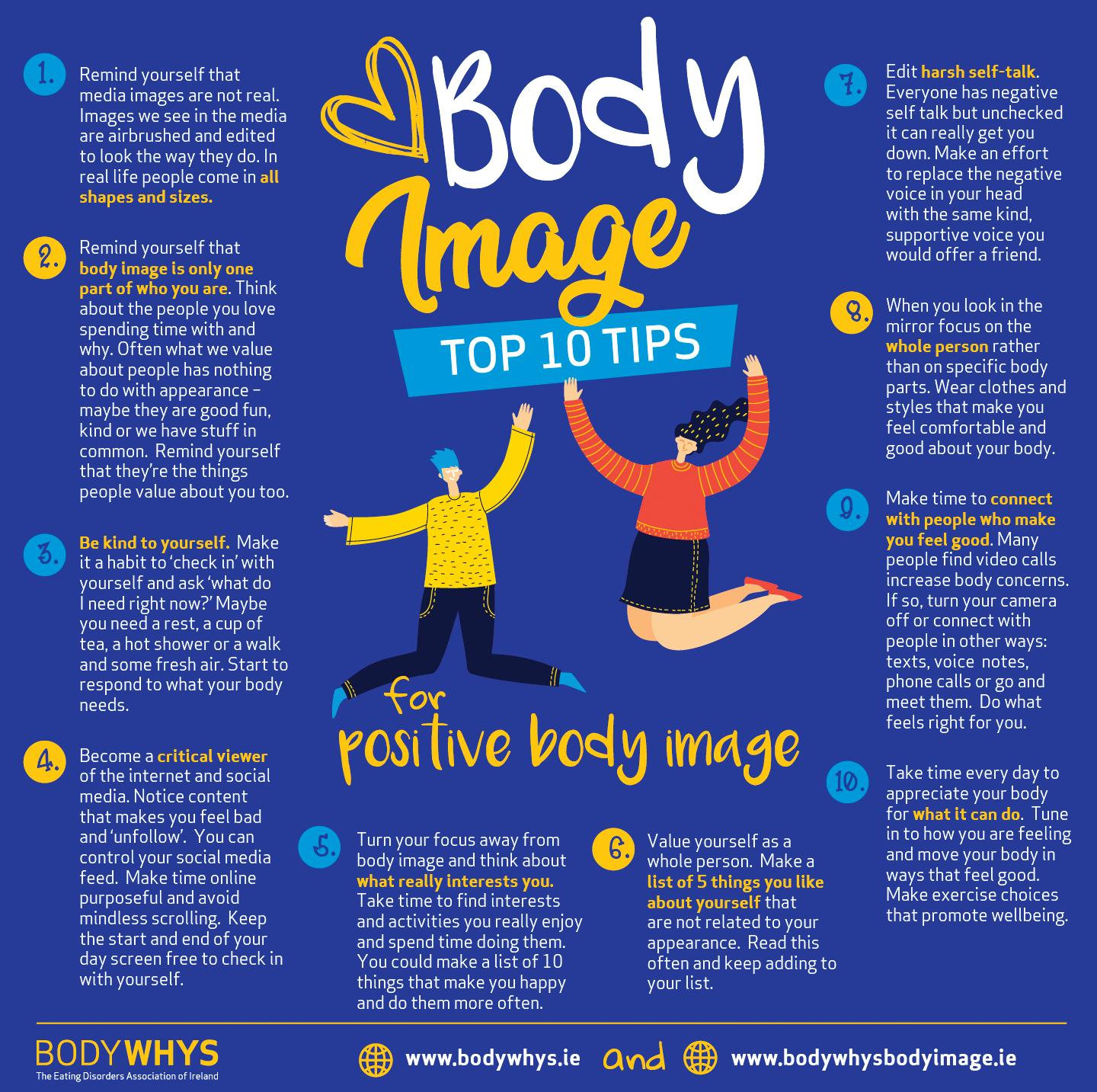
Bodywhys provide ‘Be Body Positive’ talk or workshop for stu-
dents at second level to promote awareness of eating disorders and to promote positive body image, media and social media literacy.
The ‘Be Body Positive’ talk/workshops (around 70-80 minutes duration) are delivered to class groups.
This talk/workshop is intended to promote awareness of eating disorders and the supports available and also to promote positive body image through discussion of current influences to body image such as media, peers and social media and provide ‘youth advice on challenging body image pressures’ and fostering a positive body image.

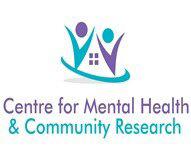
Body image, media literacy and eating disorders are popular topic choices for students who are interested in participating in the Young Social Innovators, Transition Year Annual Show, Cycle Against Suicide or other mental health promotion events.
These topics are also popular with Leaving Cert Applied. Workshops can be arranged with project groups on request. Bodywhys input to the relevant project group can acknowledge and support their interest
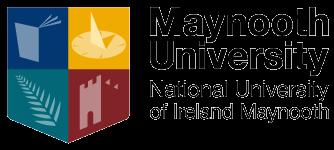
Please contact info@bodywhys.ie for more information on what Bodywhys offer schools and to receive a school pack with a selection of information sheets, leaflets and posters.
*** Who Europe, (2022). https://www.who.int/europe/news/item/11-02-2022-who-europe-urges-governments-to-include-young-people-in-decisions-about-their-health
Dooley, B., O’Connor, C., Fitzgerald, A.,& O’Reilly, A. (2019).My world survey 2: national study of youth mental health In Ireland. Headstrong and UCD School of Psychologyhttp://www.myworldsurvey.ie/full-report
"This talk/ workshop is intended to promote awareness of eating disorders and the supports available and also to promote positive body image through discussion"





The culture of Vocation is an ongoing journey in life, responding to God’s call.
Walking together on this journey helps us to discover who we are and what we have in common.
We discover the uniqueness of each one of us in our diversity in harmony.
Vocations Ireland can help you with this journey to explore your giftedness. Help you to discern who God is for you? Help you to explore vocation in terms of
■ God’s call to friendship,
■ Being there for others
■ Love and family
■ Work, mission,
■ Various vocation options
We can be of assistance to R.E. Teachers, career guidance, chaplains and pastoral care staff on how to find ways to explore with young people the many questions they have about their lives.

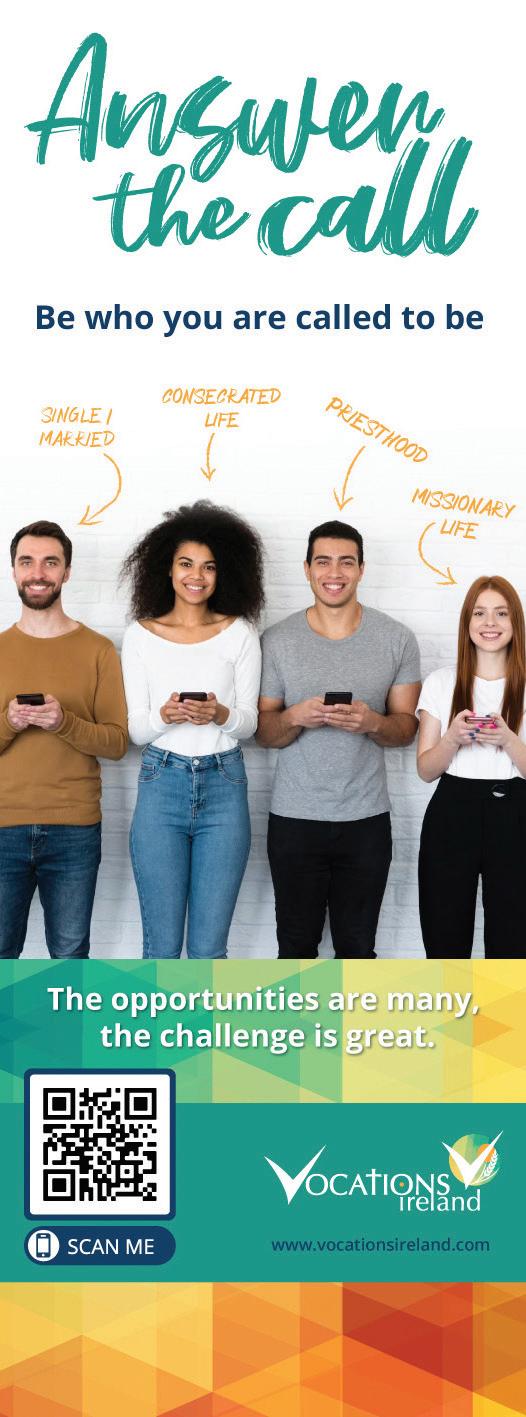
We offer classroom zoom conversations with religious and lay people capable of speaking about the various vocations.
Webinars for teachers on various topics linked to the R..E. curriculum – Faith, Vocation, Baptismal Call. Justice and Ecology issues. Explore documents such as Laudato Si (Care for our common home) and Christus Vivit Pope Francis & young people
Resources for classroom use: information sheets, prayer samples, Quizzes,. Names of films, videos and books
If you are interested in having a zoom panel discussion between your students and vocation personnel.
Or if you would like to attend a webinar on key topics such as faith today, culture of vocation, religious vocation diocesan vocations and understanding our own Baptism and what is being asked of us.
Please contact Margaret Cartwright at info@vocationsireland.com
Are you interested in “Come and See” days which give you an insight into what a religious community is.
Are you interested in attending Faith events, Pilgrimages, Day Retreats, One to one Accompaniment to help you explore your journey in life. Prayer guidance? Samuel Groups
Contact Margaret Cartwright at info@vocationsireland.com
Be who you are called to be
THE Higher Education Access Route (HEAR) is a college and university scheme that offers places on reduced points and extra college support to school leavers from socio-economically disadvantaged backgrounds who are resident in the Republic of Ireland.
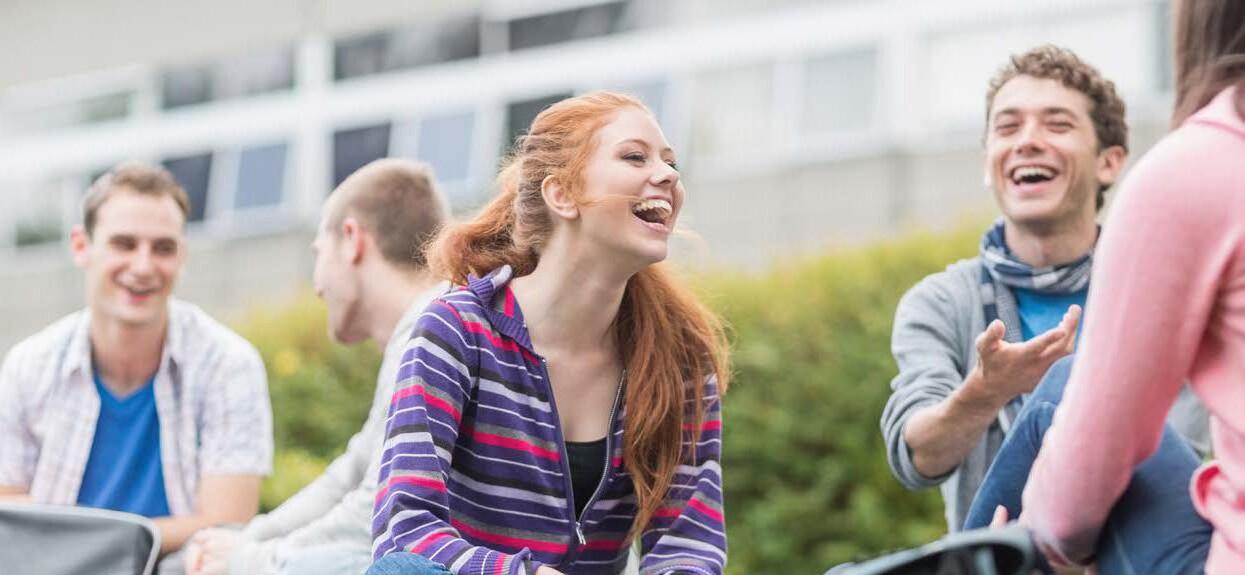
HEAR was set up to tackle educational disadvantage. Socio-economic disadvantage negatively impacts on educational attainment at school and affects progression by some second level students to third level. Research in Ireland shows that, for example, the son/daughter of an unskilled manual worker (e.g. factory worker) is less likely to progress to higher education than the son/daughter of a higher professional (e.g. doctor).
HEAR is for school leavers under the age of 23 as of 1 January 2023 who are resident in the Republic of Ireland. Mature and FET (Further Education and Training) students have their own admissions routes and should contact college admissions offices for more information. Applications to HEAR can only be made online through the CAO.
If you apply to HEAR and meet the application criteria (that is, are deemed eligible for HEAR) you may be offered a place even if you do not have enough Leaving Certificate points for your preferred course. Each participating college and university has a reserved number of places to offer eligible HEAR applicants at lower or reduced Leaving Certificate points.
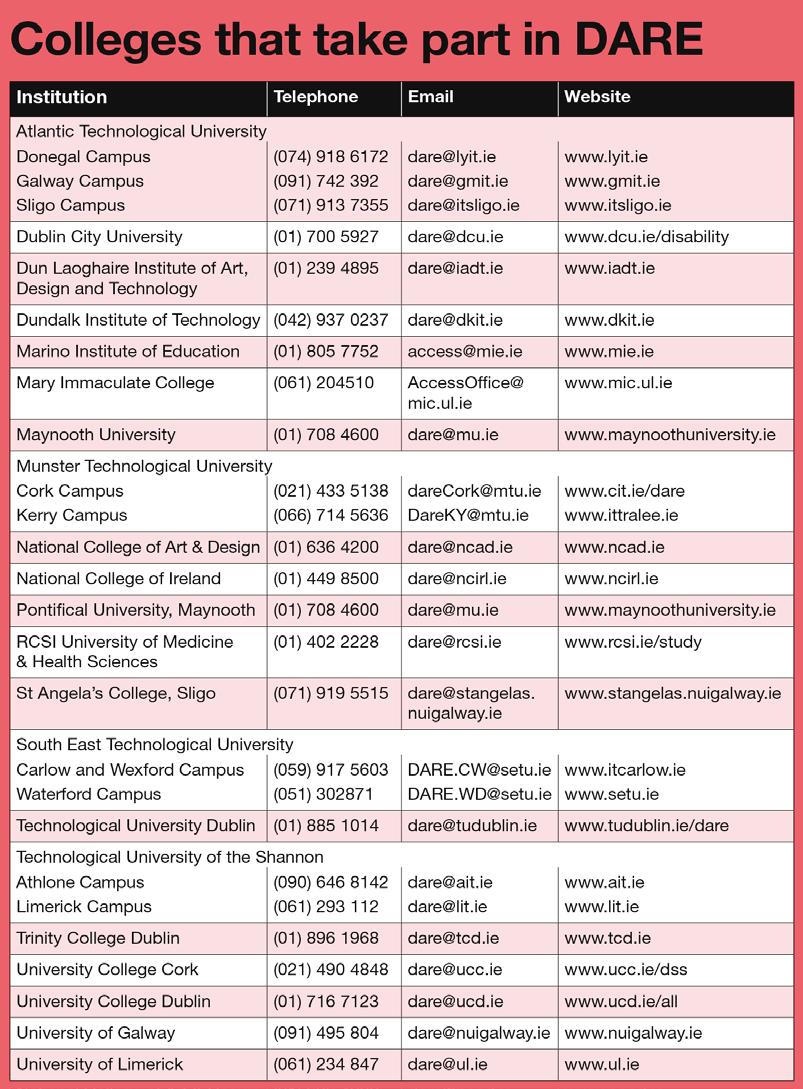

An example of a reduced points offer is that the Leaving Certificate points for a particular course is 366 points. An eligible HEAR applicant could be offered a place with a lower points score, e.g. 356 points.
This applicant would also, like all other applicants applying to college, need to meet the minimum entry requirements and any specific pro-
gramme requirements before being considered for a HEAR reduced points offer. The reduction in points for HEAR places can vary every year.
The number of points a particular course is reduced by is dependent on a number of factors, such as:
• The overall number of places on the course.
• The number of reserved HEAR places on the course.
• The number of HEAR eligible applicants competing for these reserved places.
Information on the number of reduced points places available per
course and the method used by colleges for selecting eligible HEAR students for those places is available on some HEI websites and on the page of each of the participating colleges on the accesscollege.ie site.
If you get a place through HEAR, you will receive a variety of academic, personal and social supports while at college. College supports may include:
• An Orientation Programme to introduce you to university/ college.
"Research in Ireland shows that, for example, the son/daughter of an unskilled manual worker is less likely to progress to higher education than the son/ daughter of a higher professional"
• Extra tuition if required, study skills and exam preparation.
• One-to-one meetings with student advisers.
• Social gatherings/mentoring.
• Extra financial assistance when available/advice regarding grants and scholarships.
Prioritisation of Applicants
Eligible for both DARE & HEAR Research has shown that students with disabilities from disadvantaged backgrounds face the greatest obstacles when it comes to progression to higher education.

In order to increase the numbers of students facing this ‘double disadvantage’, colleges participating in DARE and HEAR have agreed to prioritise this group when allocating reduced points places.
What HEAR is not HEAR is not your maintenance grant (SUSI grant). The maintenance grant is the main source of financial assistance available from the Irish State for students in full-time Post Leaving Certificate Courses (PLCs) and full-time higher education undergraduate courses. HEAR is an
"In order to increase the numbers of students facing this ‘double disadvantage’, colleges participating in DARE and HEAR have agreed to prioritise this group when allocating reduced points places"
admissions scheme to help students who may not traditionally go on to third level.
Financial Assistance and SUSI

Students applying to HEAR are encouraged to find out more information on the maintenance grant. Additional information on other sources of financial assistance for third level students is available at www.studentfinance.ie.
Should I apply?
HEAR applicants must meet a range of financial, social and cultural indicators (criteria) to be considered for a reduced points place and extra college support. Here is a list of all the HEAR indicators:
Indicator 1 – Low Income Is the household income below the HEAR Income threshold in 2021?
Indicator 2 – Medical Card Is the applicant or his/her mother/father/ guardian in receipt of a medical card (in date on 31st December 2022)
Indicator 3 – Social Welfare Is the applicant’s mother/father/guardian in receipt of a means-tested social
welfare payment (for a minimum of 26 weeks in the relevant year) 2021?
Indicator 4 – Socio-Economic Grouping (based on occupation and employment status) Is the applicant a member of a group underrepresented in higher education?
Indicator 5 – DEIS School Did the applicant attend a school part of the Department of Education & Science “DEIS” scheme (Delivering Equality of Opportunity in Schools) for the duration of their second level education?
Indicator 6 – Geographical Area Does the applicant live in an area of concentrated disadvantage?
The combinations for eligibility are:
INDICATOR 1 plus 2 plus 4 or 5 or 6 INDICATOR 1 plus 3 plus 4 or 5 or 6 INDICATOR 1 plus 4 plus 5 or 6 INDICATOR 1 plus 5 plus 6
Comprehensive information on the HEAR scheme is available at www.accesscollege.ie
OMW Supplies is a sports and educational equipment provider for schools, sports clubs, county councils, parks and for private customers since 2017.
In their 6 years of operation, they have become an official partner of Basketball Ireland as well as an official Irish supplier of brands such as Dr. Dish Basketball, TeqBall and Padbol!
OMW Supplies started off supplying and installing basketball and gymnastic equipment, but soon expanded into other sports such as football, tennis and badminton and equipment such as electronic scoreboards, thermoplastic game and court markings, outdoor sports tables and outdoor courts.
In recent months, they have introduced new park equipment, expanding into playground equipment, outdoor gym and street workout equipment, as well as safety flooring for such. OMW Supplies
cater to everyone with their inclusive park products to make sure noone is left out.

OMW Supplies have done hundreds of installations all over the country, no matter the distance. They have done countless installations for institutions like Sport Campus Ireland, providing a wide variety of equipment.
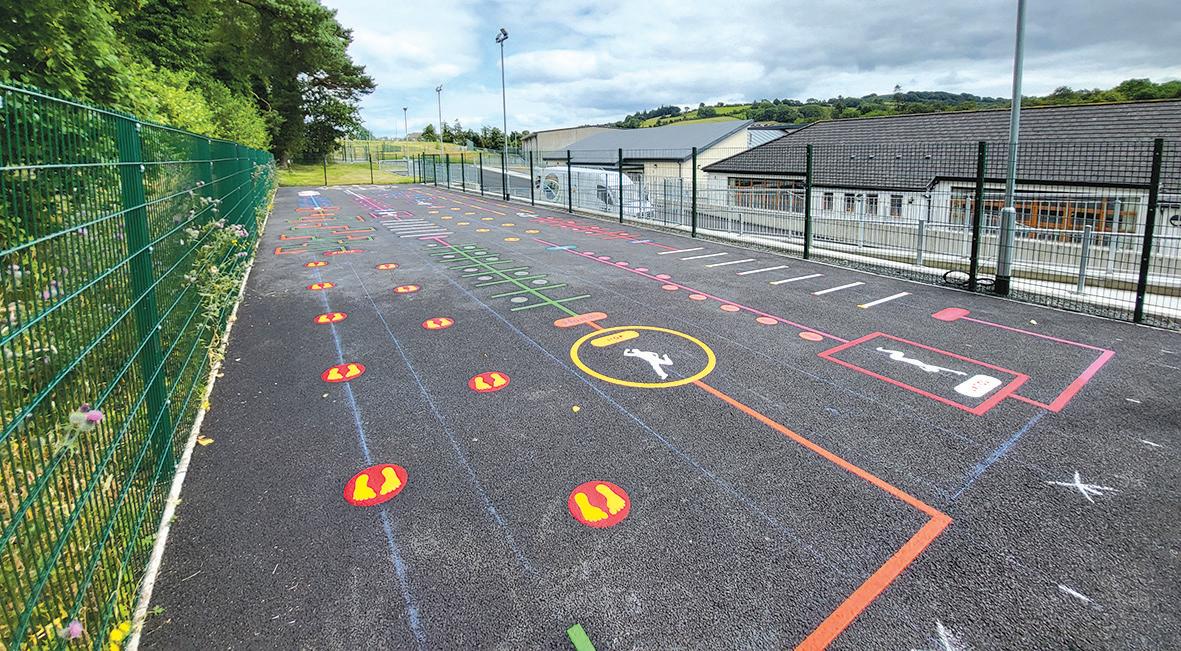
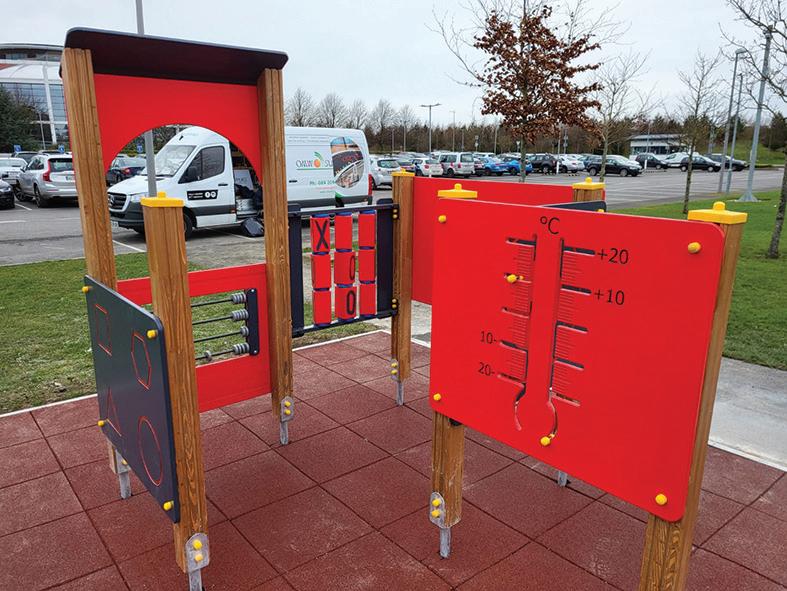
The company have installed two full-size basketball courts, using their modular sport surface Courty, and installed multiple heavy duty inground basketball hoops for them. At the start of 2023, OMW Supplies created a brand new space for them, equipped with a wheelchair accessible swing, a wheelchair accessible roundabout, a full size climbing cube as well as EPDM safety flooring for the area.
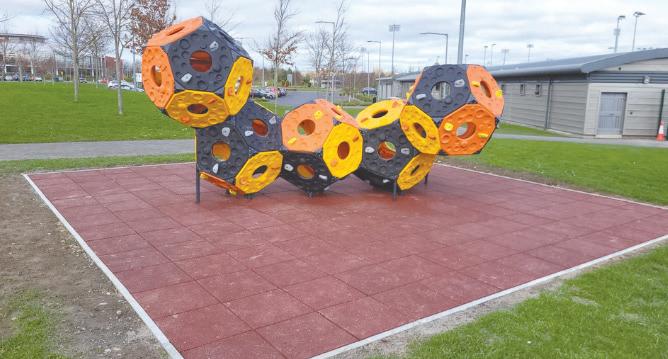
OMW Supplies prove that no project is too big or too small with a vast
"The company have installed two full-size basketball courts, using their modular sport surface Courty, and installed multiple heavy duty inground basketball hoops for them"
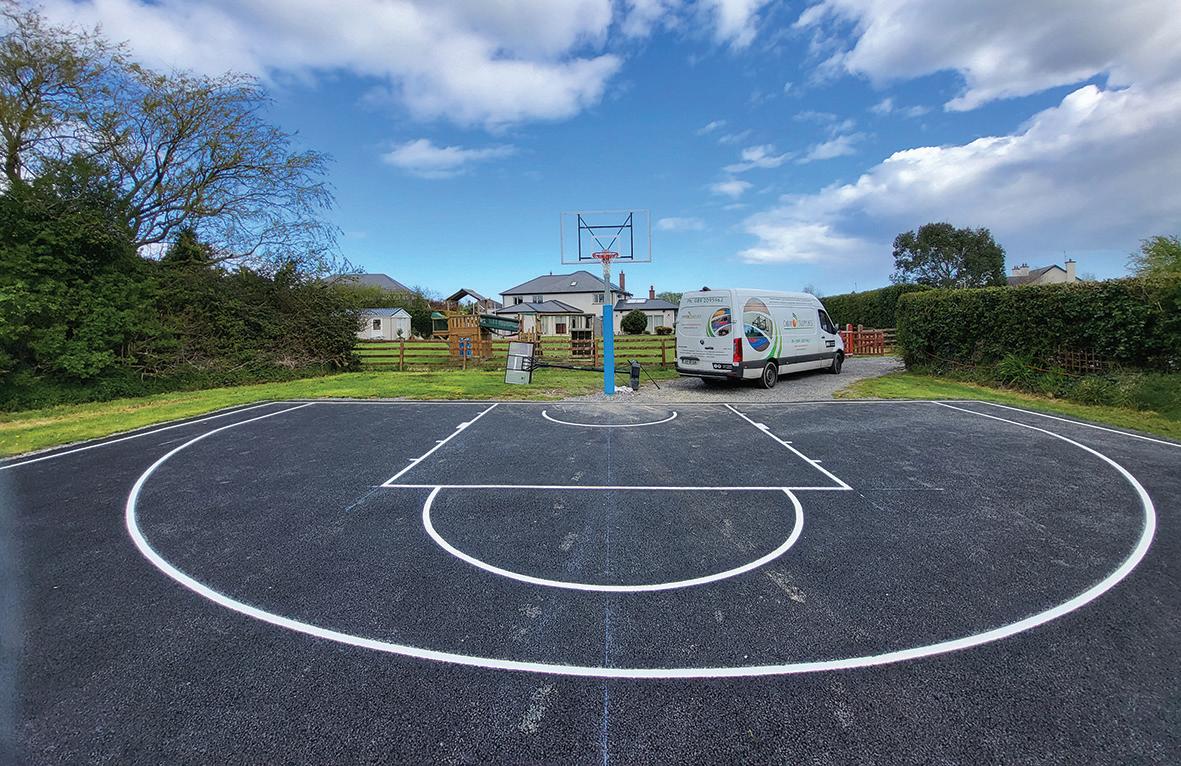
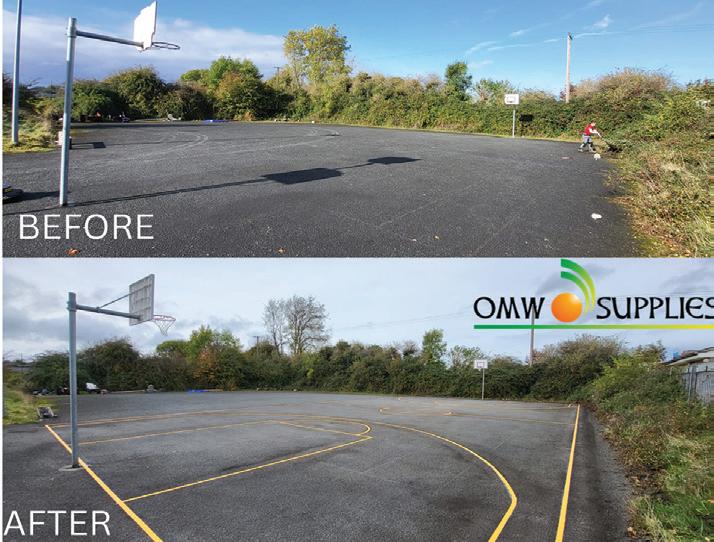
amount of private home and garden installations. Their expertise has allowed them to become the official partners of Basketball Ireland. For the last 6 years, they have been providing them with official competition size 3v3 basketball courts and competition state basketball hoops! They have kitted out basketball competitions and events in Limerick, Dublin and Galway!
All of their basketball products are FIBA approved, and exceed the Department of Education's requirements. Their Courty surface is a sports surface that is perfect for the construction or renovation of sports courts. It is widely used to build
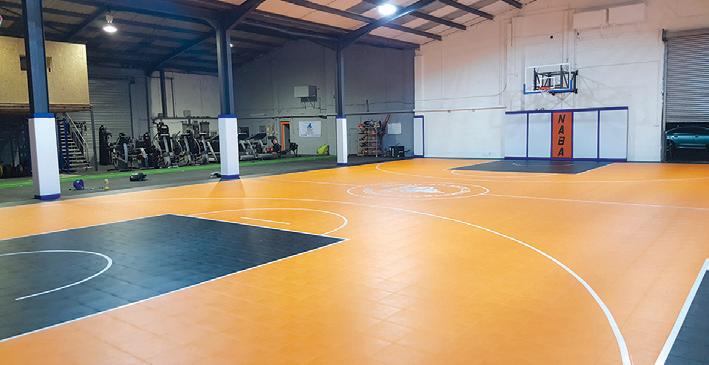

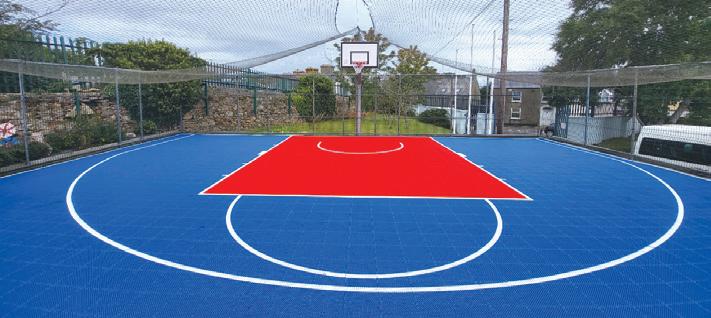
multi-functional courts. The surface consists of easy-to-install polypropylene modules, thanks to which you can quickly and efficiently build a sports facility in public, commercial or private places. Over the years, OMW Supplies have sponsored both teams and events in the North Atlantic Basketball Academy.
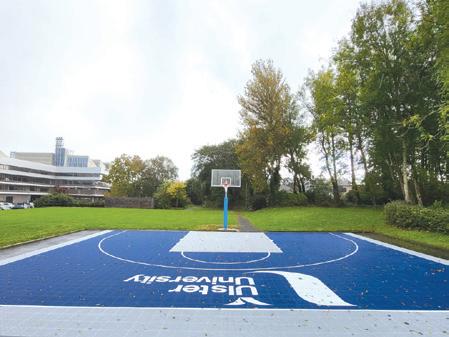

This month, OMW Supplies are bringing a new sport to the Irish market - Padbol! Padbol is a dynamic fusion of popular sports. It combines football with skills from tennis, squash and volleyball to create explosive, action packed gameplay. It is extremely dynamic, and can be played by men and women of any age group.
Padbol is currently present in 27 countries and growing at a rapid speed and aiming to be part of the Olympic Games. With their court surface expertise, OMW Supplies are
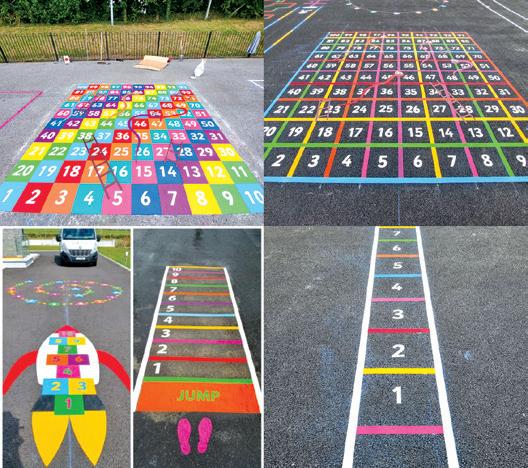

"Their Courty surface is a sports surface that is perfect for the construction or renovation of sports courts. It is widely used to build multifunctional courts. The surface consists of easy-toinstall polypropylene modules"

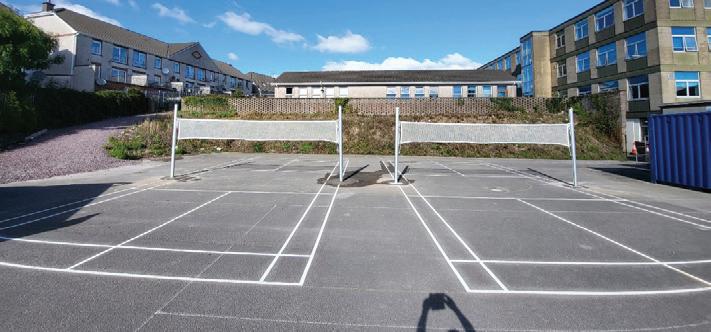
the only Padbol court suppliers in the country!
As sport equipment specialists, OMW Supplies will recommend equipment fit for your space, no matter the size. In order to utilise all space available, they provide and install motorised, ceiling mounted basketball hoops that can be lifted and lowered for convenience.
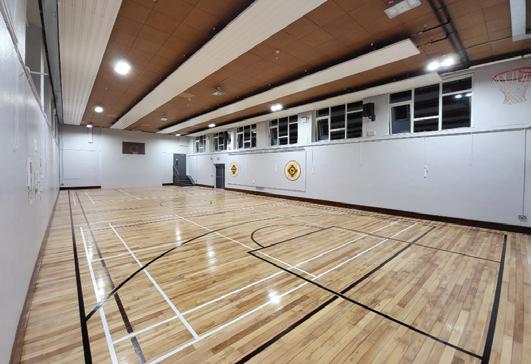
They also specialise in wall mounted basketball hoops with a folding mechanism for storing convenience as well as many height adjustable inground basketball hoops to suit any age group.

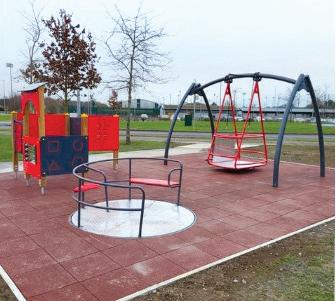
For outdoor equipment, OMW Supplies ensures all their products are made from durable and weather resistant materials, as well as galvanised steel for longevity.

For primary and secondary schools, OMW Supplies carries out a monthly email newsletter with their
latest offers and deals! Additionally, they offer a delivery service for equipment and products that do not require an installation service. Whether you are a professional or an amateur, OMW Supplies will have a product for you!
Owner, Wojciech Weclawowicz, leads a hands-on team to ensure total customer satisfaction from the get go. With 6 years of experience under his belt, he provides the highest quality equipment and installation service and that’s why clubs and schools everywhere choose OMW Supplies for all their projects.
For any queries or questions, contact Wojciech on 089 2095962 or at omwsupplies@gmail.com.
To view all of their products, visit www.omwsupplies.ie.
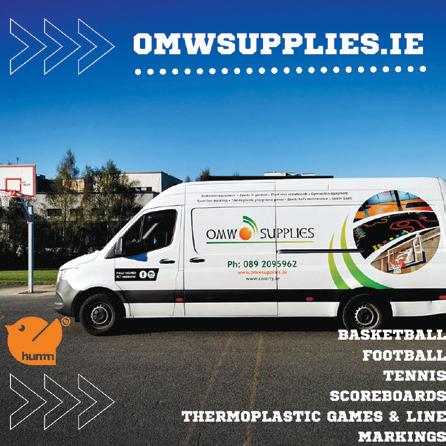
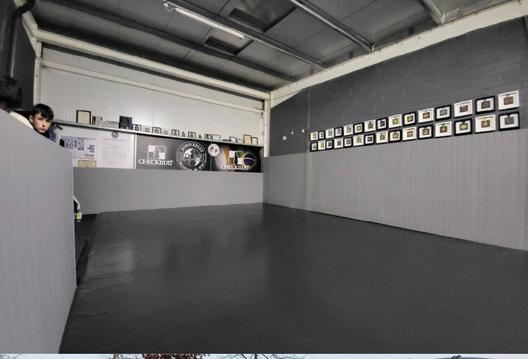
For all previous installations, you can find them on Facebook, Instagram, Twitter and LinkedIn under @omwsupplies.



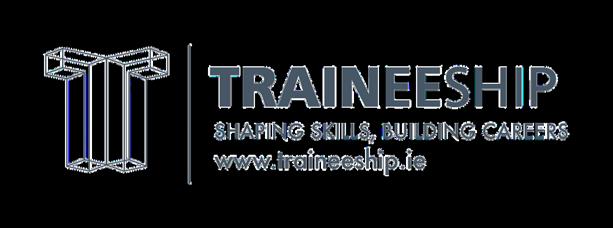
Course Areas:
Architectural Technology and Engineering with 3D CAD
Digital Marketing

Healthcare
HGV Professional Driving
CMETB Traineeships:
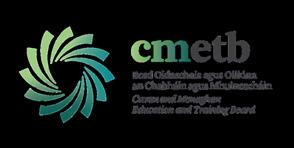

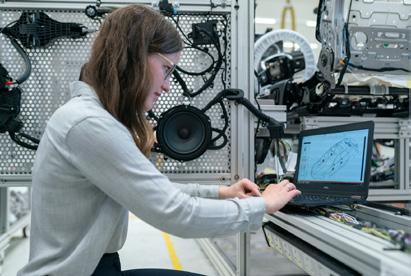
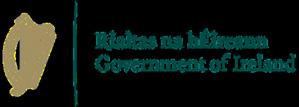
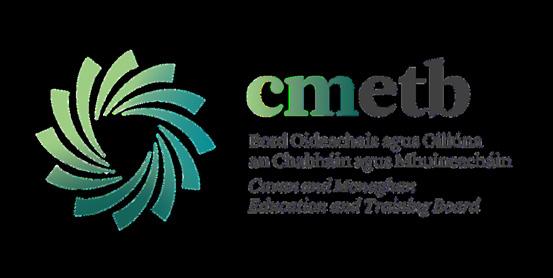
Laboratory Assistant

OEM Engineering Technology
Outdoor Activity Instructor

Soft Furniture Production
Youth Work
Open to school leavers and mature students and are fully funded
Lead to an award at NFQ level 5-6, or equivalent
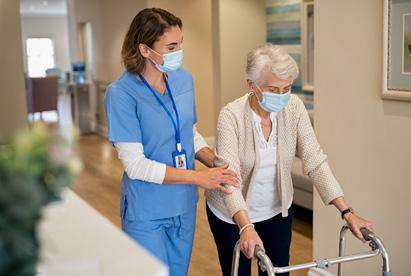


Are between 6-9months in duration
Have at least 30% of learning on the job
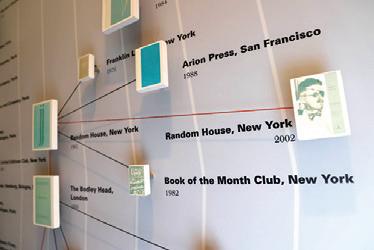
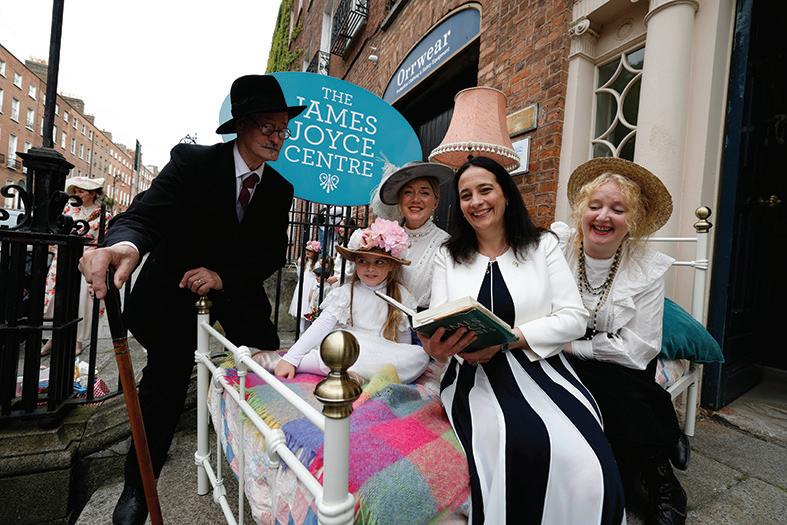
THE James Joyce Centre is located in North Dublin city centre, or as Joyce called it ‘the heart of the Hibernian metropolis.’
The Joyce Centre has for more than forty years offered the public exhibitions, lectures, classes, recitals, and events that focus on one of Ireland’s most famous artists and the city he devouted his life to. The Centre is proud to offer students and educators various classes, workshops, tours, and group admissions.
The Joyce Centre is located at 35 Great George’s Street in a stunning, beautifully preserved Georgian townhouse. Our spaces include exhibitions, works of art, videos, and various artifacts from Joyce’s life and work. It is in the area of Dublin in which Joyce spent the majority of his early life and the great majority of his work takes place.
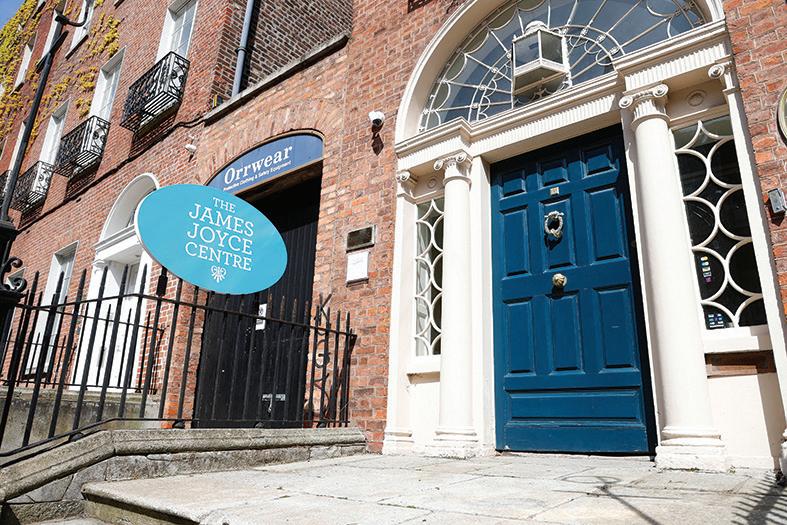
The Joyce Centre is a registered educational charity. As such, we offer several promotions and programmes for primary and secondary school students. Students are offered a special discount for admission to our various exhibitions.
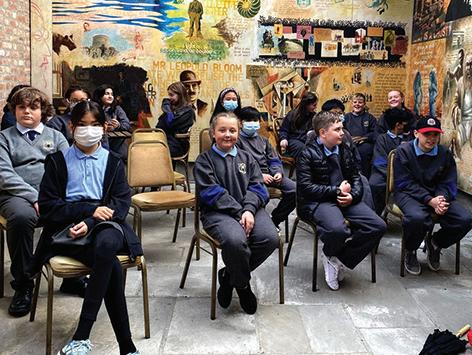
In addition, we host several classes
and tours. These programmes are an ideal way to learn about Joyce and, more broadly, Irish literature and the history of Dublin. Our “Walk n Talk” course, for example, consists of a 30-minute lesson on Joyce followed by a 30-minute walk around the neighbourhood in which we see some of the locations mentioned in Joyce’s work.
We also offer two longer walking tours, “Introducing Joyce’s Dublin” and “Footsteps of Leopold Bloom.” Approximately two hours long, the tours go through the very streets and buildings that Joyce immortalised in his work. This is a great way to immerse oneself in Dubliners, Portrait of the Artist, and Ulysses.
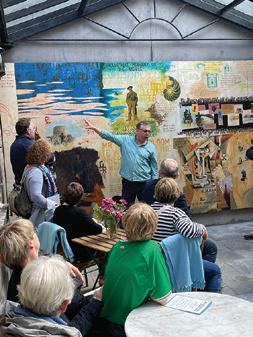
“Introducing Joyce’s Dublin” is a broader overview of Joyce’s life and work, including his earlier work Dubliners and Portrait of the Artist. Some of the locations featured in this tour are Belvedere College, St. George’s Church, Eccles Street, Parnell Square, the Gresham Hotel, and the James Joyce Statue.
“Footsteps of Leopold Bloom” focuses more on Ulysses. It follows the exact route Leopold Bloom takes in the “Lestryogonians” chapter. Some of the locations featured in this
“Introducing Joyce’s Dublin” is a broader overview of Joyce’s life and work, including his earlier work Dubliners and Portrait of the Artist. Some of the locations featured in this tour are Belvedere College, St. George’s Church, Eccles Street, Parnell Square, the Gresham Hotel, and the James Joyce Statue"
tour are Abbey Street, the O’Connell Bridge, Trinity College, Grafton street, Davy Byrne’s, and the National Museum.
For primary school students, we offer “Ulysses for Kids.” Through performance, song and storytelling, they bring to life the child characters in Joyce’s Ulysses and explain the elements at the heart of the book –the importance of curiosity and learning, to respect others, the trickiness of family relationships and love and why everyone needs a place to call home. The performance lasts approximately 45 minutes.
Private house tours and tailored walking tours are also available. Our staff consists of knowledgeable tour guides, curators, and Joyceans who are experts in the field.
We offer seminars for teachers who wish to teach Joyce’s work. Our staff provides lesson plans, lectures, handouts, and general guidance for teaching Joyce’s work to secondary school students, including Dubliners and Portrait of the Artist. These are ideal for educators who are preparing for the Leaving Certifications.
If you are interested in visiting the Joyce Centre, please email us at info@jamesjoyce.ie.
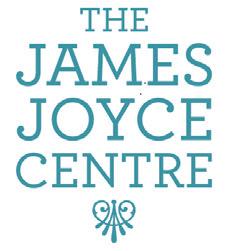
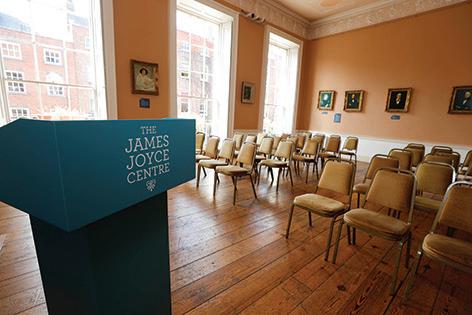

THE Disability Access Route to Education (DARE) is a third level alternative admissions scheme for school leavers whose disabilities have had a negative impact on their second level education. DARE offers reduced points places to school leavers who, as a result of having a disability, have experienced additional educational challenges in second level education.
DARE is for school leavers (under 23yrs as of 1 January 2023) who have a disability and who may not be able to meet the points for their preferred course due to the impact of their disability. Applicants to DARE can present with an Irish Leaving Certificate, A-Levels and other EU qualifications.
Mature students and students applying on the basis of Further Education and Training (FET) results have different admission routes. You can get further information on these routes from college and university websites.
If you have one or more of the disabilities listed and your disability has had a negative impact on your second level education, then you should apply to DARE. To be eligible for DARE, you must meet both the evidence of disability criteria and educational impact criteria.
If you apply to DARE and meet the application criteria (that is, are deemed eligible for DARE) you may be offered a place even if you do not have enough Leaving Certificate points for your preferred course.
Each participating college and university has a number of reserved places to offer eligible DARE applicants at lower or reduced Leaving Certificate points.

An example of a reduced points offer is that the Leaving Certificate points for a particular course is 366 points. An eligible DARE applicant
could be offered a place with a lower points score, e.g. 356 points.
This applicant would also, like all other applicants applying to college on the basis of their Leaving Certificate results, need to meet the minimum entry requirements and any specific programme requirements before being considered for a DARE reduced points offer.
The reduction in points for DARE places varies every year.
The number of points a particular course is reduced by is dependent on a number of factors, such as
• The overall number of places on the course.
• The number of reserved DARE places on the course.
• The number of DARE eligible applicants competing for these reserved places.
Information on the number of reduced points places available per course and the method used by colleges for selecting eligible DARE students for those places is available on HEI websites and on each of the participating colleges’ page on the accesscollege.ie site.
■ Attention Deficit Disorder (ADD)/ Attention Deficit Hyperactivity Disorder (ADHD)
■ Autistic Spectrum Disorder (including Asperger’s Syndrome)
■ Blind/ Vision Impaired
■ Deaf/ Hearing Impaired
■ Developmental Coordination Disorder (DCD) –Dyspraxia
■ Dyscalculia/ Significant Numeracy Difficulties
■ Dyslexia/ Significant Literacy Difficulties
■ Mental Health Condition
■ Neurological Condition (including Brain Injury and Epilepsy)
■ Physical Disability
■ Significant Ongoing Illness
■ Speech and Language Communication Disorder
Eligible for both DARE & HEAR
Research has shown that students with disabilities from disadvantaged backgrounds face the greatest obstacles when it comes to progression to higher education. In order to increase the numbers of students facing this ‘double disadvantage’, colleges participating in DARE and HEAR have agreed to prioritise this group when allocating reduced points places.
You don’t have to be eligible for DARE to get support in college. All students with a verified disability, regardless of whether they come through DARE or not, can avail of a variety of academic, personal and social supports while studying at third level.
College supports may include:
• Orientation programmes.
• Learning support.
• Assistive technology.

• Library support.
• Exam accommodations.
• Educational Support Worker.
• Academic tuition.
AHEAD provides information to students and graduates with disabilities, teachers, guidance counsellors and parents on disability issues in education.
AHEAD undertake national research relating to the inclusion of students with disabilities, contribute to national policy forums and provide professional development opportunities to develop the capacity of staff in FET and higher education to be more inclusive. See www.ahead.ie.
Applying to DARE and applying for a language waiver are two separate processes. Therefore, DARE applicants who require a language waiver but haven’t yet applied for one need to apply to the relevant authorities (UG, UL, UCD, UCC, TCD, etc.).
If you have one or more of the disabilities listed and your disability has had a negative i mpact on your second level education, then you should apply to DAREEditorial source: accesscollege.ie
Further information on applying for language waivers is available on the accesscollege.ie site.
If there is a language requirement in the specific programme requirements for your chosen course, you must have that language.
Fitness to Practice
Students on most professional health/ teaching courses are required to complete a medical declaration form confirming they do not have a disability/ significant on-going illness that may delay or prevent them starting or completing the professional programme.
If you are applying for these type of courses, it is useful to discuss any questions or concerns you may have with the Disability/Access Service in the college in which you are interested.
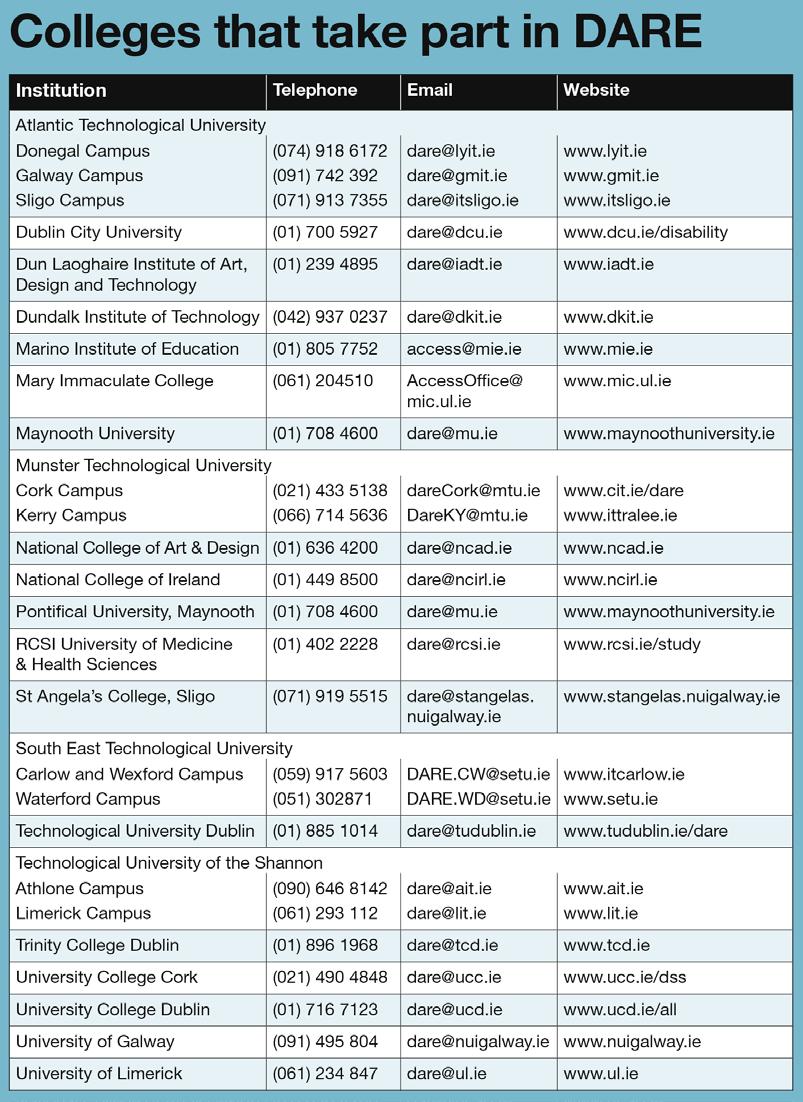
Financial Assistance and SUSI

Students applying to DARE are encouraged to find out more information on the maintenance grant. Additional information on other sources of financial assistance for third level students is available at www.studentfinance.ie.

Comprehensive information on the DARE scheme is available at www.accesscollege.ie
AHEAD provides information to students and graduates with disabilities, teachers, guidance counsellors and parents on disability issues in education.
UNIVERSITIES are posh places for posh people. This old hat used to be true, now is partially true and has largely been overcome by middle Ireland.
More than half of 25 to 64-yearolds in Ireland have a third-level qualification, the highest in the EU according to CSO data.
But for many groups in Ireland university education remains a distant prospect preserved for the lucky few. These groups include those on very low incomes living in geographically disadvantaged areas. It includes people who are disabled physically or with regard to their mental health. It includes groups like Travellers and Roma, and newly arrived migrants to Ireland.
The Access Centre at the University of Galway works to ensure greater participation from underrepresented groups, and established
in 2020, the university's Widening Participation Committee works specifically towards progressing this agenda in all areas across the university.

The committee sees Widening Participation (WP) having three elements to it:

1) Creating a more inclusive environment for students who would be traditionally regarded as underrepresented in Higher Education
2) A set of policies and activities developed to improve (1)
3) These WP activities and policies take place across the full student lifecycle: Pre-entry, transition, postentry, and employment.
The Access Centre provides support for students with disabilities, students participating in access programmes and mature students.
The university has seen a large increase over the years of students
By Niall Gormleyregistering for disability supports which reflects greater numbers of disabled people accessing education genearlly and perhaps greater confi-
Numbers of students registering for
dence amongst disabled people that their disabilities will be catered for and won't be used against them (see table above).
FET pathway
Another area of increase is the Further Education pathway which allows students to start their education journey at post Leaving Cert and Further Education colleges and move on into university. From 7 students in 2010, the number reached 152 in 2020.
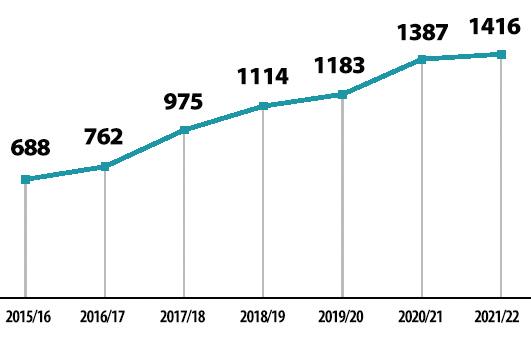
In 2018, the university's Further Education to Higher Education Committee was established. Meeting on a monthly basis, this group sets out to foster greater collaboration between both sectors and to increase the progression opportunities for students from the Further Education sector.
In the 2022 Widening Participation Committee report, chair John Hannon said:
"Extensive work has been done to move us closer to a University population that reflects the social mix of the general population.
"The commitment to Widening Participation extends throughout the University and it is through a wholeof-institution approach that we stand the best chance of ensuring students from underrepresented groups in HE can access, participate and succeed in the University of Galway."
■ Uni4U
Uni4U is aimed at DEIS schools in Galway where students are exposed university life. Since 2005 approximately 1570 pupils have participated in Uni4U.
■ University of Sanctuary
This programme is open to International Protection applicants, refugees, vulnerable immigrant groups and Irish Travellers.
■ Mincéirs Misl’d in Education
An Irish Traveller community embedded and culturally inclusive model to empower Irish Travellers to identify and overcome barriers to access, progression, retention, and success in higher education.
■ Embedding Access & Inclusion Project
The purpose is to drive excellence in teaching and learning and the built environment for the benefit of all students, but specifically for students with disabilities.
■ Laptop Loan Scheme
Under this scheme, undergraduate and postgraduate students are eligible to apply for a laptop on long-term loan.
■ Alternative Eye
Alternative Eye is a new pilot podcast series exploring why difference is not always what we think it is. In 2021/22, three contributors took listeners through their lived experience and explained how it plays out in everyday life and in education.
■ Medical Opportunities for Sanctuary
Transition Years (MOST) pilot programme
The MOST pilot is to establish the impact of mentoring for secondary pupils interested in Medicine.
■ Attract-Transition-Succeed (ATS) Mentoring
The Access Centre’s ATS Mentoring programme matches current/former undergraduate students with new entrants to full-time undergraduate study to ease the transition to University life.
■ 1916 Bursary
The Bursaries are targeted at students who are socio-economically disadvantaged and who are from one or more target groups that have low participation rates in higher education.
■ Centre for Adult Learning and Professional Development (CALPD) Offers a range of part-time, flexible courses with professional development opportunities for adult learners.
■ Recognition of Prior Learning
The National Recognition of Prior Learning in Higher Education (RPL in HE) Project is a four-year scheme, which works across 19 publicly funded higher education institutions. RPL as a concept values all types of learning, regardless of where it has occurred (e.g., in formal education settings, workplaces or everyday life).
■ Youth Academy
The Youth Academy the university works with high ability 4th, 5th and 6th class primary school students to support their learning and academic development.
■ Academic Writing Centre (AWC)
The AWC ensures that underrepresented students receive support with their academic writing, with 77 students attending these in 2021-22.
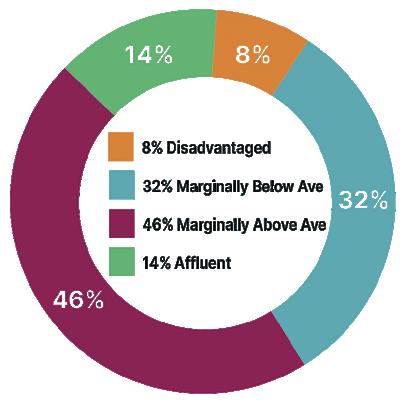
■ Breaking the SEAL Breaking the SEAL (Student Engagement with Archival Learning) seeking to better equip second-level students in their Leaving Certificate history studies and encourage them to pursue further history studies at University of Galway.
■ Support for Undergraduate Mathematics and Statistics (SUMS) SUMS helps 1st and 2nd year students across all colleges and courses with any aspect of mathematics, statistics, or mathematics-related subjects.
■ Financial Aid Fund
The Financial Aid Funds are operated by Professional Services providing financial supports to students experiencing short or long-term financial difficulties while attending higher education.
■ Access to post-primary Teaching (APT) This project aims to support the access, retention, and success of student teachers from lower socio-economic groups who entered higher education through a preentry Access programme.
■ Cell Explorers (CE)
is a science education and public engagement programme that aims to inform, inspire, and involve the general public in science.
■ Further to Higher Education Committee
Set up in 2018, this group set out to foster greater collaboration between both sectors and increase the progression opportunities for students from the FET sector to University of Galway.
The University of Galway runs a whole suite of programmes, projects and initiatives to help people access and complete third level education.The Pobal Deprivation Index score for the University of Galway's student population Disability Support at University of Galway


BREAKING NEWS
are new age requirements for General Service Recruitment into the Irish Defence Forces for Army Recruit
Naval Service Recruit
Air Corps Recruit
must not be less than 18 years of age and under 29 years of age at the time of application. The Irish Defence Forces recruit Army, Air Corps, and Naval Service recruits all year round.
ARMY UNITS
AIR CORPS UNITS
Brigade


Galway
Limerick Cork
Kilkenny
2 Brigade Dublin Louth Meath
DFTC
(Defence Forces Training Centre)
Kildare
Dublin NAVAL SERVICE UNITS
There are new age requirements for General Service Recruitment into the Irish Defence Forces for Army Recruit | Naval Service Recruit | Air Corps Recruit
Westmeath Donegal
Cork
Applicants must not be less than 18 years of age and under 29 years of age at the time of application. The Irish Defence Forces recruit Army, Air Corps, and Naval Service recruits all year round.
Where are our units located?
ARMY UNITS
1 Brigade Galway
Limerick Cork Kilkenny
2 Brigade Dublin Louth Meath
Westmeath Donegal
DFTC
(Defence Forces Training Centre) Kildare
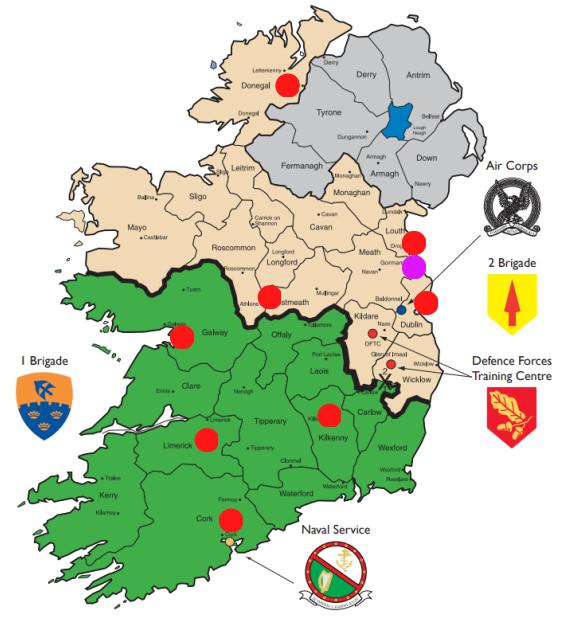
AIR CORPS UNITS
Dublin
NAVAL SERVICE UNITS
Cork
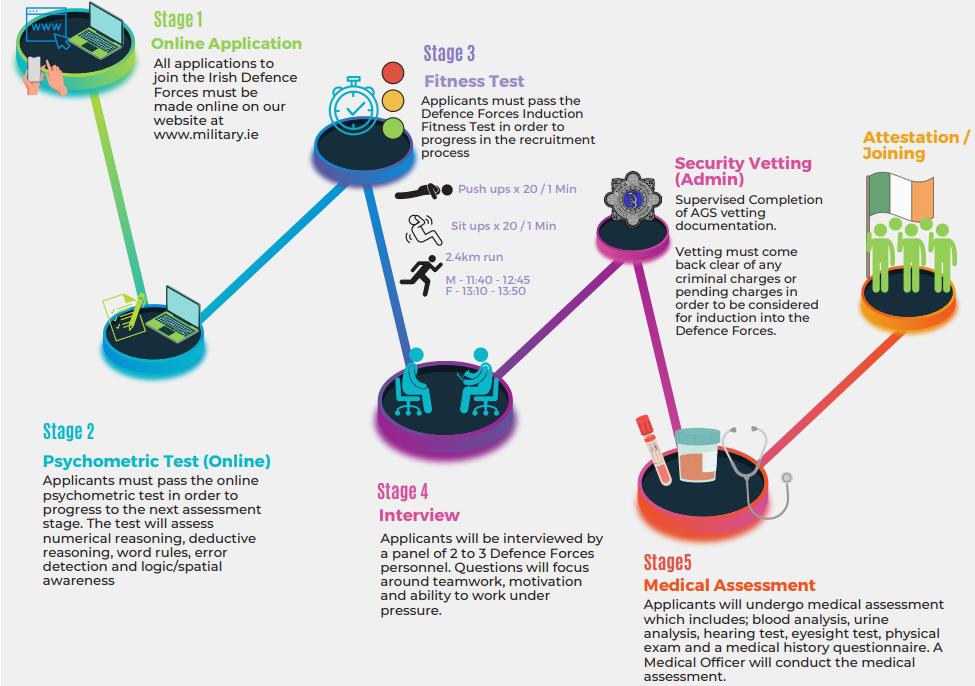


The Recruit Training syllabus is designed to produce physically fit, disciplined and motivated Two Star Privates, Naval Service Able Rates, and Air Corps Airwomen/ Airmen, with basic military skills. Recruit training is the foundation of all military training. It is approximately 12 weeks in duration. On successful completion of Recruit Training, the trained Recruit will then take on a further 12 weeks of training in their respective service. This training will be specific to their chosen service. Recruit training is broken down into four phases;
THE Recruit Training syllabus is designed to produce physically fit, disciplined and motivated Two Star Privates, Naval Service Able Rates, and Air Corps Airwomen/ Airmen, with basic military skills. Recruit training is the foundation of all military training.
It is approximately 12 weeks in duration. On successful completion of Recruit Training, the trained Recruit will then take on a further 12 weeks of training in their respective service. This training will be specific to their chosen service. Recruit training is broken down into four phases:
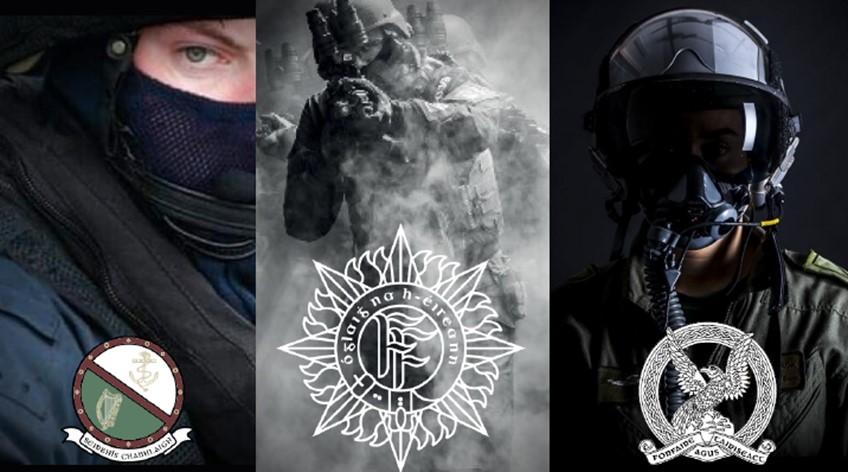

4.
The Recruit Training syllabus is designed to produce physically fit, disciplined and motivated Two Star Privates, Naval Service Able Rates, and Air Corps Airwomen/ Airmen, with basic military skills. Recruit training is the foundation of all military training. It is approximately 12 weeks in duration. On successful completion of Recruit Training, the trained Recruit will then take on a further 12 weeks of training in their respective service. This training will be specific to their chosen service. Recruit training is broken down into four phases;
4.
4.
1. Induction Period 2. Introductory Training Period 3. Tactical Training Period Final Training Period 1. Induction Period 2. Introductory Training Period 3. Tactical Training Period Final Training Period 1. Induction Period 2. Introductory Training Period 3. Tactical Training Period Final Training PeriodSalaries progress on an incremental scale to a maximum point for each rank Recruit on completion of basic training;
€37,147
We value the health and wellbeing of our Army, Naval Service and Air Corps personnel. All members of the Permanent Defence Forces have access to Medical and Dental care as well as Pharmacy and Physiotherapy services
We must be fit to fight. We have state of the art fitness training facilities. Our PT staff are trained to the highest levels to maintain a fit fighting force.
20+ Sports Teams & Clubs (including international soccer & boxing)

Public Holidays
Defence Forces Holidays
Paid Sick leave
Study leave

Our troops have kept peace in over 200 countries worldwide since 1958. Tax Free Overseas Duty Allowance which starts at €15,000
Special leave on return from overseas missions
Fully paid statutory leave such as Adoptive, Maternity & Paternity Leave
28 days minimum Annual Leave

The LOETB Information Hubs are a place where learners can access LOETB’s Adult Educational Guidance and Information Service (AEGIS)
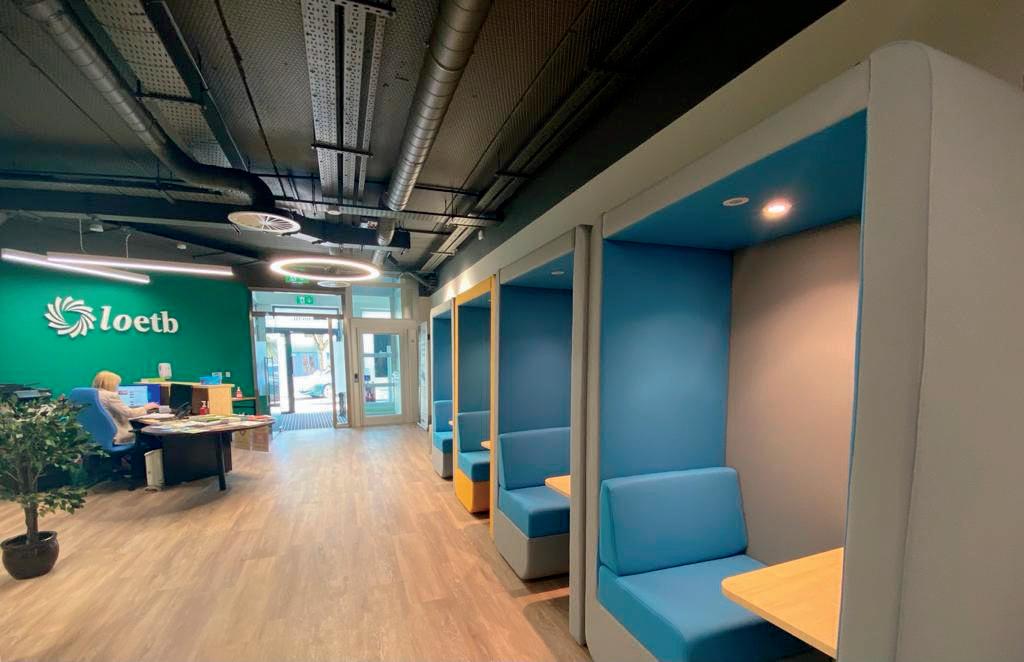
This service offers free, impartial, confidential guidance and information In the Information Hubs learners can:
Access information on education and training options and funding supports. Gain a greater understanding of progression options available through Further Education and Training in LOETB with links to third level colleges. Research course options independently or with support Reserve a space to study, research or attend online classes.
These hubs will have a significant and positive impact on our FET services going forward
Visit our Hubs in Portlaoise and Tullamore
www.loetb.ie/information-hubs

For further information contact:
Laois Information Hub 0578630093 laoisinfohub@loetb ie
Offaly Information Hub 0579351506 offalyinfohub@loetb ie
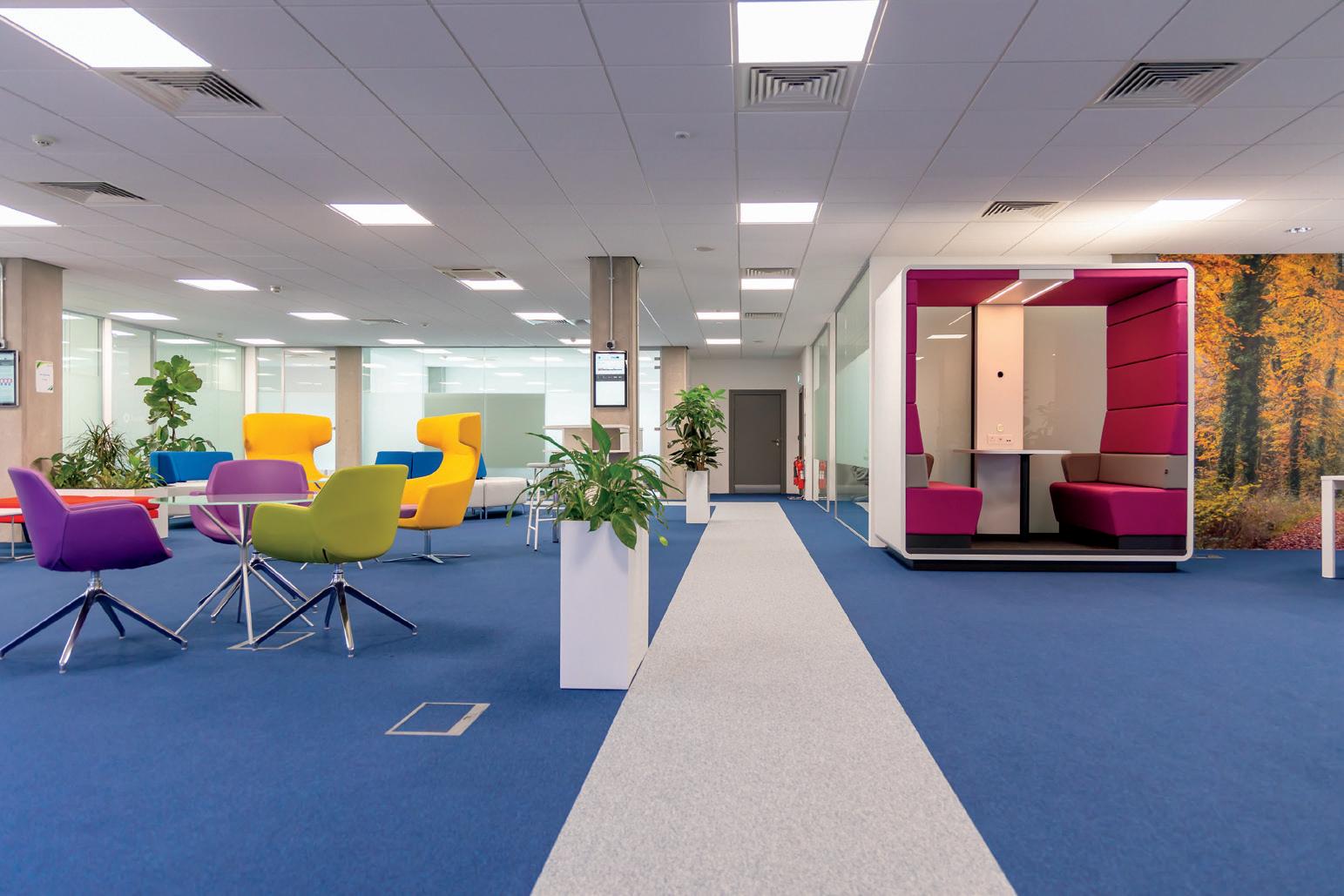
Increasingly, more school leavers are choosing apprenticeship programmes where they get to experience practical training alongside academic study rather than pursuing more traditional full-time third level courses.
The apprenticeship route offers an opportunity to gain real world experience and develop an expertise in a chosen field, while gaining valuable hands-on experience. One of the most attractive aspects of apprenticeship programmes is getting paid to learn, while gaining an industry recognised qualification that offers great employability prospects.
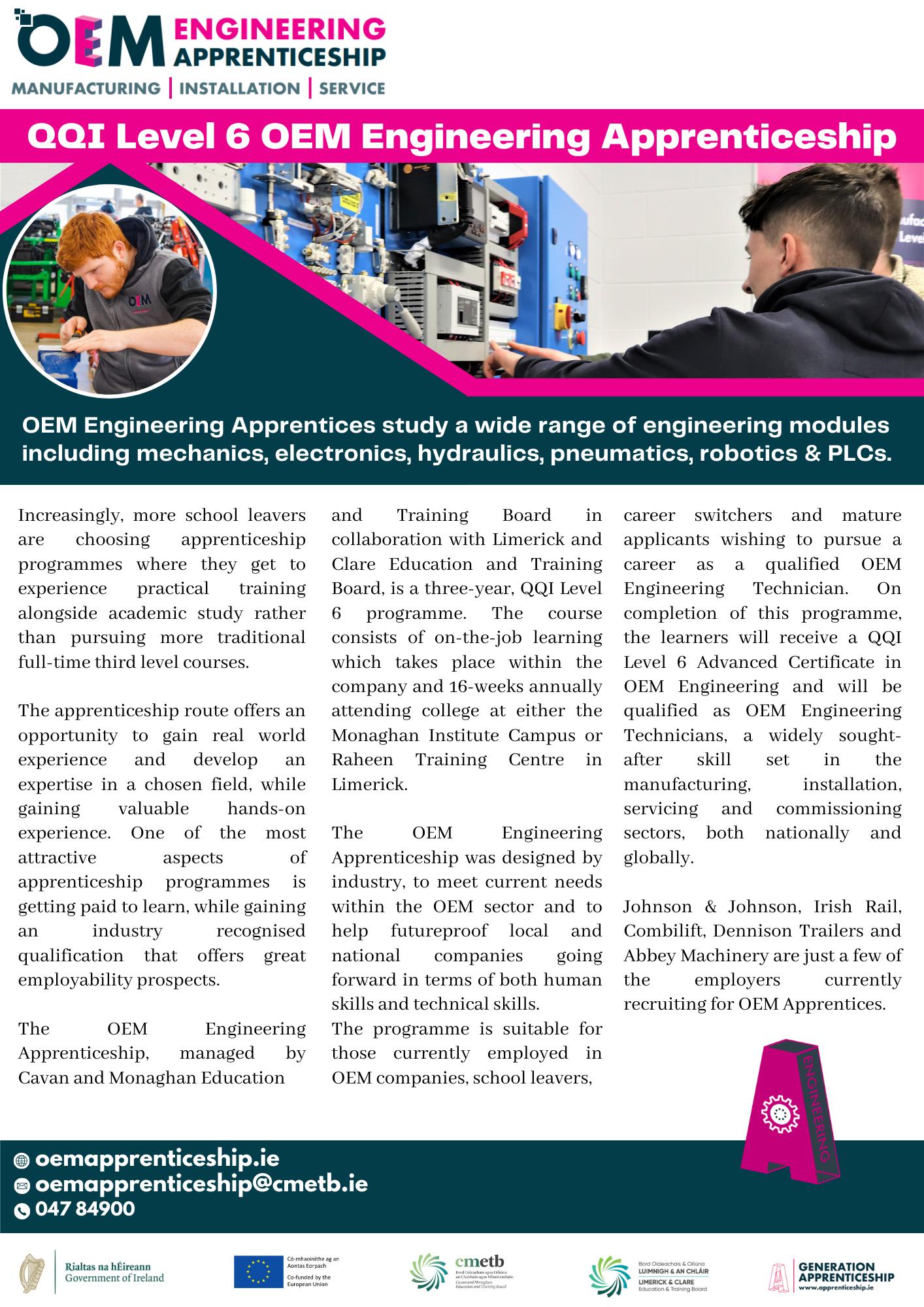
The OEM Engineering Apprenticeship, managed by the Cavan and Monaghan Education and Training Board in
collaboration with Limerick and Clare Education and Training Board, is a three-year, QQI Level 6 programme. The course consists of on-the-job learning which takes place within the company and 16-weeks annually attending college at either the Monaghan Institute Campus or Raheen Training Centre in Limerick.
The OEM Engineering Apprenticeship was designed by industry, to meet current needs within the OEM sector and to help futureproof local and national companies going forward in terms of both human skills and technical skills.
The programme is suitable for those currently employed in OEM companies, school leavers, career switchers and mature applicants wishing to pursue a career as a
qualified OEM Engineering Technician.
On completion of this programme, the learners will receive a QQI Level 6 Advanced Certificate in OEM Engineering and will be qualified as OEM Engineering Technicians, a widely sought after skill set in the manufacturing, installation, servicing and commissioning sectors, both nationally and globally.
Johnson & Johnson, Irish Rail, Combilift, Dennison Trailers and Abbey Machinery are just a few of the employers currently recruiting for OEM Apprentices.
AT ESB Networks, we build and maintain Ireland’s electricity network, connecting over 2.4 million homes, farms and businesses to a clean electric future. We’ve been connecting customers to Ireland’s electricity network since the foundation of ESB in 1927.

We’ve also been making new connections, building a network that’s stronger than ever so we can all be kinder to the planet. We are connecting over 2.4 million homes, farms and businesses to a clean electric future and ESB Networks’ apprentices play an important role in delivering this.
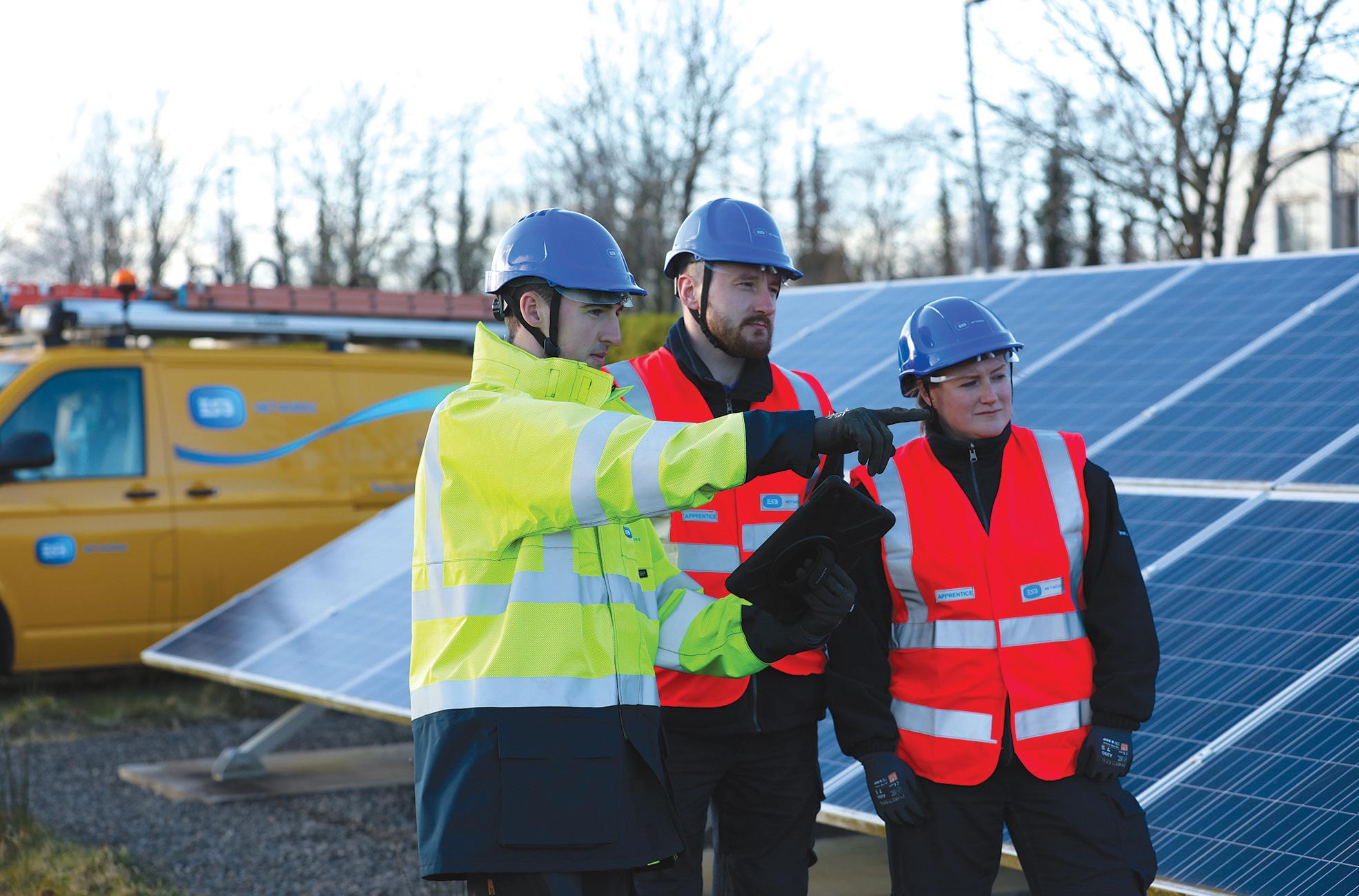
We have recruited over 300 apprentices in the last four years. Our recruitment campaign runs each year in February/March.
The 2023 application process is now closed. The next round will open in February 2024. In the meantime, there are a number of interesting videos on our website that will give you an idea of the type of work our Apprentice Electricians/Network Technicians are involved in on a day-to-day basis.
As an Apprentice Electrician, you will receive on-thejob training and work as part of front-line teams. As well
as classroom-based learning, our Apprentices benefit from varied work experience, working both indoors and outdoors, and learning about technology, customer service, and delivering results under pressure. Our Apprentices learn a variety of electrical and practical skills and, upon completion of the programme obtain a QQI Advanced Level 6 Electrical Trade Certificate which is recognised around the world.
Seven Phases
The ESB Networks Electrical Apprenticeship is SOLAS standards-based, consisting of 208 weeks (four years). During this time, there are seven SOLAS Phases which include on-the-job training during phases 1, 3, 5 and 7 where apprentices work closely with a qualified Network Technician constructing and maintaining the electricity network on varied sites across their assigned area of the country.
SOLAS Phase 2 is in one of the many SOLAS Training Centres while their Phase 4 and 6 are in colleges around the country. Finally, there are 24 weeks of ESB Networks off-the-job training which takes place in the ESB
"As well as classroombased learning, our Apprentices benefit from varied work experience, working both indoors and outdoors, and learning about technology, customer service, and delivering results under pressure"
Networks Training Centre, Portlaoise. Having completed the four-year programme, Apprentices will have gained experience working with a leading utility company.
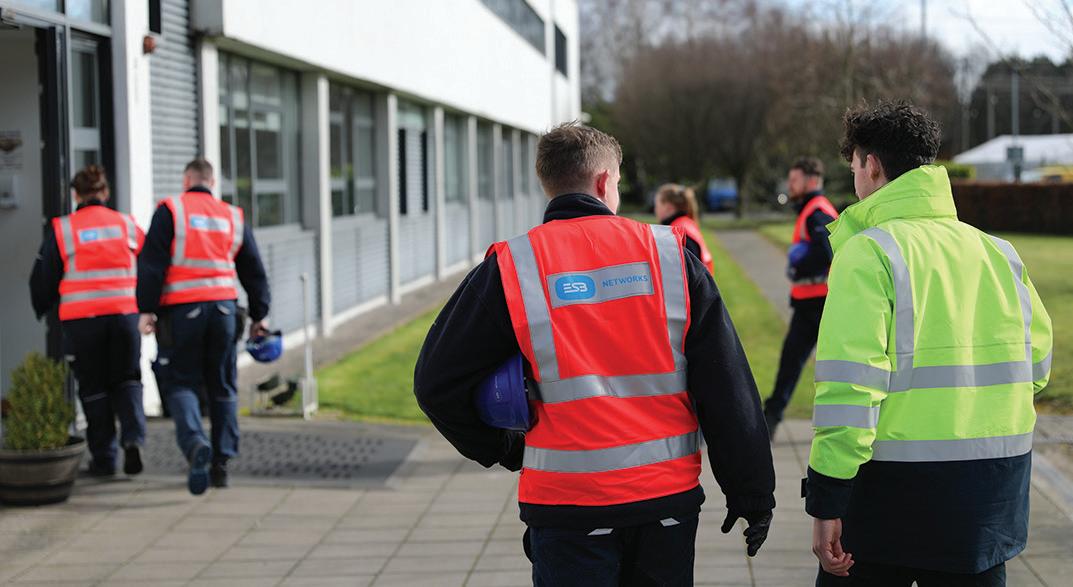
Our Customers are at the heart of ESB Networks, through their on-the-job experience, ESB Networks’ apprentices will be at the forefront in delivering and providing a world class service to our 2.4 million customers.
Although the job requires an element of physicality there is much more to the programme than climbing poles, this apprenticeship combines both physical effort and logical thinking.
No two days are the same in the programme, apprentices will be assisting and dealing with a wide range of our customers’ needs.
In their day-to-day work activities they may be responding to electrical faults and fault finding to maintain a reliable supply of electricity for our customer, connecting new customers, both residential and com-
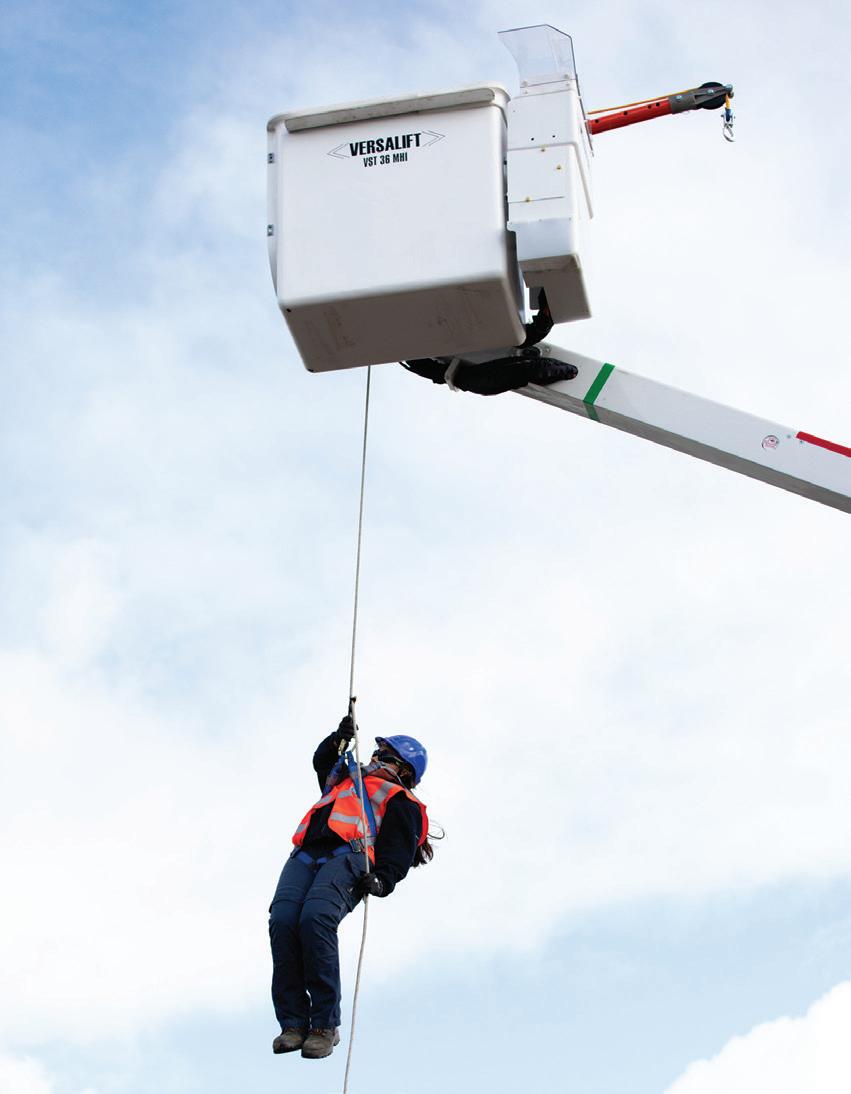
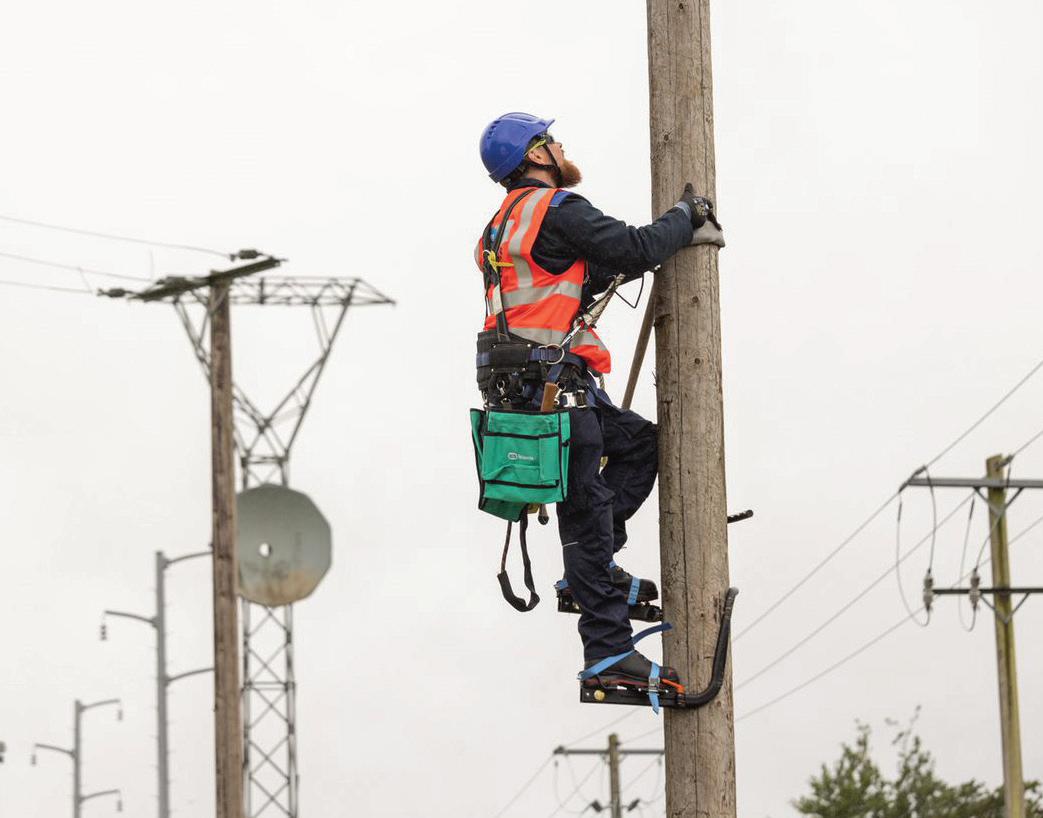
mercial to the electricity network, replacing and maintaining electrical assets and installing new elements to the electricity network both overhead and underground technologies.
A critical part of the ESB Networks Apprenticeship Programme is the training and peer support given to the apprentices. Throughout the programme apprentices work alongside and closely with experienced Network Technicians.
While the job may be challenging, the apprentice is always part of a team who will be there to assist and support throughout the programme. ESB Networks greatly fosters and encourages the idea of creating a team and peer support network.
For more information and to learn how to apply visit www.esbnetworks.ie/apprenticeships
"Although the job requires an element of physicality there is much more to the programme than climbing poles, this apprenticeship combines both physical effort and logical thinking"
THERE has been an increase in apprenticeship programmes across every sector in recent years, and with the launch of the Transport Operations & Commercial Driving apprenticeship, the transport sector is no different.
Industry heads hope that this training programme will go some way towards changing the perception of commercial driving as a profession, through creating awareness in schools by informing parents and career guidance counsellors of the varied driving roles within the freight distribution sector which offer rewarding and challenging career opportunities.
A huge difference
The programme started in September 2022 with 21 apprentices and Aidan Flynn, Chairperson of the Transport Operations & Commercial Driving Apprenticeship, says it will make a ‘huge difference to the industry’.
“This new apprenticeship will serve to be the catalyst to attract young people and vitally more women into our industry to support business growth,” he said. “The academic qualification offers validity and value to the profession of driving and it will
support career progression opportunities within the workforce.
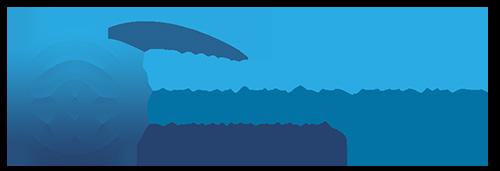
“In addition, while the average size haulage business has just over five trucks, this programme can support succession planning, with sons or daughters gaining a business qualification whilst attaining their driving licence and supporting the legacy of their family business.
“Also, having more education and training options in our sector, supported by the collaborative focus of the logistics and supply chain skills forum, will support Irelands ambitions to be leaders in supply chain and logistics.”
Great opportunity
Along with benefitting the industry as a whole, this new apprenticeship, which is delivered by ATU Sligo, is also a great opportunity for both participants and employers and since its launch, it has attracted a great deal of interest.
“An apprenticeship is a way for both young people and adult learners to earn while they learn,” said Flynn.
“The Transport Operations & Commercial Driving Apprenticeship is designed to deliver upon the industry need to attract more entrants to the profession of commercial driving, sow the seed for lifelong learning and support career progression opportunities for the apprentice through the attainment of a Level 6 Higher Certificate in Transport Services and Commercial Driving.
“For an employer, hiring apprentices helps businesses to grow their own talent by developing a motivated, skilled and qualified workforce
– and we have been inundated with enquiries from employers and potential apprentices so we hope that we will see increased numbers starting the apprenticeship year on year.”
“To avail of this ‘earn as you learn’ apprenticeship the apprentice must be in full time employment and the employer must be approved by ‘SOLAS’ as fit to train apprentices. There are many employers looking to recruit apprentices which is supported by an apprenticeship employer grant of €2,000 per apprentice per year.”
With over 40,000 Irish registered Heavy Goods Vehicles, greater than 3.5 tonnes, on the roads in Ireland, Flynn hopes that this new programme will also raise awareness of the important role commercial drivers play in today’s society as they keep supply chains, across all sectors, open and flowing smoothly.
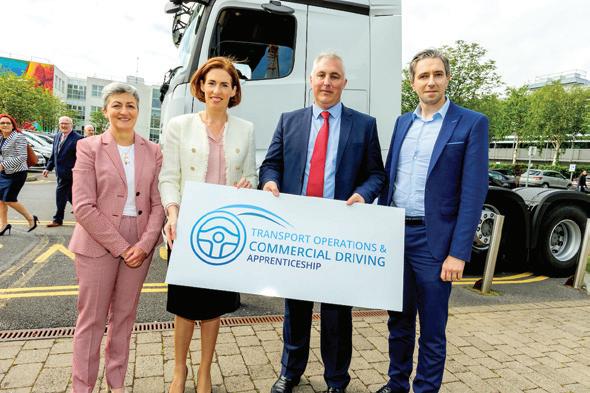
To this end, the new apprenticeship programme, which covers both practical work experience and online learning, is open to both the haulage and own account sector and covers a ‘significant variety of roles’ including working as a tipper driver for a construction company, delivering fuel to homes, national and international haulage, retail distribution, working in the waste management sector or even the entertainment industry.
“One of the main objectives of any apprenticeship programme is to support a sustainable and skilled workforce for employers and to support career progression opportunities for the apprentices,” he said. “In addition, apprenticeships sow the seed for lifelong learning which further supports and enhances the employer’s workspace and the employees’ ambitions.”
According to Flynn, the transport
"The Earn as you Learn apprenticeship offers great benefits to apprentices and employers alike. College isn’t for everyone, and these new apprenticeships offer young people the opportunities to get employment with the added benefit of earning a qualification"
and logistics sector has been less successful than others in recruiting younger workers over the years due to many factors ‘including a perception that it is made up of predominantly low skilled jobs required to work long hours’.
This, along with a lack of diversity within the profession, is another reason why this new programme is essential.
“According to Road Safety Authority data, there are over 200,000 Heavy Goods Vehicle licences issued in Ireland and only 2% are issued to women in both C & CE category - this must change,” he said.
“Another concern is that over 60% of HGV full licences holders are over the age of 50 – so the importance of training and education in shaping the image of driving as a profession and attracting younger people into the profession cannot be understated.


“The Earn as you Learn apprenticeship offers great benefits to apprentices and employers alike. College isn’t for everyone, and these new apprenticeships offer young people the opportunities to get employment with the added benefit of earning a qualification on the national framework of qualifications at the same time.
"The Transport Operations and Commercial Driving apprenticeship is unique in that it is a fully funded academic qualification as well as covering the costs of HGV driving lessons and driving tests. So, the apprentices will qualify with a higher certificate in Transport Operations and Commercial Driving as well as a Full C & CE Category Driving licence and DRIVER CPC qualifications.
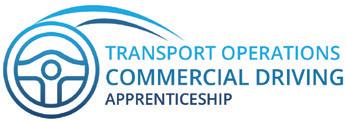
For more information visit www.cdap.ie, email info@cdap.ie or call 018447516

The Transport Operations & Commercial Driving Apprenticeship provides the academic qualification and practical training and work experience that supports a vibrant and exciting career in the freight distribution and logistics sector. Apprentices will also receive expert driving lessons and training in advance of completing their C/CE driving test and attaining the Driver CPC qualification.
The academic award for this apprenticeship is a Higher Certificate (NFQ level 6) in Business in Transport Services and is the first qualification on the national framework of qualifications (NFQ) linked to the profession of commercial driving!
✔ QQI Level 6 Award ‘Higher Certificate in Transport Operations & Commercial Driving’.

✔ Internationally recognised qualification.
✔ Earn as you Learn.
✔ Two year employment contract leading to permanent position.
✔ Gaining valuable on the job experience and workplace skills.
✔ Excellent Career Opportunities in the vibrant sector.
• Hold a Full ‘B’ Driver Licence.
• Be at least 18 years of age.
• Meet medical requirements for driving.

✔ Attracts new entrants into the business.
✔ Increases pool of qualified people within the business.
✔ Help with succession planning.

✔ The programme is built around work related experience and work specific projects.



✔ Apprenticeship State Grant for employers of apprentices €4,000 funding.


• Minimum entry requirements are a grade H7/O6 or above in five Leaving Certificate (or equivalent) subjects. A minimum of grade O6 must be obtained in English. A minimum of grade O6 or a B2 or above in Foundation level must be obtained in Mathematics.
• Holders of a QQI Level 5 or Level 6 (or equivalent) in cognate areas (eg business, logistics and distribution, supply chain management, etc.) can apply for entry onto year 1 of the programme.
• A mature candidate, over the age of 23, who does not hold qualifications as set out above, but who: Has a minimum of two years’ experience working as a commercial driver. Is recommended by their employer.
Demonstrates the correct attitudes, behaviours and literacy skills.
The Coordinating training and education provider for this apprenticeship programme is Atlantic Technological University Sligo (ATU Sligo)


The lead proposer us the Freight Transport Association Ireland (FTAI)
Twitter: @commdriver1 www.cdap.ie Tel: 01 8447516
The CPL will enable a pilot to fly for hire or reward, which is not allowed on a PPL. 100 hours PIC is a prerequisite before you can start the CPL and the course takes 25 hours. 5 hours of which may include the night rating.
The course is broadly similar to the PPL and just involves flying more accurately. A greater emphasis is placed on navigation and emergency procedures. After all, people will be
paying you to fly so they expect to get to their destination quickly and safely.
From December 2019, Upset Prevention and Recovery Training became a mandatory part of the training to become an airline pilot. The course, which takes 5 hours, requires a student to experience upsets in an aircraft such as nose high, nose low and inverted manoeuvres. The concept is to expose students to the physiological effects of aircraft upsets including positive and negative g.
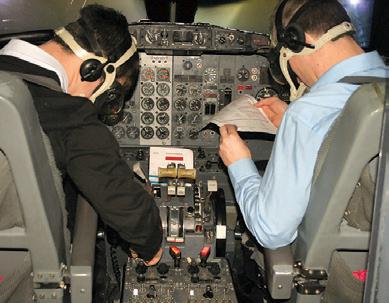
It’s slightly different to aerobatics which involves flying intentional manoeuvres – UPRT involves recovering from unintentional aircraft upsets which can be surprising and startling.
The MCC Course is the last qualification you will need before you can apply to an airline. The course is simulator and classroom based and includes no flying. It usually lasts five to seven days.
The classroom work focuses on
"The course is broadly similar to the PPL and just involves flying more accurately. A greater emphasis is placed on navigation and emergency procedures. After all, people will be paying you to fly so they expect to get to their destination quickly and
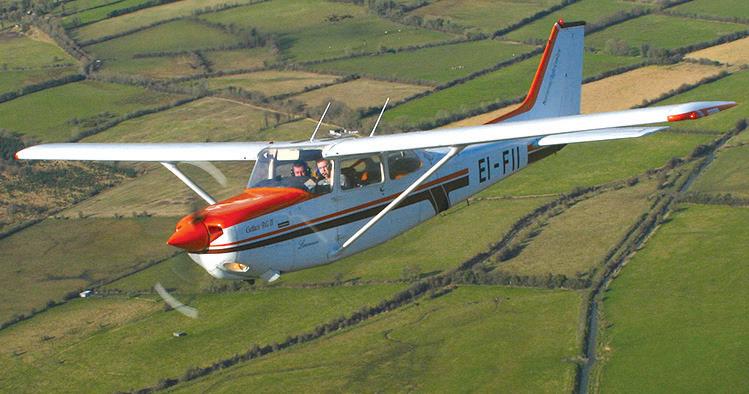
crew cooperation, cross cockpit communication, crew resource management etc. A big emphasis is also placed on operational procedures. The simulator segment is used to demonstrate the skills picked up in the classroom. Most simulators used for the MCC Course are based on the popular twin jet models such as the Boeing 737 or Airbus A320 but this will vary depending on the training organisation you choose. Simtech Aviation, AFTA and Airline Flight Academy are approved MCC providers in Ireland.
You may see some organisations offering an APS MCC – this is an Airline Pilot Standards MCC. It’s not a requirement for airlines at the moment but is certainly viewed favourable and is fast becoming industry standard. The additional hours on this course focus on operating swept wing jet aircraft including handling and high altitude upsets.
The APS MCC usually uses airline orientated Standard Operating Procedures. There is also some additional groundschool which focuses on airline specific operations.
The last piece of the puzzle! Modern commercial aircraft are large and have complex systems and no amount of general pilot training will focus on the complexity of a single aircraft type. Consequently a type rating is required for each type of jet you wish to fly.
Type ratings generally cost between €20,000 to €35,000. Sometimes this cost is borne by the applicant, sometimes by an airline. Type rating courses will vary from type to type but the Boeing 737NG Type Rating consists of four weeks ground school followed by six weeks simulator training and finally aircraft training. Most TR’s will follow this format.


Aircraft training is the only chance you will get to fly the aircraft prior to carrying passengers. You need to be able to demonstrate your proficiency by completing 6 take offs, 6 landings and a go-around. The Type Rating is usually undertaken after you ‘provisionally’ get a job with an airline. I say provisionally because if you don’t pass the course you don’t get the job but I’ll explain more later on.
The modular route allows you to do all of your training at your own pace and allows you some flexibility within your training. It basically means that each of the elements of your training are treated as separate items and don’t necessarily need to be completed in that order or immediately after each other.
You don’t even need to complete each step at the same school however there are benefits to staying with the one school, especially in the latter stages of training.
The first step is to obtain your PPL. This can be done in Ireland, UK, Spain, US, pretty much anywhere although it will make the process easier if you are issued with an EASA PPL (European). As you know this
takes 45 hours, so for argument's sake let’s say you come out with 55 hours, of which 10 hours are solo. You need a further 90 hours solo if you want to start the CPL or 60 hours to start multi engine flying.
Where you build these hours is your choice, remember most countries issue an ICAO PPL which is recognised worldwide (you may need to do some paperwork though!). If you’re in no rush you can stay in Ireland and just bring friends and family flying at the weekend.
At this stage it might be a good idea to start thinking about the ATPL theoretical knowledge exams. Most people doing a modular course choose to do the course through distance learning. The school you choose will send you the books and study material and a schedule. It’s up to the student to keep up to the schedule which usually requires around 15 hours study per week.
Regular online tests will help you monitor your progress and a tutor is usually allocated to you who can be contacted through email. Prior to the exams a residential course is run, usually for a week or two. You attend the school and practice mock exams. This also gives you an opportunity to ask questions on concepts you don’t understand.
A full time residential course is also available from some schools, with lectures every day. Although you’ll progress through your exams quicker it often costs two to three times the price of the distance learning course. This decision will also be affected by your discipline to self-study. No matter which type you choose you’ll come out with the same piece of paper. When you pass your last exam the clock starts ticking and you will have 36 months to obtain a CPL and Instrument Rating or face repeating the exams.
The night qualification can be completed anytime between the PPL and commencement of the CPL or IR. Although it’s only 5 hours long, it can be difficult in Ireland to get good weather, a suitable aircraft, an instructor and a suitable airport at the same time! The best idea is to get the ball rolling on this as soon as you finish your PPL and expect to take a few months to get your ducks lined up. If you do your PPL abroad I’d highly recommend doing a night qualification either during it or immediately after, it will make life a bit simpler.
Ok, so a few weeks (or months) later you have your 70 hours solo or Pilot in Command (PIC), all 14 theoretical exams out of the way and a
night qualification. Now you have the minimum requirements to start the Instrument Rating. You also have the choice to do an extra 30 hours PIC and start the CPL first if you want. That is the beauty of the modular course, you have control of the process. In this scenario I’ve picked the IR first as this will get you through the licences in fewer hours and hopefully less money.
As you probably intend flying commercially for the airlines, you can jump straight in and do the multi engine instrument rating (MEIR). The regulations do require that you have undertaken training on a multi engine aircraft before you start the instrument segment so you’ll need to fly 8 hours in a multi aircraft to satisfy this requirement. This is called the class rating training. You can do the flight test for this part with the instrument flight test later on. You can now complete the instrument training as outlined above.
So let’s take a look at where we are. 55 hours for the PPL, 5 hours for the Night Qualification, 60 hours solo, 8 hours multi engine training, 15 hours multi engine instrument training (simulator time doesn’t count as flight time!) and maybe two hours for the MEIR flight test. That makes 145 hours, not bad. But you need 200 hours before you can sit a CPL flight test. I did say above that the CPL requires 25 hours, but as you now have an MEIR, the requirement reduces to 20 hours. This only leaves us with 165 hours, 35 hours short of the minimum, so what can you do? In reality you’ll find that your training will run over the minimums here and there. You will also need to complete the new 5 hours of UPRT.
So now you have a shiny new CPL, with MEIR and a shade over 200 hours. Now you need an MCC Course. There’s nothing much to add to what I’ve mentioned already above. Simtech Aviation, AFTA and Airline Flight Academy provide MCC Courses in Ireland. If you’re training abroad there are a host of options.
"The modular route allows you to do all of your training at your own pace and allows you some flexibility within your training"
"Regular online tests will help you monitor your progress and a tutor is usually allocated to you who can be contacted through email"
"In reality you’ll find that your training will run over the minimums here and there"The APS MCC is slowly becoming industry standard. It is a much higher quality MCC, with minimum simulator standards. It also prepares the student much better for airline operations, and importantly, will prepare you much better for an airline simulator assessment. The ATPLs are hard work but it’s worth it for an office like this
Looking for tech related programmes to develop your students' digital skills and literacy?
FIT offer a range of FREE programmes suitable for schools, educators, students, career changers and anyone with an interest in technology.
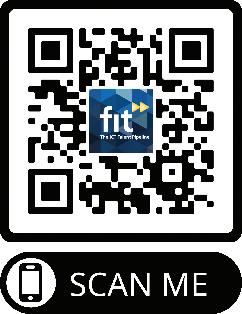
Through our programmes and courses, you will:
Increase your digital skills & literacy
Develop confidence in tech

Gain awareness of Tech Career Pathways
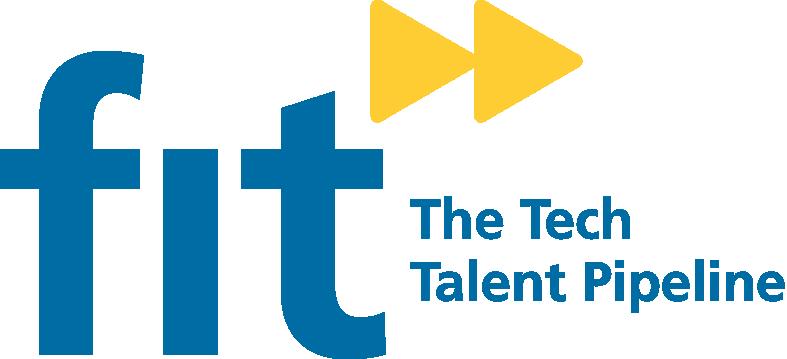
Earn a Qualification
Progress to a tech career
FOR over 20 years, FIT or Fastrack to Information Technology is a representative organisation of the technology sector committed to growing Irelands tech talent pipeline.
Our mission is to promote inclusion and diversity through our programs and courses, creating wider access to tech skills training which leads to exciting career paths and quality employment opportunities for anyone who has a curiosity and passion for
FIT will work with you and your students to grow more confident with tech, develop digital skills & literacy, upskill and increase awareness of opportunites in the tech sector for progresssion to a tech career.
Our experienced team of Tech Employment Officers are on hand to assist FIT participants through the duration of their course to employment and a desired career path established.
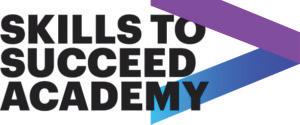
– Educators / TY, 5th, 6th Year & LCA
Choose Tech is a fun, online platfrom with 70+ modules that support & inspire students to learn about the world of technology, grow confidence with tech and help them consider tech as a career option and the pathways to achieve this such as tech apprenticeships.
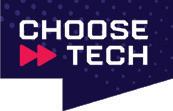
Near Peer Engagements – Career Work Shops – Educator Support Resources
– Micro-Credential Certification - Bronze, Silver & Gold Awards Levels

Highly interactive online training program with 36 bite sized career development modules to help learners build the skills and confidence they need to make smart career choices to find and succeed in employment. We can help you plan your career, get a job and build skills for the future with this free and interactive training.
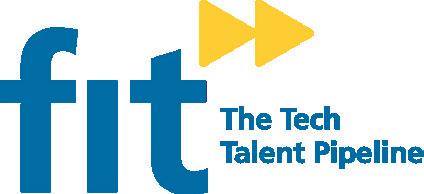
StepIn2Tech is a digital skills training programme developed by Microsoft Ireland, in partnership with FIT, to equip people with the digital skills required to transfer to emerging and in-demand roles within the digital economy. Learners are provided with sought after technical skills that will open up a range of new opportunities – from further training and education to gain an entry level role in the growing technology sector, to helping to drive digital transformation in a traditional sector. Learners will benefit from an engaging and supportive online learning platform guided by a dedicated mentor, a Digi-Chaperone.

A local training initiative programme targeting youth unemployment with a training centres located in Dunshaughlin and Ballina offering Advanced Manufacturing L4 courses and ICT introductory programmes.
30,000+ Completed Courses
Our School Programme team offer support to educators and guidance counsellors to help increase access and inclusion for young people into the tech sector. We will work with you to enable young job seekers to meet the rapidly changing labour market and digitalised economy. Through our programmes, students will learn about the world of tech and the pathway options to a tech career such as a Tech Apprenticeship.
Pre-tech apprenticeship is a 9-month full time programme that showcases tech roles and provides skills sampling in growth areas such as Software Development, Network Engineering and Cyber Security. On completion of the course you receive Level 5 Certification and can progress to a Tech Apprenticeship.
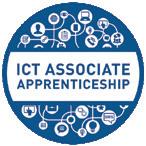
The FIT Tech Apprenticeship programme is accredited at Level 6 on the National Framework of Qualifications (NFQ). The portfolio of apprenticeships includes Software Development, Network Engineering and Cybersecurity. This national Tech Apprenticeship course is a 2 year programme which adopts a learning-by-doing format of ICT skills development, giving meaning to the concept of ‘hire education’. The trainees combine off-the-job skills training with on-the-job application for a well-rounded learning experience. On successful completion of the programme, qualified apprentices have the potential to progress into full-time positions with their employers

Supported by WEEE Ireland and the White Goods Association, FIT offers training in white good electrical repair to prolong the life cycle of white goods and create a steady supply of qualified field technicians (QQI L6) with regard to maintenance, repair and recycling.
Open to all candidates interested in a career prolonging the life cycle of white goods in the interest of sustainability, reduced waste, and environmental wellbeing.
22,500+ Employed 250+ Sponsor Companies
- Mechanical Engineering
- Electrical Engineering
- Quantity Surveying
- Accounting
- Procurement
- Competitive salaries
- Opportunities to work abroad
- Study and exam leave paid
- Team building events
- Course fees paid
- In-house training
- Site rotation
- Professional bodies fees paid
- Great social network
- Internal courses
- Continuous Professional Development (CPD)
A proven self-starter with drive and determination, the ability to work as park of a team and excellent communication skills. You have the ambition to pursue a challenging career with opportunities to develop your skills and experience.
- Earn while you learn
- QQI Level 6 qualification (internationally recognised)
- Both theory & practical “hands on” experience
- Career for life
- Opportunities to work overseas
- Opportunities to progress your career
Jones Engineering are the largest trainer of construction apprentices in Ireland with 250+ apprentices in our employment annually.
We are proud to say we have had two gold medal winners in the World Skills competition and one bronze medal winner in the Ireland Skills competition. Such competitions require skill and determination and we encourage and mentor our apprentices to become the best in their field.
- Electrical
- Electrical & Instrumentation
- Plumbing
- Pipefitting
• Minimum of four passes at leaving certificate level (must include mathematics)
• Successfully pass the Ishihara Colour Vision Test
• Valid manual handling & safepass certificates
KNOWLEDGE BREADTH
Elementary knowledge
KNOWLEDGE KIND
Demonstrable by recognition or recall
Knowledge that is narrow in range
Knowledge moderately broad in range
Broad range of knowledge
Broad range of knowledge
Specialised knowledge a broad area
KNOW-HOW & SKILL RANGE
Demonstrate basic practical skills and carry out directed activity using basic tools
KNOW-HOW & SKILL SELECTIVITY
Concrete in reference and basic in comprehension
Mainly concrete in reference and with some comprehension of relationship between knowledge elements
Mainly concrete in reference and with some elements of abstraction or theory
Some theoretical concepts and abstract thinking, with significant depth in some areas
Some theoretical concepts and thinking, with underpinning
COMPETENCE CONTEXT
Demonstrate limited range of basic practical skills, including the use of relevant tools
Demonstrate a limited range or practical and cognitive
Demonstrate a moderate range of practical and cognitive skills and tools
Demonstrate a broad range of specialised skills and tools
Demonstrate comprehensive specialised skills tools

COMPETENCE ROLE
Perform processes that are repetitive and predictable
Perform a sequence of routine tasks given clear direction
Select from a limited range of varied procedures and apply known solutions to a limited range of predictable problems
Select from a range of procedures and apply known solutions to a variety of predictable problems
COMPETENCE
Act in closely defined and highly structured contexts
Act in a limited range of predictable and and structured contexts
Act within a limited range of contexts
Act in familiar and unfamiliar contexts
COMPETENCE
Act in a limited range of roles
Act in a range of roles under direction
Act under direction with limited autonomy; function within familiar, homogeneous groups
Act with considerable amount of responsibility and autonomy
Evaluate and use information to plan and develop investigative strategies and to determine solutions to varied unfamiliar problems
Act in a range of varied and specific contexts, taking responsibility for the nature and quality of outputs; identify and apply skill and knowledge to a wide variety of contexts
Exercise some initiative and independence in carrying out defined activities; join and function within multiple, complex and heterogeneous groups
Formulate responses to well-defined abstract problems
Act in a range and specific involving creative non-routine activities; transfer and theoretical concepts or technical or skills to a range contexts
Exercise substantial personal autonomy often take responsiblity for the work of and/or for the of resources; and function multiple, complex heterogeneous
Learn to evaluate learning and needs
assist
identifying
Assume partial responsibility for consistency of self-understanding and behaviour
Assume full responsibility for consistency of self-understanding and behaviour
Express an internalised, personal
reflecting
with others
Specialised knowledge of a broad area
Specialised knowledge across a variety of areas
An understanding of the theory, concepts and methods pertaining to a field (or fields) of learning
A systematic understanding of knowledge, at, or informed by, the forefront of a field of learning
A systematic acquisition and understanding of a substantial body of knowledge which is at the forefront of a field of learning
KNOWLEDGE BREADTH
theoretical and abstract with significant some areas
Some theoretical concepts and abstract thinking, with significant underpinning theory
Recognition of limitations of current knowledge and familiarity with sources of new knowledge; integration of concepts across a variety of areas
Detailed knowledge and understanding in one or more specialised areas, some of it at the current boundaries of the field(s)
A critical awareness of current problems and/or new insights, generally informed by the forefront of a field of learning
The creation and interpretation of new knowledge, through original research, or other advanced scholarship, of a quality to satisfy review by peers
KNOWLEDGE KIND
a broad specialised skills
Demonstrate comprehensive range of specialised skills and tools
Demonstrate specialised technical, creative or conceptual skills and tools across an area of study
Demonstrate mastery of a complex and specialised area of skills and tools; use and modify advanced skills and tools to conduct closely guided research, professional or advanced technical activity
Demonstrate a range of standard and specialised research or equivalent tools and techniques of enquiry
Demonstrate a significant range of the principal skills, techniques, tools, practices and/ or materials which are associated with a field of learning; develop new skills, techniques, tools, practices and/or materials

KNOW-HOW &
RANGE use to plan and investigative and to solutions unfamiliar
range of varied contexts, responsibility for and quality identify and and knowledge variety of
some initiative independence in defined join and within complex and heterogeneous groups
Formulate responses to well-defined abstract problems
Act in a range of varied and specific contexts involving creative and non-routine activities; transfer and apply theoretical concepts and/ or technical or creative skills to a range of contexts
Exercise substantial personal autonomy and often take responsiblity for the work of others and/or for the allocation of resources; form, and function within, multiple, complex and heterogeneous groups
Exercise appropriate judgement in planning, design, technical and/ or supervisory functions related to products, services, operations or processes
Utilise diagnostic and creative skills in a range of functions in a wide variety of contexts
Accept accountability for determining and achieving personal and/ or group outcomes; take significant or supervisory responsibility for the work of others in defined areas of work
Exercise appropriate judgement in a number of complex planning, design, technical and/or management functions related to products, services, operations or processes, including resourcing
Use advanced skills to conduct research, or advanced technical or professional activity, accepting accountability for all related decision making; transfer and apply diagnostic and creative skills in a range of contexts
Act effectively under guidance in a peer relationship with qualified practitioners; lead multiple, complex and heterogeneous groups
Select from complex and advanced skills across a field of learning; develop new skills to a high level, including novel and emerging techniques
Respond to abstract problems that expand and redefine existing procedural knowledge
Act in a wide and often unpredictable variety of professional levels and ill defined contexts
Exercise personal responsibility and largely autonomous initiative in complex and unpredictable situations, in professional or equivalent contexts
Take significant responsibility for the work of individuals and groups; lead and initiate activity
Communicate results of research and innovation to peers; engage in critical dialogue; lead and originate complex social processes
COMPETENCE ROLE responsibility for within a environment
Learn to evaluate own learning and identify needs within a structured learning environment; assist others in identifying learning needs
Take initiative to identify and address learning needs and interact effectively in a learning group
Learn to act in variable and unfamiliar learning contexts; learn to manage learning tasks independently, professionally and ethically
Learn to self-evaluate and take responsibility for continuing academic/ professional development
Learn to critique the broader implications of applying knowledge to particular contexts
responsibility consistency of self-understanding and
Express an internalised, personal world view, reflecting engagement with others
Express an internalised, personal world view, manifesting solidarity with others
Express a comprehensive, internalised, personal world view manifesting solidarity with others
Scrutinise and reflect on social norms and relationships and act to change them
Scrutinise and reflect on social norms and relationships and lead action to change them


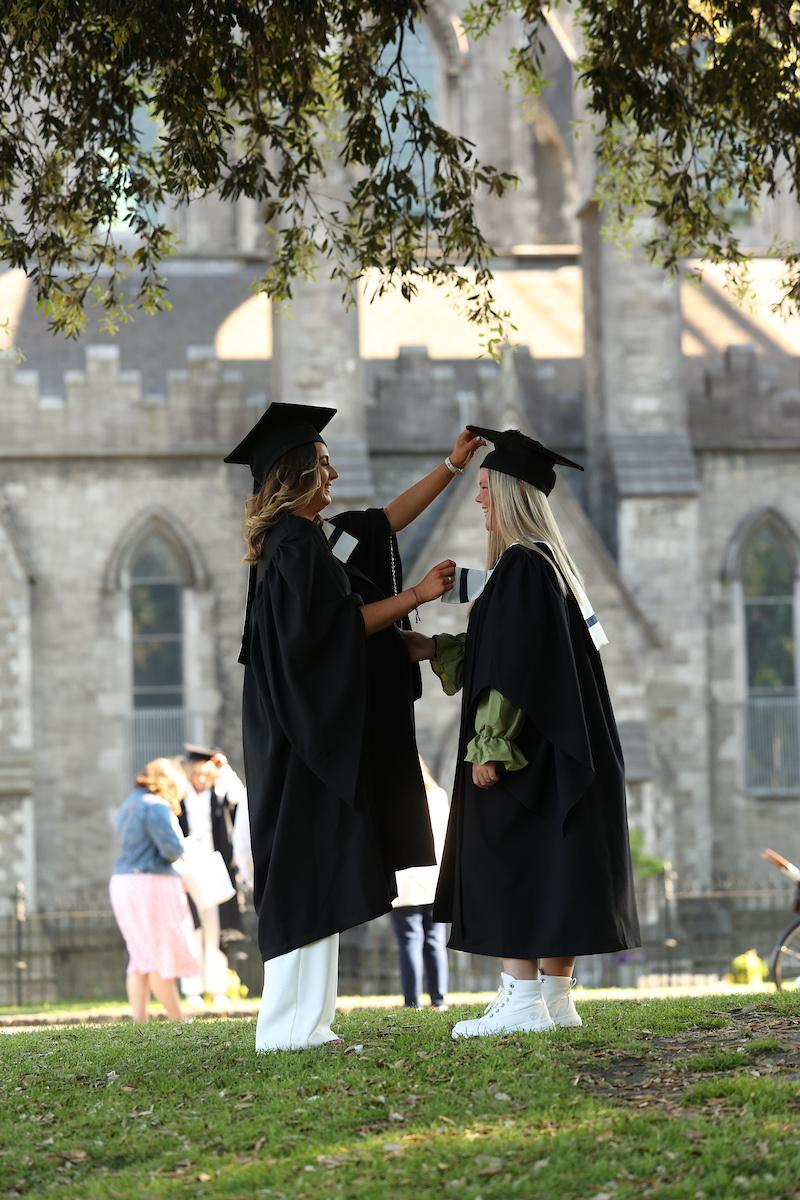
On 31st May we celebrated our end of year GRADUATION in St. Patrick's Cathedral. As we say goodbye to our graduates we look forward to welcoming our new intake of students onto courses in healthcare, technology, media, pharmacy retail, childcare, education, travel and tourism, textiles, art, interior design, performance, social care, social studies, youth work, liberal arts and our Trinity Access Programme. NEW COURSES for 2023/24 include Sustainable Interior Design, Ethical Hacking, App Design, Healthcare Assistant - Mental Health Studies, Foundation Building for Third Level Success (Education and Training) and Keyworker (Foundation Skills) Our current graduates are moving on to third level or employment and some will stay with us for their Level 6 year. The big news announced recently is that all PLC courses in Liberties College are €50 for 2023/24.
Situated within 10 minutes’ walk of Grafton Street, Liberties College welcomes students from all over Dublin and beyond, both school leavers and mature learners, looking to prepare for progression and/or work. No points required apply online at libertiescollege.ie for courses starting September 2023. For course advice call into the College week commencing 28th August Monday - Friday 10 a.m. - 4 p.m.
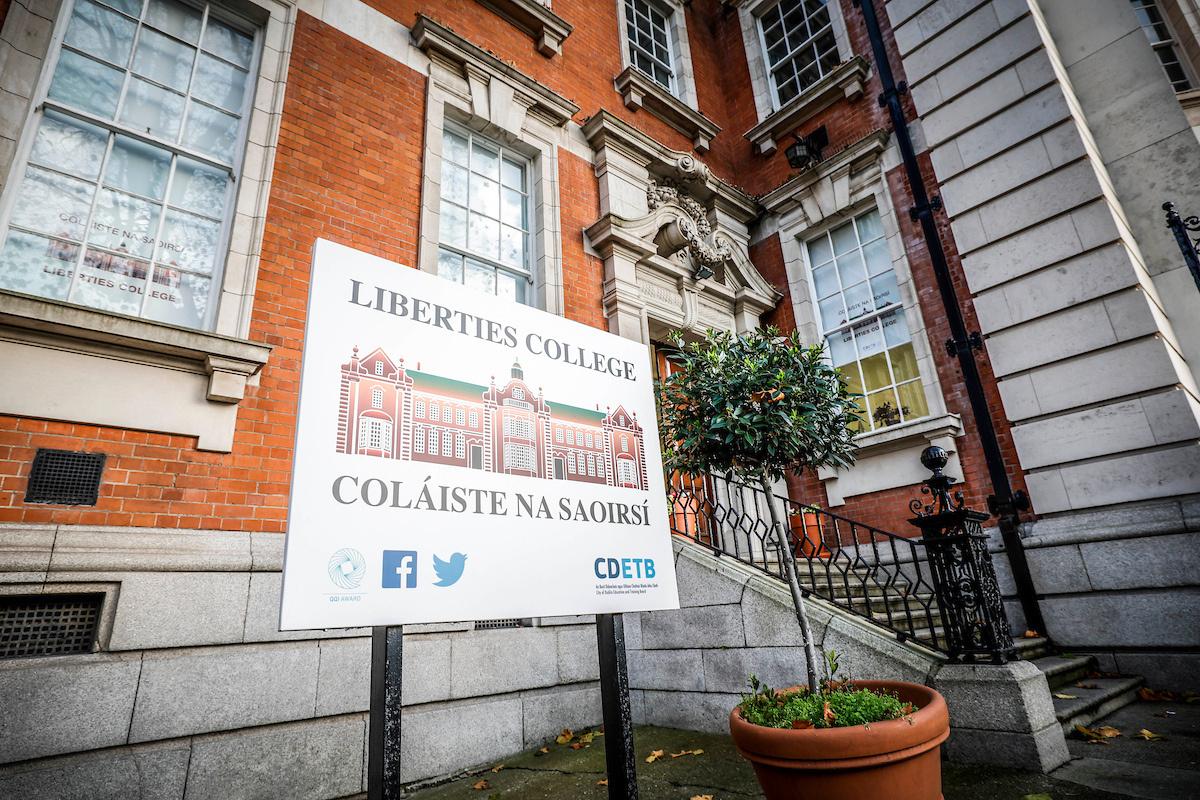
RATHMINES College are ready to welcome new students to new and existing courses all starting in September ’23.
The Further Education college, in the heart of Rathmines, has new QQI Certificate courses in Environmental Studies with Business, HR Administration and Social Media and PR running alongside their wellestablished courses in Arts and Social Science, Business and Marketing, Software Development, Legal Studies, Media, Office Administration and Professional Accounting. And what also stands out when applying to Rathmines College is the course fee of just €50 for all QQI and Professional Accountancy courses.
Courses that are particularly popular for the academic year ahead are Pre-University Law, Digital News and Media alongside the great choice of Business and IT courses.
The Rathmines College websitewww.rathminescollege.ie - is the starting point to apply for all courses.

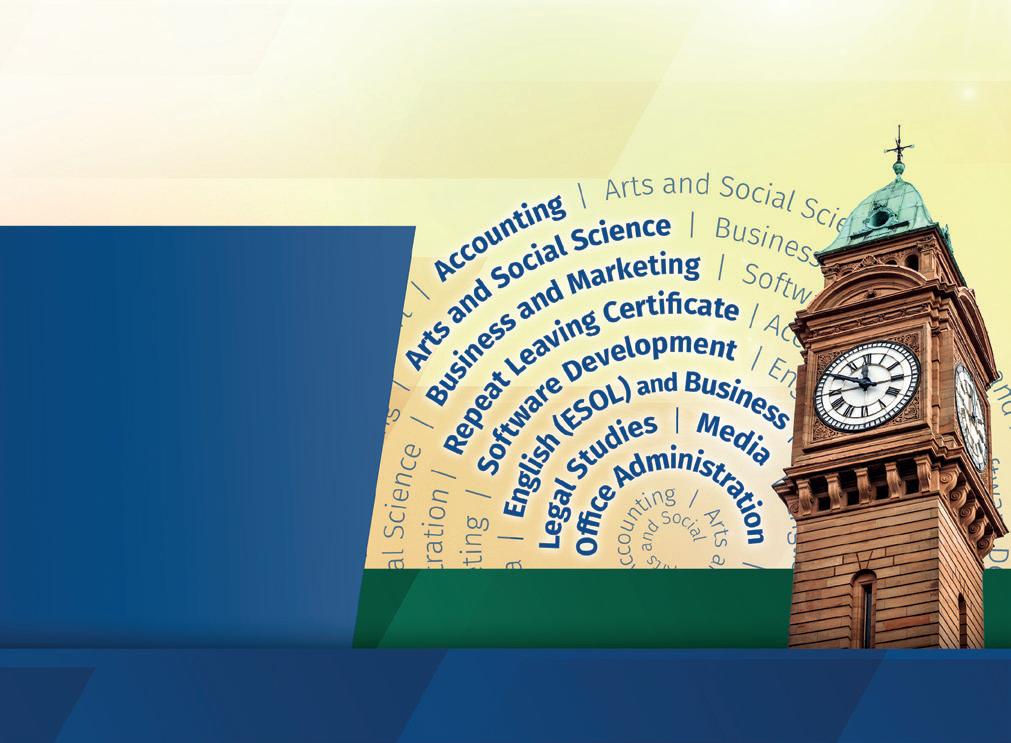
Students who study in Rathmines College benefit from the vibrant learning environment, low registration fees of just €50, student supports and grants. The college also offers excellent education and employment progression opportunities following graduation.
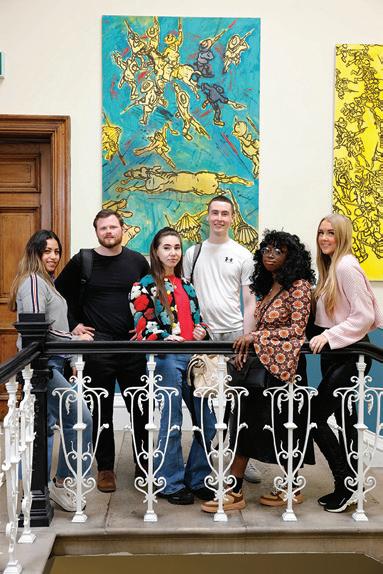
Education progression routes include Trinity College, UCD, DCU,
TU Dublin and Maynooth University with many of the students who graduated in June ’23 now on course to start exciting higher education degrees in these universities.
A recent graduate says of the college: "I really enjoyed my time studying in Rathmines College, all the teachers were so supportive and helpful throughout the year. I couldn't have chosen a better place to study my QQI Level 5 and I look forward to the opportunities that come my way in the future."
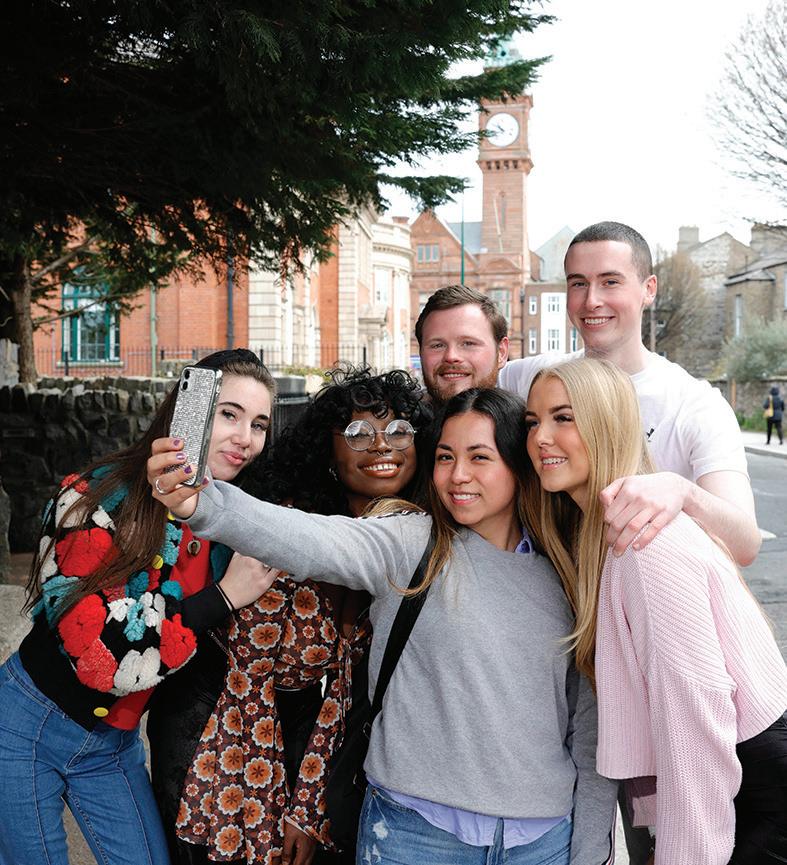
Apart from over 30 QQI Level 4 and 5 courses, this City of Dublin ETB college also offers a selection of wellestablished QQI Advanced Level 6 courses in Business, Office Administration, News and Media and Software Development. Again, these are one-year full-time courses and are an excellent way to progress to 2nd year in many third level colleges, for example TU Dublin, IADT and NCI.
Repeating the Leaving Cert
Rathmines College has been offering a one-year Repeat Leaving Certificate for close to 45 years. With the repeat course fee of just €300, or €173 for students with a Medical Card, students and parents can rest
• Student grants and supports available
•
•
• Exciting new courses starting in September
• Repeat Leaving Certificate just €300
• QQI and Professional Accountancy Course Fees from just €50
assured they are getting the best value for money alongside excellent teaching experience and college resources to secure high success rates for the Leaving Certificate in June 2024.
To Go Further with Rathmines College and learn more about courses, student life and progression routes click and apply on www.rathminescollege.ie or email info@rc.cdetb.ie
"I couldn't have chosen a better place to study my QQI Level 5 and I look forward to the opportunities that come my way in the future."
TRAINING Services at Kilkenny and Carlow ETB offer an extensive range of free full time training programmes for young people and adults who wish to develop the skills and competencies that are required for the workplace and/or progression to further education and training opportunities.
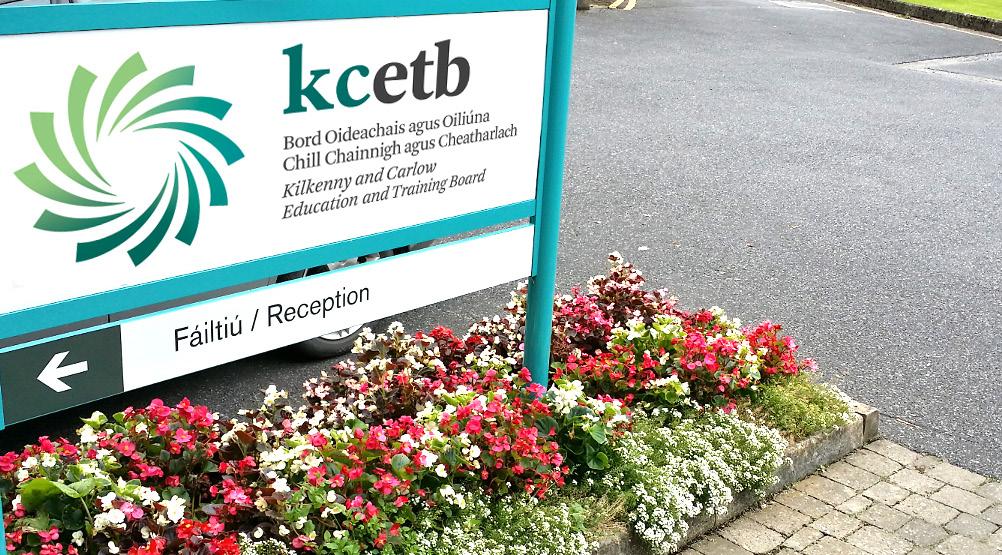
All of our courses lead to nationally and internationally industry recognised accreditation. Furthermore, many of our courses lead directly into employment.
A Traineeship is an occupational skills development programme which is designed to provide flexible training solutions to the identified needs of Irish industry and local businesses.
Traineeships gives participants the opportunity to develop cutting edge skills and knowledge on-the-job, making them more skilled, more employable and enhancing their career options and enables employers to access a pipeline of talent and learners.
Traineeships are structured learning programmes which lead to awards at NFQ levels 4-6. They are between 6-20 months in duration and learners will complete at least 30% of learning on the job.
For further information visit www.traineeship.ie
The SOLAS Standards Based Apprenticeship is a system of employment focused training and education which enables an individual to obtain the knowledge, skills and competencies required to perform effectively as a craft person in industry.
It also enables the individual to progress through further education and training within the national framework of qualifications leading to a QQI level 6 Advanced Craft Certificate.
Apprenticeship has long been an accelerator for individual and corporate development in Ireland. Generation Apprenticeship is a major expansion project to more than double the number of learners of all ages and backgrounds taking the apprenticeship route.
This promises to be a huge source of inspiration in opening apprenticeship into a full range of twenty-first century industries and skill sets.
SOLAS has the responsibility for promoting and overseeing the training and education of all the apprentices in the current 27 designated crafts.
A national standard is delivered for each craft based on the occupational analysis of that craft, written as key learning outcomes and structured in modular format.
New Apprenticeships will combine practical on-the-job learning in com-
of our courses lead to nationally and internationally industry recognised accreditation. Furthermore, many of our courses lead directly into employment"
The 26 designated crafts are as follows:
• Agricultural Mechanics *
• Aircraft Mechanics *
• Brick and Stonelaying
• Carpentry & Joinery
• Construction Plant Fitting *
• Electrical *
• Electrical Instrumentation *
• Electronic Security Systems *
• Farriery
• Heavy Vehicle Mechanics *
• Industrial Insulation
• Instrumentation *
• Metal Fabrication
• Motor Mechanics*
• Painting & Decorating *
• Pipefitting
• Plastering
• Plumbing *
• Print Media *
• Refrigeration & Air Conditioning *
• Stonecutting & Stonemasonry
• Sheet Metalworking
• Toolmaking
• Vehicle Body Repairs *
• Wood Manufacturing and Finishing
• Mechanical Automation and Maintenance - MAMF *
* A person wishing to become an apprentice in one of the trades marked * must pass a colour–vision test approved by SOLAS.
"All



panies, with off-the-job training, which will be delivered by the ETBs and/ or recognised training and education providers. This will allow Apprentices to develop technical knowledge through formal qualifications, as well as key workplace skills and competencies through experiential learning.
The programmes lead to QQI awards from level 5 to 9 on the NFQ. The duration of these apprenticeships range from two to four years, depending on the chosen field of learning and the degree of difficulty involved in meeting the learning outcomes for the particular apprenticeship programme.
The community Training centres (CTC’s) provide training to early school leavers aged between 16 and 21 years, who are most in need of basic vocational training. This training provision is divided between in centre learning and linked work experience. Courses lead to Major awards at QQI Level 3 and 4 or VTCT awards.
New Apprenticeships are currently available and are being developed in conjunction with SOLAS and lead industrial consortia across a wide range of industries and sectors, some of which include:


• Accounting Technician, Level 6
• Industrial Electrical Engineer, Level 7
• Commis Chef, Levels 6
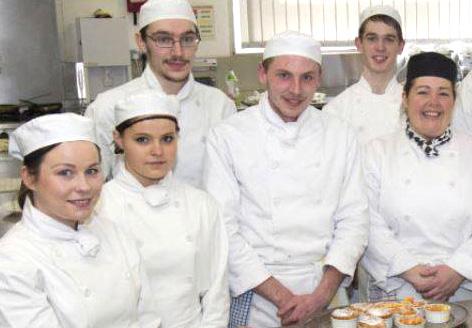
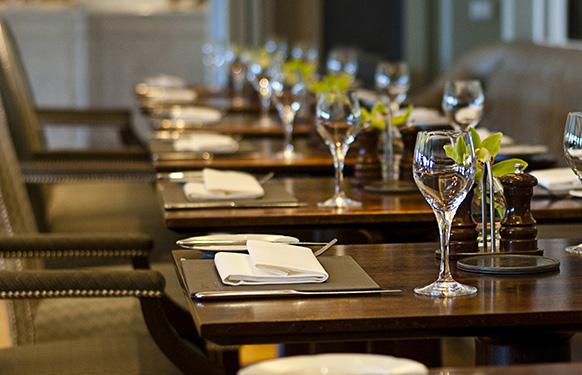
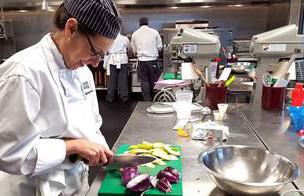
• Financial Services, Levels 6-8
• Insurance Practitioner, Level 8
• Manufacturing Engineer, Level 7

• Polymer Processing Technologist, Level 7
• Manufacturing Technician, Level 7

• ICT Network Engineer, Level 6
• ICT Software Developer, Level 6
Our Contact Details: Office: Training Services, Kilkenny and Carlow ETB, Unit 4 Danville Business Park, Kilkenny. Tel: 056 7813014

www.kcetbtraining.ie Training Centre: Unit K, IDA Business Park, Purcellsinch, Dublin Road, Kilkenny. Tel: 056 789456


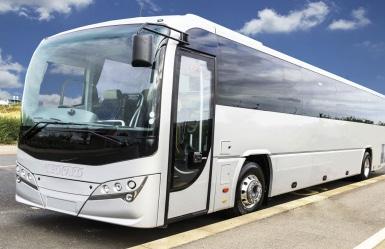
Education has been providing a quality educational experience to students in South Dublin and beyond for 6 years.
Located on Crumlin Road, its close proximity to Dublin Bus and Luas services makes it an ideal location for students. A range of QQI courses are offered at Level 5 and Level 6 in the schools of Hairdressing , Beauty , Fashion, Fitness & Sports Therapy, Information Technology, Business, Administration & Accounting , Tourism, Catering.
In addition, a range of night courses are offered at its Evening School. Here’s just a flavour of what’s on offer at Crumlin College….
The Fashion Department in Crumlin College offers industry focused courses that reflect the current and future staffing requirements of the business and creative sectors of the fashion industry. Students can choose between the QQI Level 5 course in Fashion Buying & Merchandising or Fashion Design with Styling. Both courses offer students a comprehensive understanding of their chosen field as well as a rounded perspective on the fashion industry as a whole.
The college has established close links with a network of professionals within the fashion industry. Research field-trips for college assignments are organised throughout the academic year and are enjoyable and valuable learning experiences.
Students have the opportunity to
get hands-on experience through the college’s work experience programme. There is also the possibility to apply for college-organised internships and work-experience placements in major international Buying & Merchandising offices.
Through the college’s industry links with some of Ireland’s leading fashion designers and fashion stylists, there are frequent opportunities to apply to gain practical hands-on experience in fashion design studios or in assisting in the styling of fashion shows and photo shoots.

Upon successful completion of the QQI Level 5 course, many graduates have successfully gained employment in the fashion industry as Trainee Buyer & Merchandisers, Assistant Stylists or Design Studio Assistants. Through the QQI progression routes, graduates may also apply to third level courses.
Crumlin College graduates may progress to the BA in Visual Merchandising & Display at TUD. There is also the option to progress onto the QQI Level 6 course in Fashion Management in Crumlin College and this will appeal to students who wish to develop a career in the business, managerial and retailing side of the fashion industry while actively developing imagination and flair for design, buying and selling.
The dynamic and industry-focused courses offered by Crumlin College’s Fashion Department equip graduates with a well-rounded and practical skill-set desired by prospective employers in the fashion industry and prepares them for study at third level institutions.
"The dynamic and industryfocused courses offered by Crumlin College’s Fashion Department equip graduates with a well-rounded and practical skill-set desired by prospective employers in the fashion industry"
The School of Beauty is located in a separate building in Captain’s Road, Crumlin. Crumlin College offers a one or two-year Diploma in Beauty Therapy . The Diploma in Beauty Therapy includes accreditation from QQI, ITEC and CIDESCO.
The course provides intensive practical and theoretical training in a various aspects of Beauty Therapy and leads to an internationally recognised qualification. Successful applicants can attain employment as a beauty therapist in a broad range of industries including Cruise Liners, Beauty Salons and Health and Leisure centres.
Beauty and Retail Sales may be taken as a one year course at QQI Level 5 or a two year course at QQI Level 6. The course also includes ITEC accreditation in manicure, pedicure, make-up and beauty specialisations. Practical and theoretical knowledge is enhanced through work experience in the beauty and retail sector and through the running of pop-up salons within the college.
"Students get a solid grounding in the practical side of Culinary Arts and participate in a work experience programme"
Prospective students are able to complete the full complement of QQI modules, leading to an overall QQI Level 5 award in Retail Business, thus offering more employment and progression routes for graduates from this course.
This is an exciting new opportunity for beauty therapy students which combines in-class teaching with learning on the job. The QQI Level 5 Beauty Therapy award offers a broad range of business and beauty
modules to students working in the beauty industry and provides them with the necessary skills and knowledge to progress within their careers.
Students have the option of choosing the Culinary Arts (Professional Cookery) Programme or The National Traineeship in Professional Cookery
The Culinary Arts (Professional Cookery) is a one year course at QQI Level 5 with the possibility to progress to a second year at QQI Level 6. Students get a solid grounding in the practical side of Culinary Arts and participate in a work experience programme which allows them to further hone the skills acquired in class.
On successful completion of the course, students may progress on to a range of higher certificate and degree courses in Institutes of Technology or Universities.
Alternatively, they will have acquired the necessary skills to take up employment in a broad range of hospitality organisations, a sector of industry where suitably qualified applicants continue to be in high demand.
Crumlin College is just one of two colleges in Dublin offering the Commis Chefs Apprenticeship Programme. Run in conjunction with the Irish Hotels Federation, this is a 2 year programme for chefs who are already working in industry.
A combination of practical and theory based learning both on and off the job leads successful graduates to a Level 6 QQI Qualification in Culinary Arts.
"Crumlin College is just one of two colleges in Dublin offering the Commis Chefs Apprenticeship Programme"
The following are just some of the other courses on offer at the college:
A QQI Level 5 course that prepares learners for entry into Level 7/8 Degree programmes in Information Technology at Higher Education Institutes. Students who successfully complete the course will have attained the necessary skills to enter the workforce as junior programmers or in IT systems supports roles.

This course combines both sports and fitness qualifications with business modules and prepares the learner for a number of employment or educational opportunities.
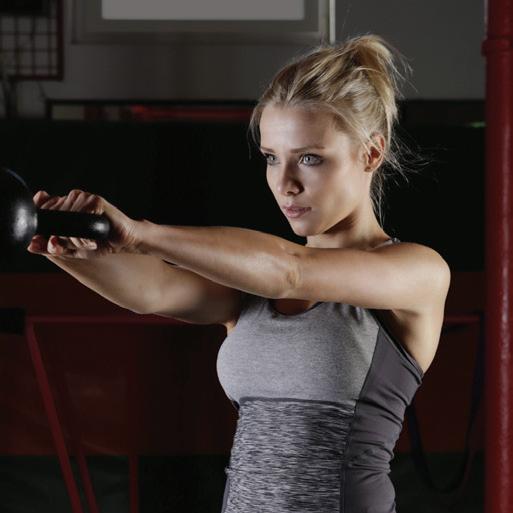
Students who successfully complete the course can seek employment in areas such as sports marketing, sports development and fitness instruction.
Crumlin College of Further Education, Crumlin Road, Dublin 12 Coláiste Breisoideachais Croimghlinne, Bóthar Croimghlinne, Baile Átha Cliath 12
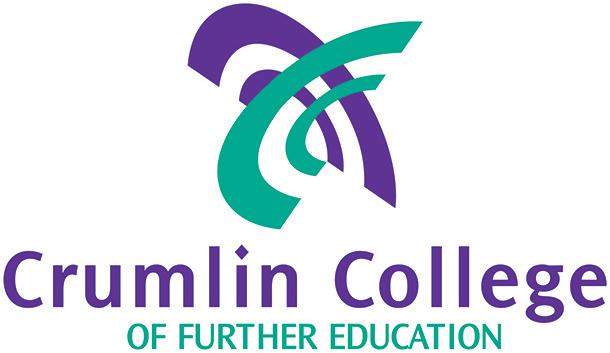
This course is designed to provide the knowledge and practical skills required to work in the Sports & Leisure sectors. It consists of theoretical and practical training which enables students to work in Health Spas & Massage Therapy Clinics.
Candidates who successfully complete the course will receive
Alternatively, students may progress to Fitness Instruction and Personal Training Year 2 in the college or may progress to degree courses.
For information on these and all our courses and for a seamless application process, you can visit online at www.crumlincollege.ie and click on the Apply Now link.
For all courses beginning in September 2023, students only pay a €50 registration fee, making Further Education an affordable way to pursue your academic and career goals.
Students are able to equip themselves with internationally recognised qualifications and can avail of employment opportunities in the fitness, health and leisure industries.
To access regular updates about what’s happening at the college, visit the home page of the website where there are links to all the social media platforms used.
Alternatively, you can call the college directly at 01 4540662 where a member of our helpful team will be available to answer any queries you may have.

"Students are able to equip themselves with internationally recognised qualifications and can avail of employment opportunities in the fitness, health and leisure industries"
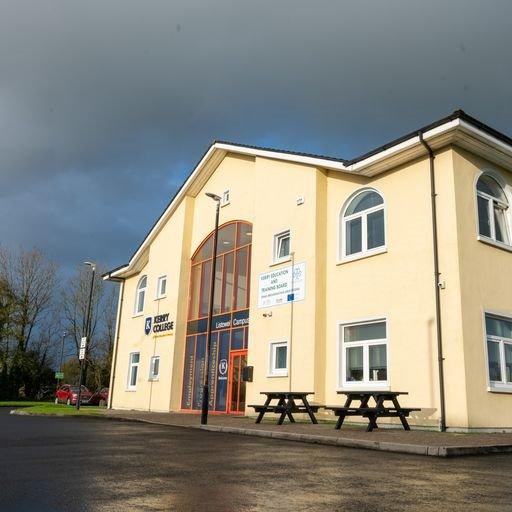
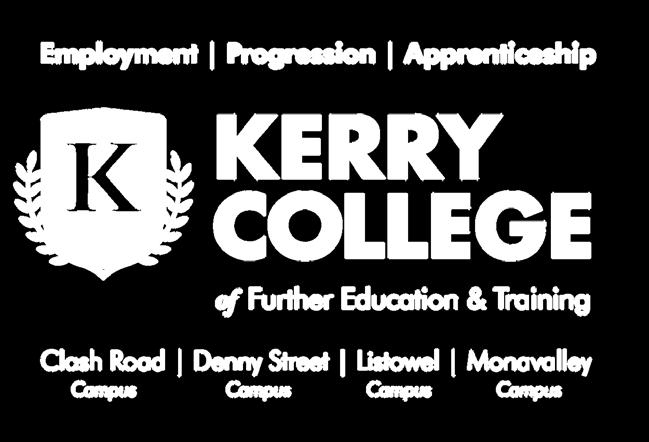
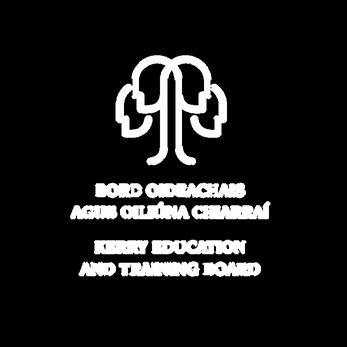




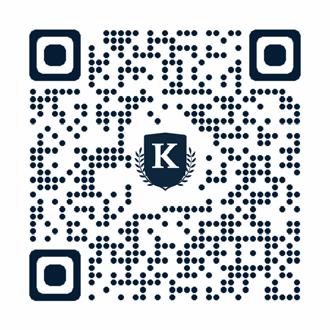
OUR brand new Kerry College, Listowel Campus is a vibrant, dynamic campus located in the Listowel Business Park in Clieveragh in the heart of North Kerry.
The campus offers a wide range of courses, from business and marketing to healthcare and social studies, and now introducing the brand new Youthwork course for the 2023 academic year.
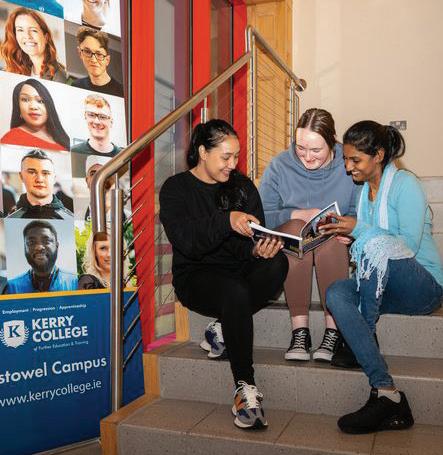
With excellent facilities and experienced teachers, Kerry College Listowel Campus is an excellent choice for those looking to further their education or develop new skills.
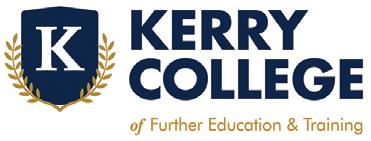
Listowel itself is a heritage town, market town and cultural hub of North Kerry. The town is sometimes described as the Literary Capital of Ireland, and several internationally known playwrights and authors have lived there, including Bryan MacMahon and John B. Keane.
One of the key features of Kerry College Listowel Campus is its commitment to providing practical, hands-on learning experiences. Many of the courses offered include work placements, giving learners the opportunity to
gain real-world experience and develop valuable skills.
Kerry College Listowel Campus is also renowned for its strong links to the local community. The campus works closely with local businesses and organisations to provide learners with opportunities for work experience and industry insights.
This approach to education has been hugely successful, with many graduates going on to secure employment in their chosen fields or progress to further education.
Overall, Kerry College Listowel Campus is an excellent choice for anyone looking to further their education or develop new skills. With a range of courses, practical learning experiences, and personalised support, the campus is committed to helping learners achieve their goals and succeed in their chosen fields.
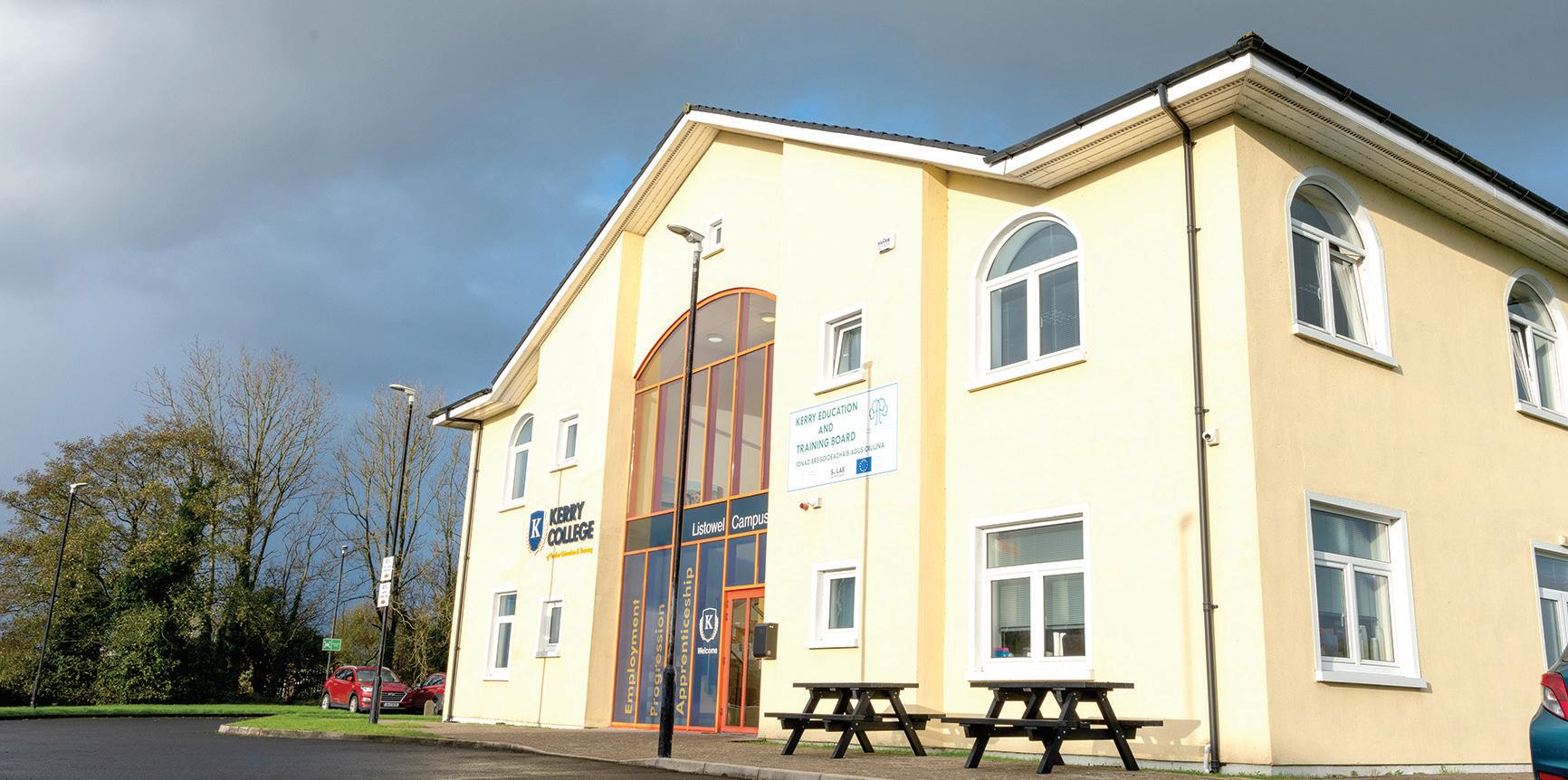
If you are considering further education, Kerry College Listowel Campus is definitely worth checking out.
■ Business and marketing
■ Animal care
■ Applied social studies
■ Community development
■ Leadership
■ Hairdressing
■ Healthcare support
■ Information and communications technology
■ Medical administration
■ Nursing studies
■ Office skills and administration
■ Photography
■ Special needs assisting
■ Youthwork (New for 2023)
and more….
THE School of Nursing and Midwifery in University College Cork offers a wide range of programmes for enthusiastic and caring people interested in a career in the health services.
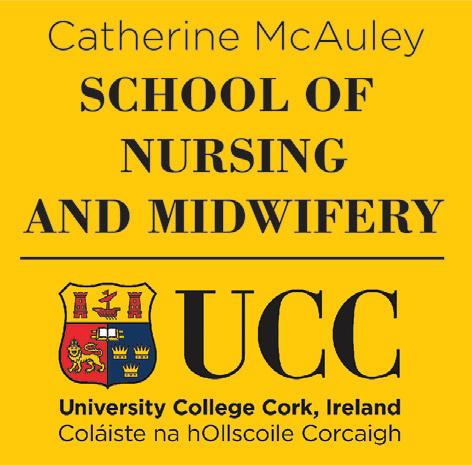
Now, more than ever before, we all understand why a well-educated, professional health care workforce is so critical to the health and wellbeing of all our society.
We have a range of undergraduate honours degree programmes including:
■ Childrens and General Nursing
www.ucc.ie/en/ck712/
CAO Points Round 1 2022: 554
■ Midwifery
www.ucc.ie/en/ck740/
CAO Points Round 1 2022: 495
■ General Nursing
www.ucc.ie/en/ck710/
CAO Points Round 1 2022: 464
■ Mental Health Nursing www.ucc.ie/en/ck720/
CAO Points Round 1 2022: 464
■ Intellectual Disability Nursing
www.ucc.ie/en/ck730/
CAO Points Round 1 2022: 419
"Qualified nurses and midwives work in all settings from the acute hospital to a variety of settings in the community and primary care, as well as roles in management, education, industry, and research"

All our courses are at BSc (Hons) level 8 and include registration with the Nursing and Midwifery Board of Ireland (NMBI). Students undertake clinical placements in hospitals, clinics, and community settings throughout the 4/5 years of the programmes. In the final year students undergo an extended placement as an ‘intern’ where they become part of the paid healthcare workforce.
As a qualified nurse or midwife, you may choose to continue your interests and specialisations by choosing a Postgraduate Programme. The career options available are endless. Qualified nurses and midwives work in all settings from the acute hospital to a variety of settings in the community and primary care, as well as roles in management, education, industry, and research.
As a School we are committed to equality, diversity, and inclusion. We are working hard to encourage greater diversity among applicants to our programmes. For example, we are actively encouraging more men to consider entering our undergraduate programmes
We are very proud of our modern School and what it has to offer. One such example is the state-of-the-art
In this centre our students can practice skills on hifidelity mannequins in a safe but very realistic ‘clinical’ environment. Have a look at the video online to see more at https://youtu.be/KpTnHzV7vQI
You should find all the information you need to help you make decisions about rewarding careers in Nursing and in Midwifery, and all the information about our various courses and course options on our website at www.ucc.ie/en/nursingmidwifery/study/undergrad/ but if there are any questions you have, that are not addressed, please feel free to drop us an email to nursing.studies@ucc.ie.
On the website you will also find information about entry requirements for our programmes, videos showing you our facilities and testimonies from our students and past graduates.
"We are very proud of our modern School and what it has to offer. One such example is the state-of-the-art Clinical Skills Simulation Resource Centre"
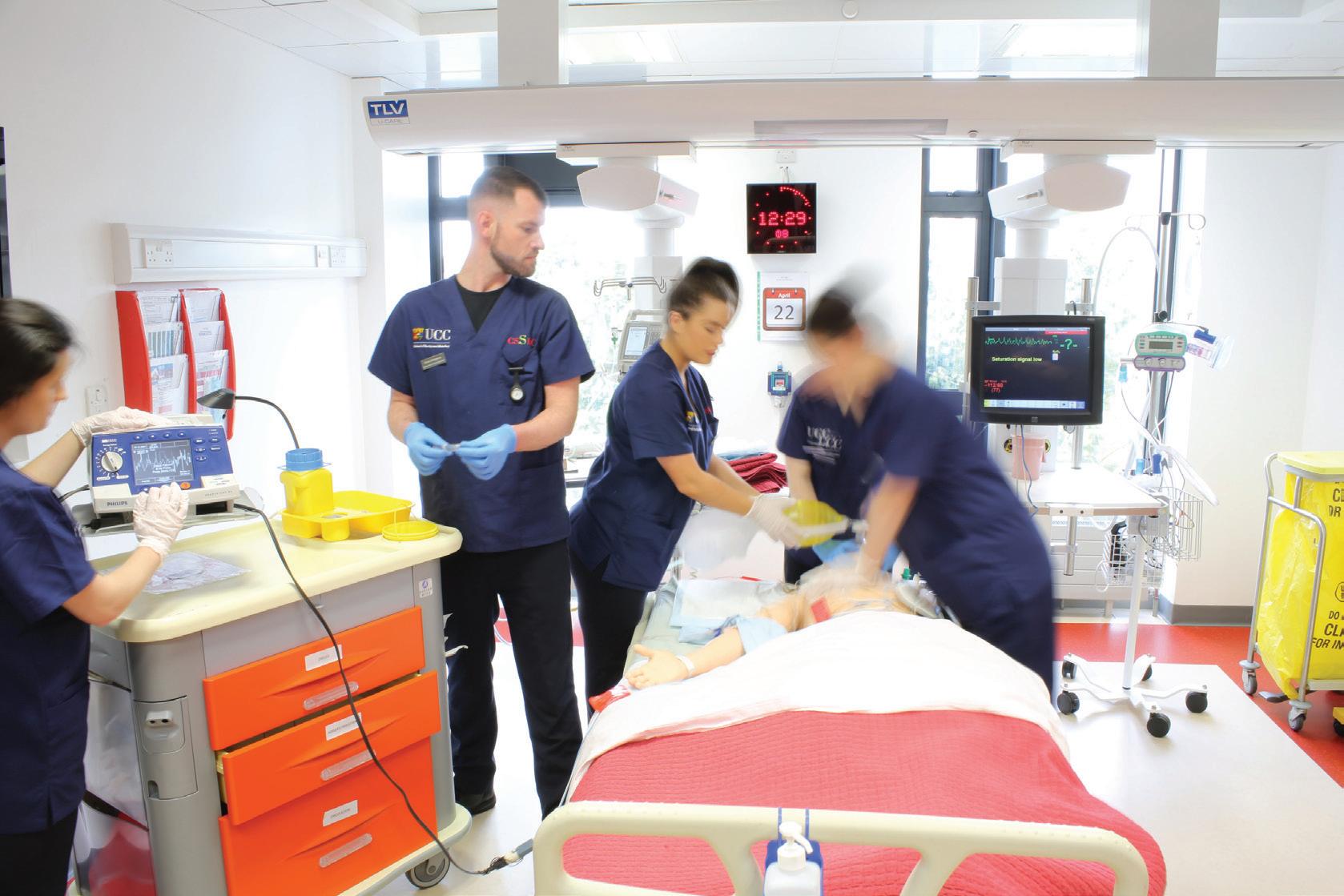
■ Ranked in the top 50 in the 2023 Global QS rankings for 'Nursing' as a subject (ranked 33). Ranked as the top School of Nursing in Ireland, and the top ranked subject in UCC.
■ Over 1,300 students are registered on 26 programmes with opportunities for nurses and midwives to study for undergraduate, postgraduate, masters and doctoral level qualifications.
■ For the past four years, 95-100% of our nursing and midwifery graduates are in employment and/or engaging in further study.
■ A strong and increasing track record in attaining research funding.
■ Seven internationally connected active research clusters producing a consistent scholarly output of over 100 publications per annum.
■ Students and staff who regularly win national awards for their work.
■ An ERASMUS programme of placements within the European Union for undergraduate students.
■ International students from the wider EU and beyond for example US, Brunei, Malaysia, Nigeria, India, China, Kuwait, Saudi Arabia, Korea, Philippines, and Lebanon.
■ The support of highly qualified, experienced, dynamic and dedicated staff who facilitate the education of students and engage in future orientated person-centred research.
■ Students experience exceptional teaching resources including a world-class Clinical Skills Simulation Resource Centre located in our Brookfield Health Sciences Complex.
IRELAND’S first consortium-led, multicampus manufacturing engineering apprenticeship programmes have received accreditation from Engineers Ireland, the professional membership body, and accrediting body for engineering in Ireland.
Engineers Ireland accreditation creates, maintains, and ensures a consistent standard of engineering programmes in Ireland and will now offer qualified apprentices an internationally recognised qualification.
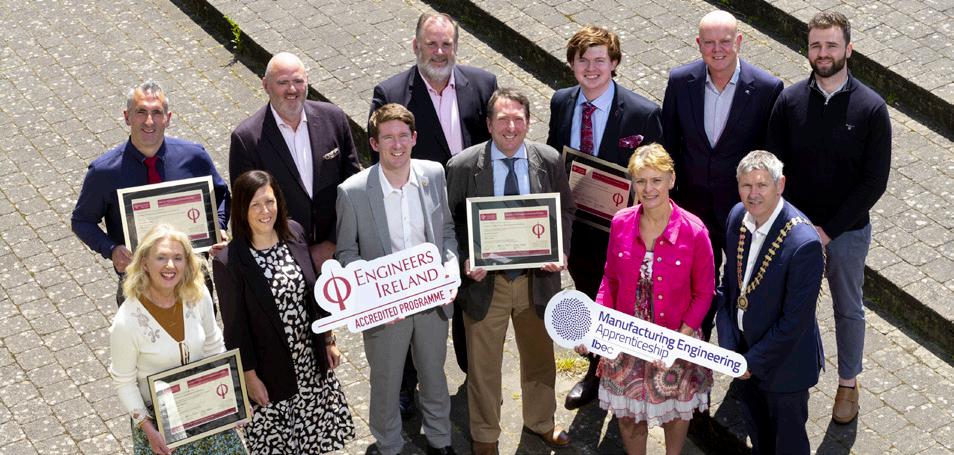
The Bachelor of Engineering in Manufacturing Engineering is the first accredited Level 7 engineering apprenticeship programme in Ireland that is open to school leavers, employees and mature students. It is delivered in three regions through Atlantic Technological University (ATU) Galway, ATU Sligo and Munster Technological University (MTU) Cork. The programme is expected to be offered in Technological University of the Shannon (TUS) Midwest (Limerick) from September 2024.
The Higher Certificate in Manufacturing Engineering programme, delivered at ATU Galway, ATU Sligo, MTU Cork and TUS Midwest, is the first and only Level 6 accredited Manufacturing Engineering apprenticeship programme in the country.
These national engineering apprenticeship programmes were co-developed by a consortium led by Ibec’s Irish Medtech Association, representatives from the manufacturing industry and academic partners ATU (coordinating provider), MTU and TUS, to meet the needs of the sector. Currently, over 400 apprentices are involved in the programmes with 100 leading employers across Ireland. Apprentices spend 70% of their learning time in the workplace and 30% of learning time on campus.
Niall Morris, Head of Department of Mechanical, Biomedical & Manufacturing Engineering at MTU, said:
"Our manufacturing engineering apprentices range from school leavers to long standing employees in SME’s and large multinational companies.
"They all see the fantastic benefit of studying for their degree, while having the support and mentorship within their respective companies. The blended learning approach allows for the technical skills and knowledge to be gained in the universities and put into practice in industry.
"The apprenticeship model is attracting women into engineering creating a great balance within STEM in the workplace."
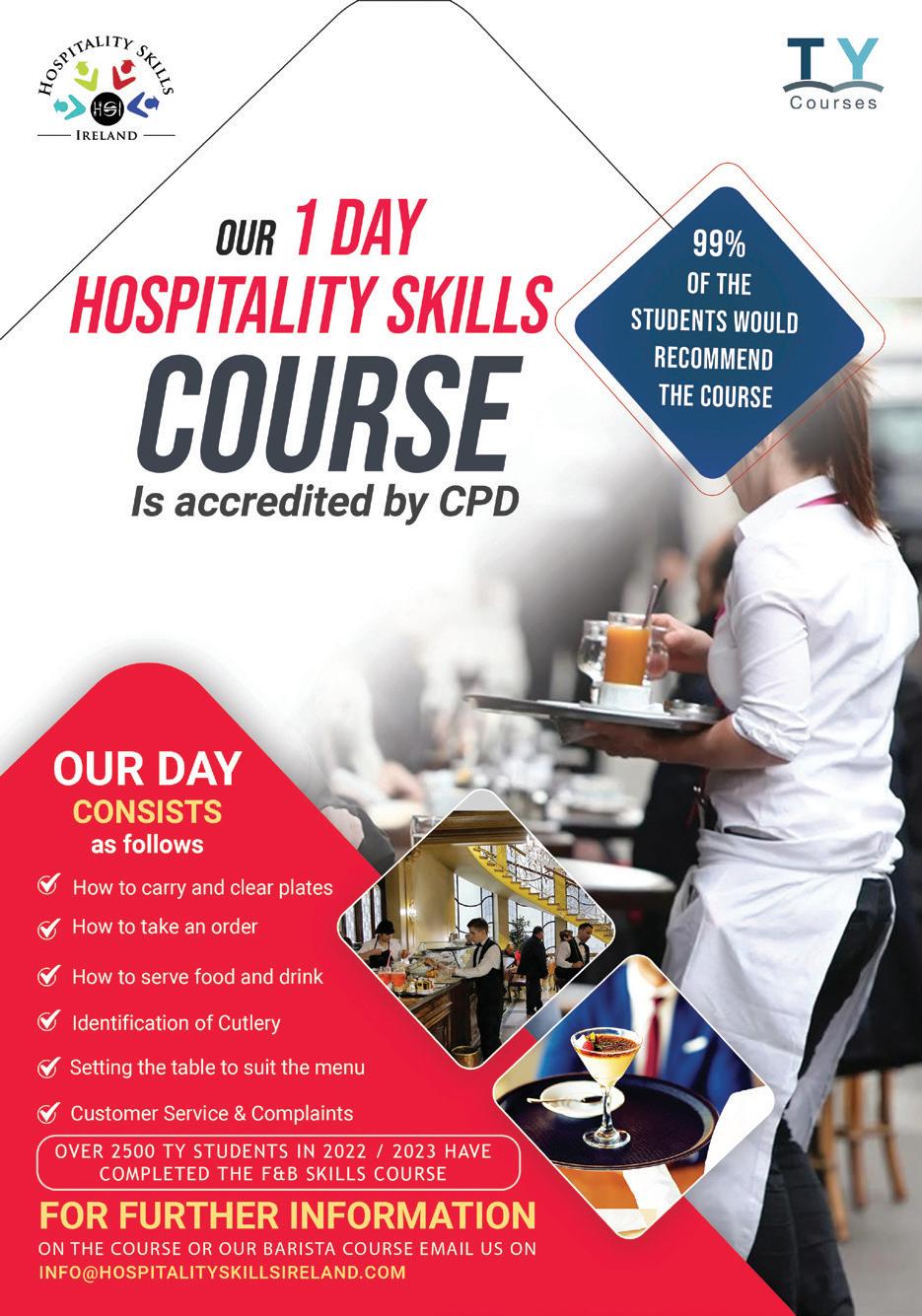
CERTIFICATE AND DIPLOMA COURSES • NO CAO POINTS REQUIRED
ART, CRAFT & DESIGN (PORTFOLIO PREPARATION)
ADVANCED ART - LEVEL 6 (3 DAYS)
PROFESSIONAL FLORISTRY
FASHION DESIGN
FASHION BUYING, STYLING & VISUAL MERCHANDISING
ADVANCED FASHION DESIGN
HAIRDRESSING & BEAUTY THERAPIES
HAIRDRESSING APPRENTICESHIP
PERFORMING ARTS/ACTING FOR THEATRE, TV & FILM
MUSICAL THEATRE AND DANCE
EARLY LEARNING AND CARE
ADVANCED CERTIFICATE IN EARLY LEARNING AND CARE
SPECIAL NEEDS ASSISTING AND INTELLECTUAL DISABILITY STUDIES
ADVANCED TRAINING IN SPECIAL NEEDS ASSISTING & INCLUSION
PERSONAL TRAINER/ SPORTS REHABILITATION/ PHYSIOTHERAPY ASSISTANT/
STRENGTH AND CONDITIONING/SPORTS MASSAGE THERAPIST
FITNESS INSTRUCTION AND EXERCISE SCIENCE
PHYSICAL EDUCATION & SPORTS COACHING
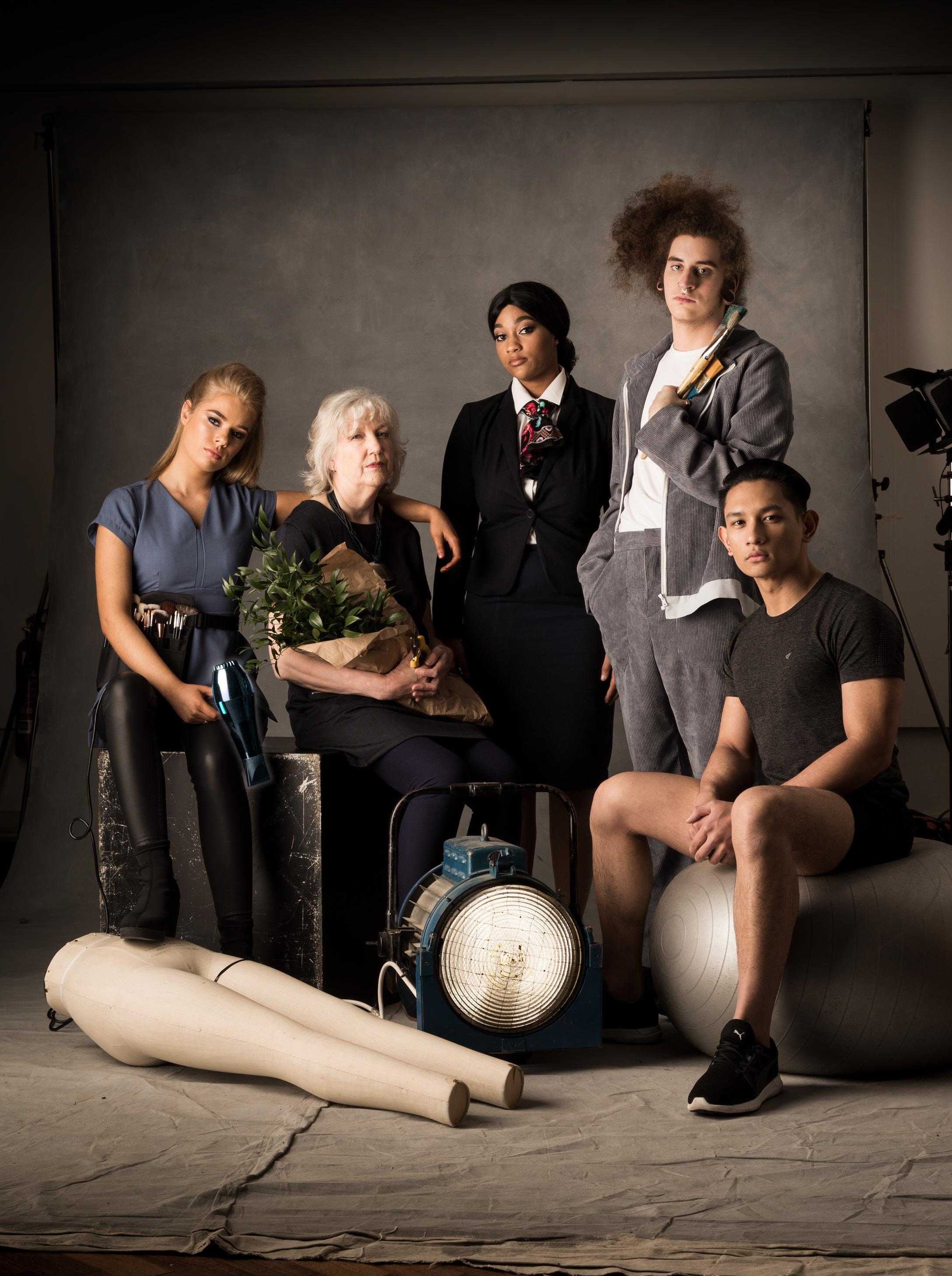
YOGA & PILATES TEACHER TRAINING
AIRLINE AND TRAVEL INDUSTRY STUDIES
HOSPITALITY, TOURISM AND EVENT MANAGEMENT
SOCIAL STUDIES INCLUDING CRIMINOLOGY & ADDICTION STUDIES
ADVANCED SOCIAL STUDIES INCLUDING ADVOCACY
CRIMINOLOGY INCLUDING LEGAL STUDIES
YOUTH WORK AND COMMUNITY DEVELOPMENT
2pm All Welcome
All courses lead directly to employment or progression to degree courses in Universities and Higher Education Institutes
All courses recognised for SUSI grant Funding available for Social Welfare recipients and exemptions for Medical Card holders
SALLYNOGGIN College of Further Education (SCFE) provides a platform for many of our students to embark on their journey towards higher education and professional success. With a wide range of courses available, SCFE equips students with the necessary skills and knowledge to excel in their chosen fields. Many of our students transition directly to the workplace while others choose to continue their studies, using the qualifications they gain with us to access Higher Education both in Ireland and abroad. Studying at QQI Levels 5 and 6 in SCFE can open doors to exciting opportunities as the following stories illustrate.
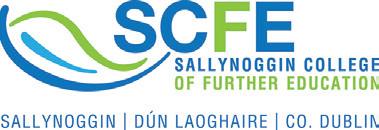
Fashion Industry and Creative Fields:
The Fashion Buying, Styling and Visual Merchandising course in SCFE has seen many students progress to Higher Education. The course enables students to develop an appreciation of fashion product, design, fashion history and retail
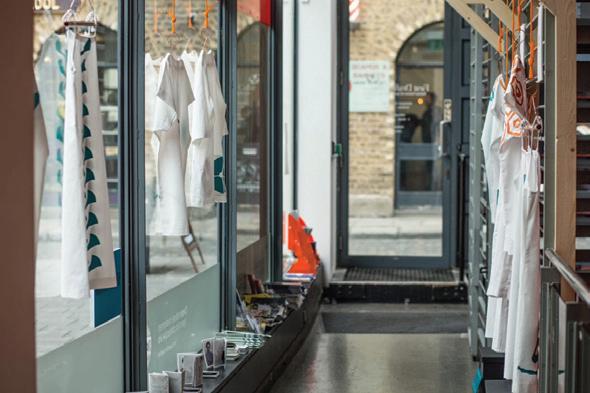
display leading to an understanding of range development and the processes required to market and promote fashion businesses. Learners have the opportunity to develop work suitable for portfolio preparation required for third level colleges application. There are excellent progression routes to a variety of Level 7 and 8 degree courses in IADT, NACD, TU Dublin and other third level colleges.
Torey Cassidy Murdock, a graduate of the Fashion Industry Practice (FIP) course in 2017, exemplifies the potential for growth. Leveraging her Level 6 qualification and portfolio, Torey applied through UCAS to study a BA in Fashion Communications at the prestigious London College of Fashion (UAL).
Since then, she has collaborated with renowned companies such as John Lewis, Marie Claire, and Wolf & Badger. Currently, Torey works as an Agent and Producer at LGA Agency in London, establishing herself as a prominent figure in the industry.
"Dynamic and challenging, introducing learners to the disciplines involved in working on stage, in film and on television"
Another success story is James Clarges, who completed FIP in 2012. James went on to pursue a degree in TUD Visual Merchandising. His career journey led him from a Creative Visual Merchandiser in Dublin's Forever 21 to an internship with Tommy Hilfiger in Amsterdam. James quickly climbed the ranks and became the Visual Merchandising Co-ordinator for Tommy Hilfiger. Later, he joined Calvin Klein as the Global Window Co-ordinator for Europe and the Middle East, working on notable campaigns like Calvin Klein. James continued his education by pursuing a master's degree at UCD. He subsequently worked as the Senior Global Retail Marketing Manager at Dyson and is currently a freelance marketing consultant.
Performing Arts:
The Performing Arts/Acting and Performance for Theatre, TV and Film course provides a dynamic and challenging programme, introducing learners to the various disciplines involved in working on stage, in film and on television.
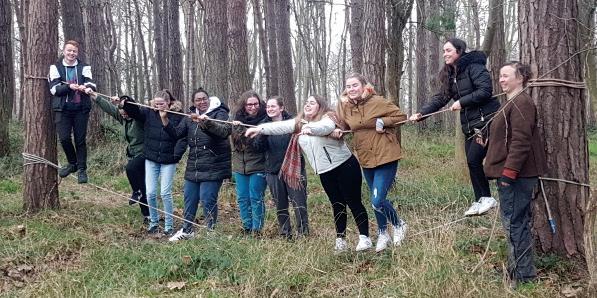
Although the primary focus is on acting, the course provides an opportunity for learners to participate actively in all elements of creating and producing drama. There is an emphasis on the practical skills and the understanding of acting techniques and stage craft.
Lucy Smirk Richards, a former student of the Performing Arts course, embraced opportunities to study Drama at UCD after completing her course in SCFE. Lucy's passion for the craft led her to produce and direct plays for Dramasoc at UCD, and she also acted as an assistant director for the production "Dublin In A Rainstorm" at the Smock Alley Theatre.
Other success stories include Josh McEneaney and Ebby O'TooleAcheampong, who graduated from the Bachelor in Acting program at The LIR Academy, part of TCD. These students performed lead roles in SCFE productions, like our 2017 production of “The Importance of Being Earnest” and have now gained the skills and recognition necessary to thrive in the acting industry.
Holly Sturton, who studied at Bow Street Academy, has acted in various Netflix series, showcasing the potential for SCFE students in the performing arts industry
SCFE is looking forward to welcoming back one of our former students on the Performing Arts course, Daniel Mallon, as a student teacher next September. Daniel has completed his degree in Drama in UCD.
Musical Theatre, Dance, and Drama:
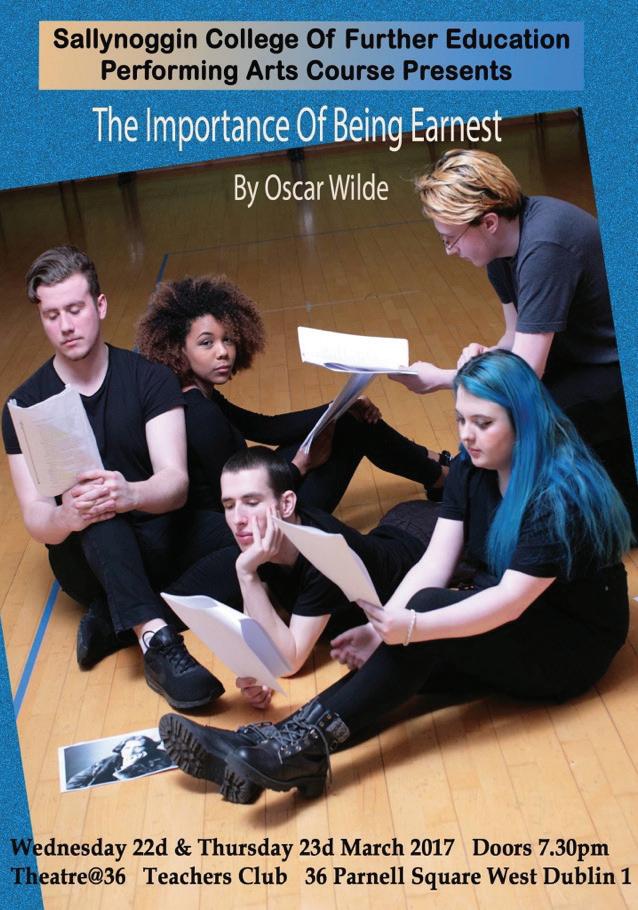
The opportunities for progression in the creative arts continue with SCFE's courses in Musical Theatre and Dance.
Former students such as Ellie McHugh, Holly Campbell Fogarty, and Daniel Keogh have pursued higher education and professional opportunities in their respective fields, studying at renowned institutions like The International Dance Academy in Copenhagen, TU Dublin, and Mountview Academy of Theatre Arts in London.
Sallynoggin College's courses in Childcare and Early Education have paved the way for graduates to make a difference in the lives of young children.
Sarah O'Donovan, after complet-
ing QQI Level 5 and 6, progressed to a Bachelor of Arts (Honours) in Early Childhood Education at Technological University Dublin. Sarah has worked with organizations such as Barnardos and Dalkey Community Preschool Playgroup, and recently accepted a role as an Early Years Specialist with Better Start (Pobal).
Sarah Clare, another graduate, initially pursued her Level 5 qualification to gain a foothold in the industry. However, her passion for early childhood education inspired her to continue her studies at TU Dublin, where she completed a Bachelor's degree (level 8). Sarah now works as a supervisor in a preschool and is enrolled in the Leadership for Inclusion in the Early Years (LINC) program which supports the inclusion of children with additional needs in the early years.
The experiences of former students at Sallynoggin College of Further Education exemplify the vast array of opportunities available for progression after completing a course at SCFE.
Whether students aspire to enter the fashion industry, pursue degrees in social sciences, engage in performing arts, or make a difference in early education, SCFE provides a solid foundation for success.
By nurturing their skills, fostering personal development, and offering industry-relevant qualifications and work experience, SCFE empowers students to take the next steps towards their dreams and aspirations. The success stories of these individuals serve as inspiration and evidence that a year spent at SCFE can unlock a world of possibilities for students seeking higher education and professional growth.
SCFE is a College of Further Education under the patronage of DDLETB. We provide courses to school leavers and mature students in a broad variety of areas from Childcare to Social Studies, Fashion, Art and Floristry, Hairdressing & Beauty, Travel and Tourism, Performing Arts and Musical Theatre and Fitness and Wellbeing.
Through our close collaboration with employers and industry groups, SCFE continues to ensure that our courses are up to date, relevant and future-proofed to give our students the edge in their chosen field.
To find out more about any of our other courses, check out our website www.scfe.ie.
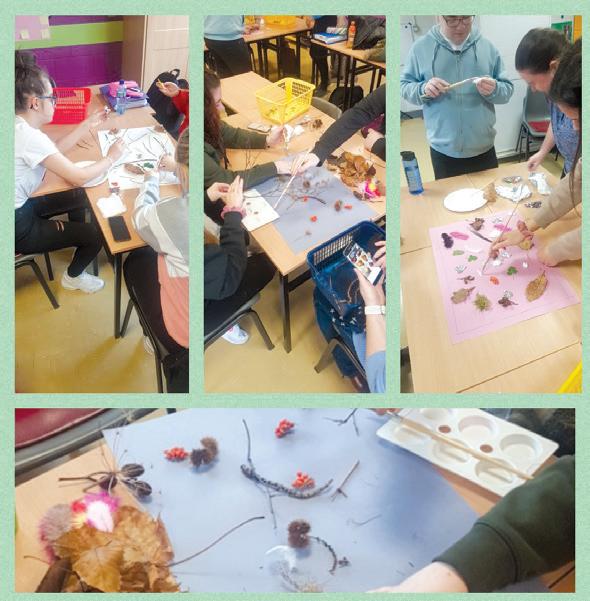
Our Course Coordinators are available to answer specific questions about individual courses, and their contact details are listed on each course page. Apply online at www.scfe.ie or contact Reception@scfe.ie Tel: 01 285 2997.
We also invite you to come and visit us on our next Open Day on 29th August 2023. See www.scfe. ie for more details.
A NEW national survey by the Sustainable Authority of Ireland (SEAI) gives insights on the attitudes to commercial wind and solar energy farms in Ireland.
Key findings from the research are:
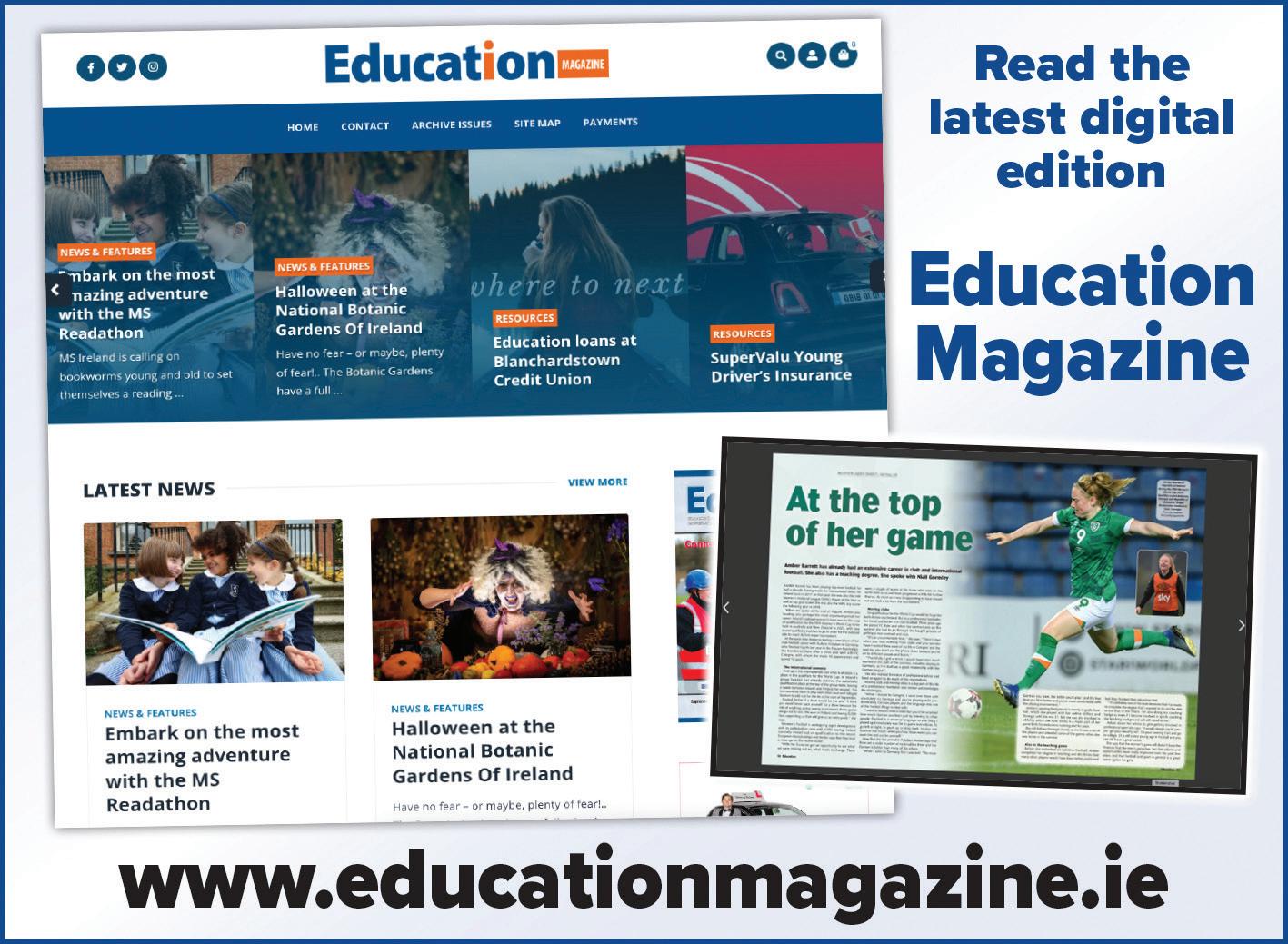
■ Most households close to new wind or solar power projects have positive attitudes to the project close to them.
■ Across rural Ireland, general levels of support for wind and solar energy projects remain very high, regardless of whether people live close to new projects or far away.
■ A large majority of the public in rural areas supports policies that secure benefits for communities close to new renewable energy projects through ‘Community Benefit Funds’.
■ Most people feel they can have a say in planning. Many still feel the process is unfair, and that more effort should be made with community engagement and careful siting of projects.
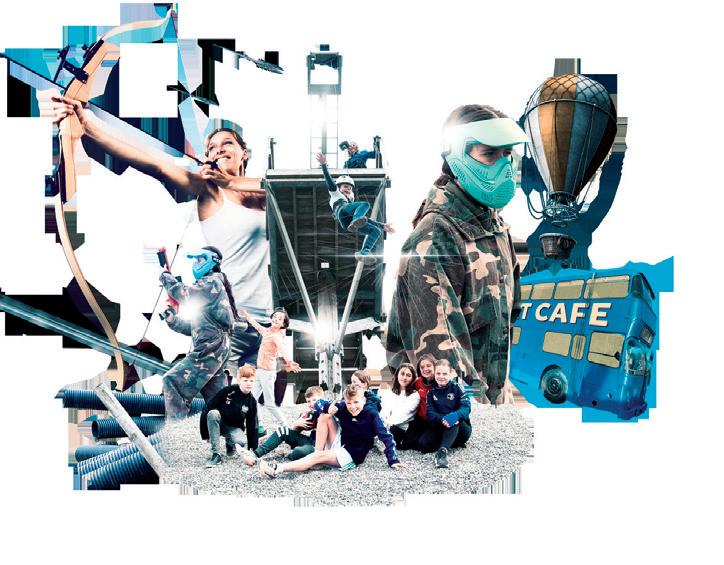
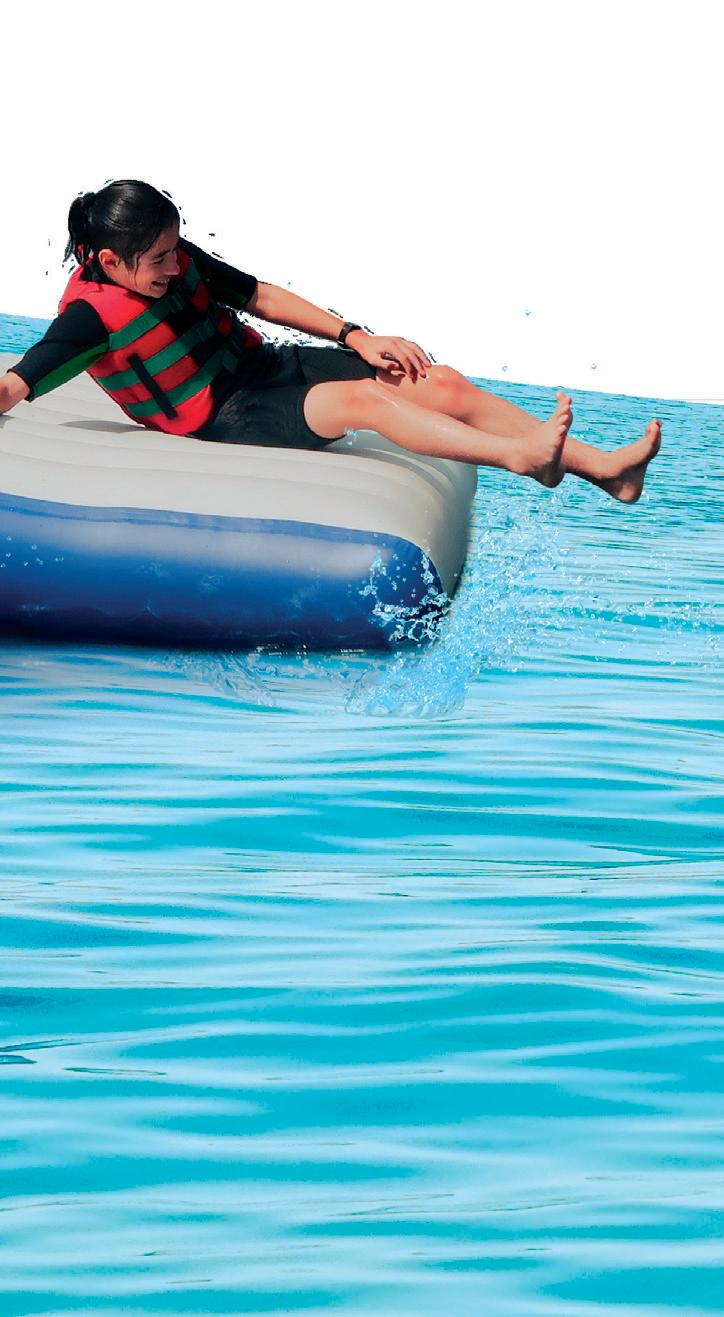
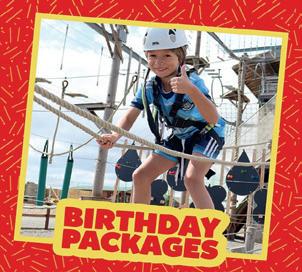
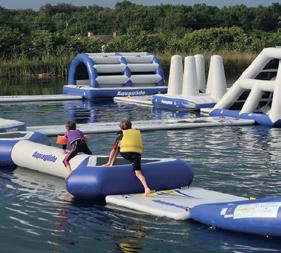
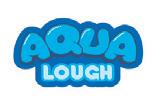

Small schools – here defined as schools with 4 mainstream class teachers or fewer –comprise a large proportion of primary schools in Ireland. 41.8 per cent of all schools in the 2022 academic year had 4 mainstream classes or fewer, although only 13.4 per cent of pupils were enrolled in small schools. While the number of small schools has been declining in recent years they remain very prominent, particularly in rural areas, as illustrated in Map 2 overleaf
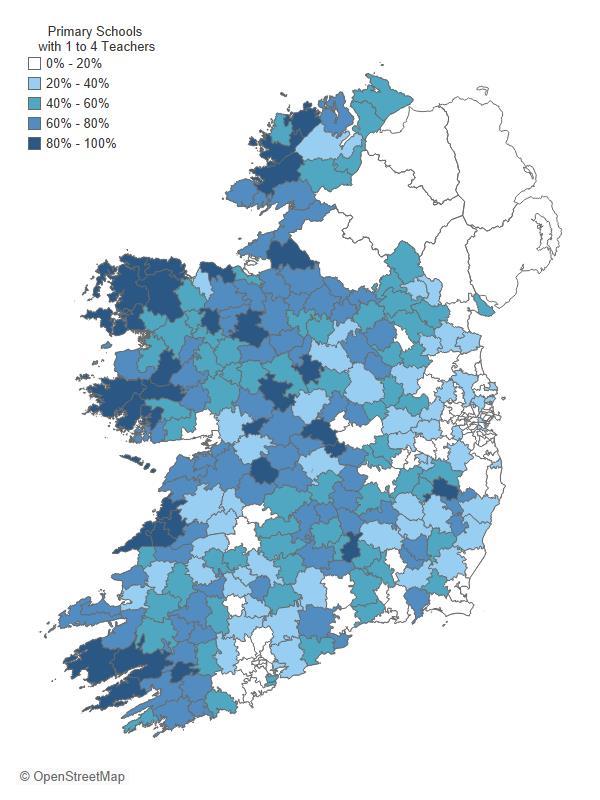

Figure 20 illustrates the growing importance of large schools in the post-primary system. While small schools (less than 300 pupils) made up 29.8 per cent of all schools in 2012, this has dropped to 19.8 per cent in 2022, while the number of large schools (800+ pupils) has more than doubled (from 65 to 148)
CUMULATIVE CHANGES IN SCHOOL NUMBERS AND ENROLMENTS BY IRISH CLASSIFICATION, 2012-2022
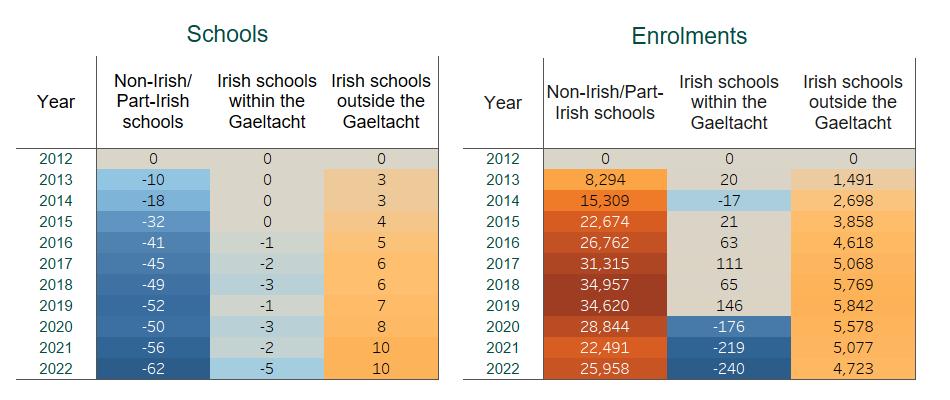

changes in primary school numbers and 2012-2022
Table 1 Cumulative changes in primary school numbers and enrolments by Irish classification, 2012-2022
Source: Data on Individual Schools
twenty-year period change since 200 eacher ratio, in 2002 to 13.7 to 14.3 in 2022
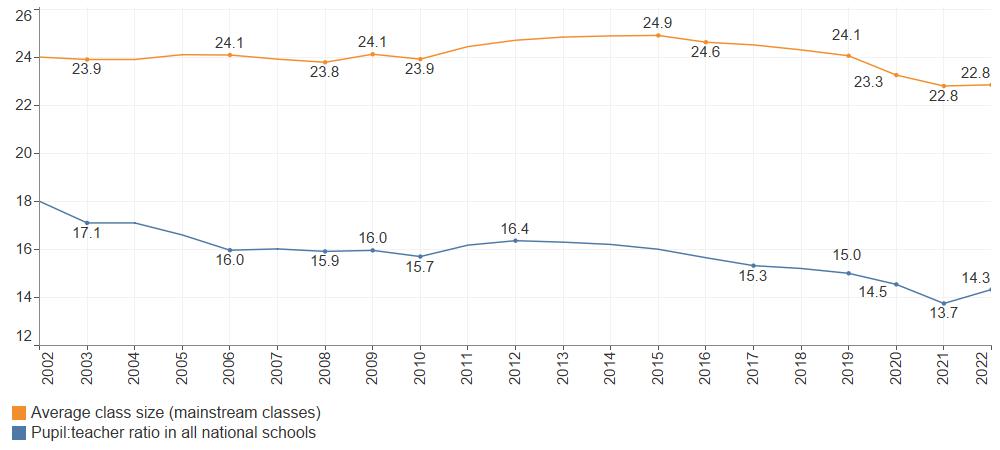
Figure 3 Pupil:teacher ratio and average class size in
SOURCE: Statistical Bulletin – July 2023; Overview of Education 2002 – 2022; Department of Education
The change in average class size over the twenty-year period 2002-2022 is presented in Figure 3 and shows there has been little change since 2002 It reached its lowest point in 2021, and again in 2022, at 22 8. The pupil:teacher ratio, on the other hand, has fallen consistently over the same period, from 18.0 in 2002 to 13.7 in 2021, and, due to additional
4%), and Kildare (31.2%), all increased by over 30 per cent, while Monaghan %) and Sligo (0.5%) saw smaller increases.
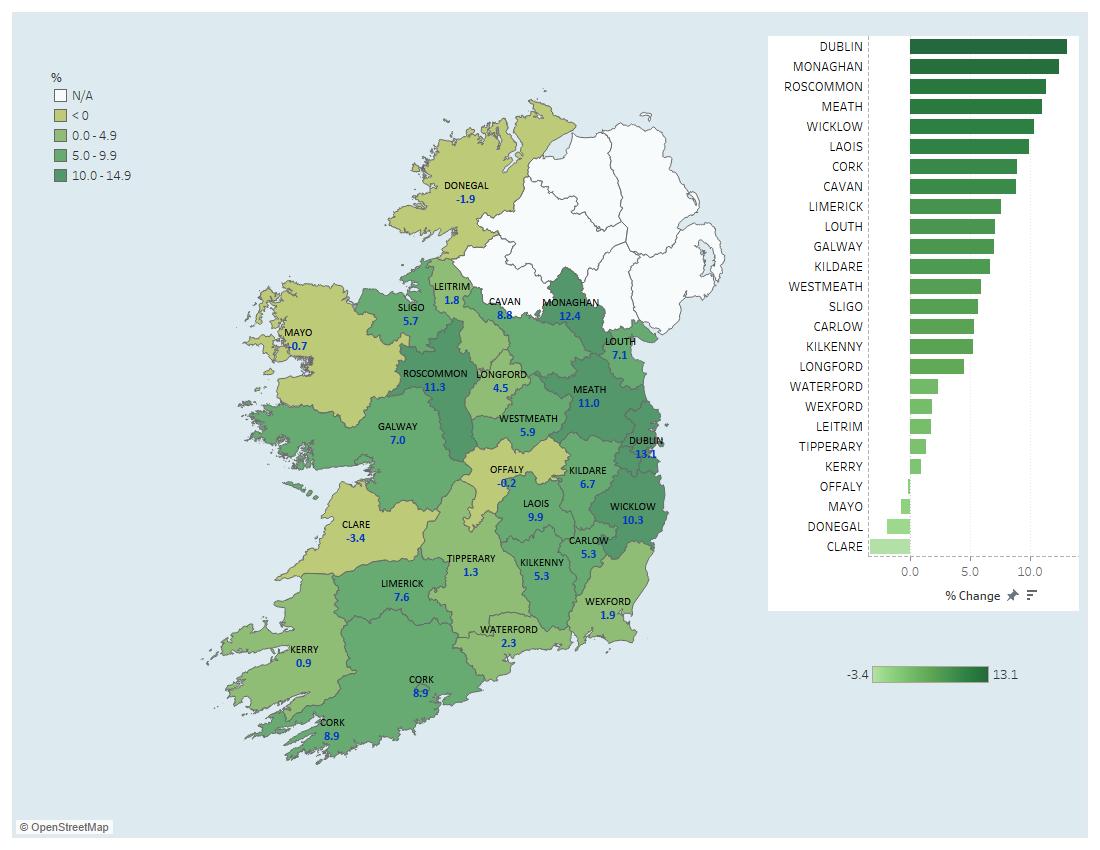
While the overall average class size has varied little since 2002, the number of pupils in classes of 35 or more fell sharply between 2002 (11,901) and 2022 (2,435) while those in the next-largest category (30-34) stood at 58,910 in 2022, down from 120,665 in 2015
Map 3 Percentage change in post-primary enrolments by county, 2012-2022
enrolments
enrolments in Primary schools in 2021 stood at 554,788, a fall of 6,623 on 2020 when total was 561,411. Over the twenty year period 2001 to 2021 there was an increase of 113,723 (25 8%) in enrolments in primary schools (mainstream and special) and enrolments projected to fall over the coming twelve years. Please note that enrolment data is fixed to Census date of 30th September 2021 and accordingly enrolments of Ukrainian children not included in these headline figures or the following analysis. Data on Ukrainian enrolments can be found in the appendix to this document. Source: EDA42
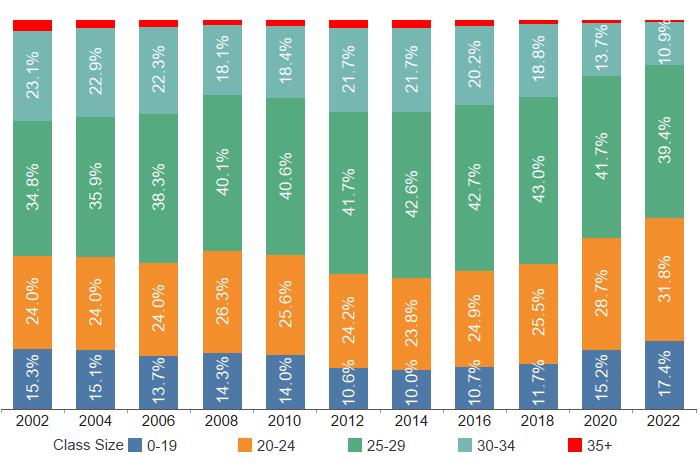
Change by administrative county
the change in enrolments by administrative county over the past 10 years is examined, the data shows the largest proportional increases occurred within Dublin and the surrounding areas, with the highest in Dun Laoghaire – Rathdown at 19 9 per cent, followed Fingal at 14.2 percent and Monaghan at 12.4 per cent. The smallest increase occurred in (0.9%) and Waterford City (0.7%), while Clare and Donegal were the areas that saw a largest decrease by 3.4 per cent and 1.9 per cent, respectively.
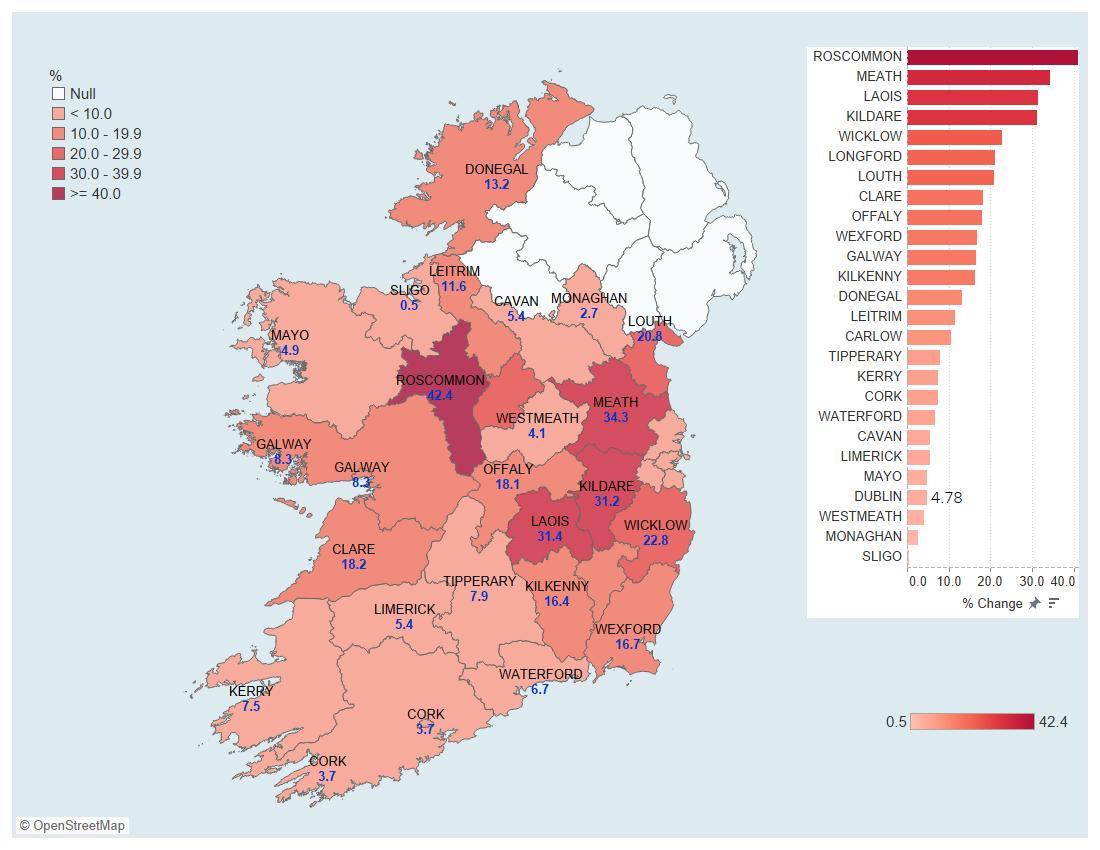
Source: EDA69

chool
Variation in class sizes can be seen when we look at schools by characteristics, such as lassification and DEIS status. When examined by ethos, the data shows that of pupils in Catholic schools were in classes of 30 pupils or more, compared of those in in multi-denominational schools. However, the average in Catholic schools was 22.8, compared with 24 1 in multi-denominational schools denominational includes inter-denominational schools.
Map 1 Percentage change in enrolments in Primary schools, by county, 2011-2021
PERCENTAGE CHANGE IN ENROLMENTS IN
Source: EDA57
POST-PRIMARY ENROLMENTS BY SCHOOL GENDER, BY SEX, 2022
Girls
Statistics Section, Department of Education
35.4% 64.6%
28.0% 72.0% Boys
Girls in single sex schools
Girls in mixed sex schools
Boys in single sex schools
Boys in mixed sex schools
Pupils in primary schools, by class size, by school ethos, 2022
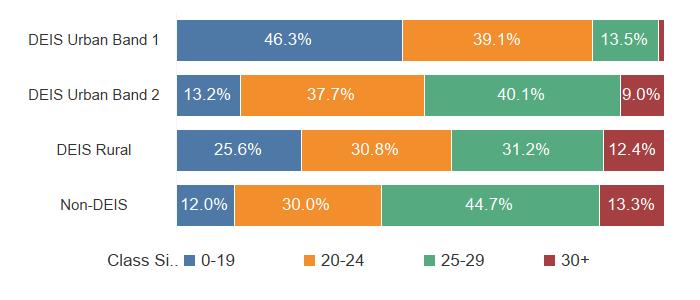
chool
Variation in class sizes can be seen when we such as ethos, Irish the data shows that compared he average schools
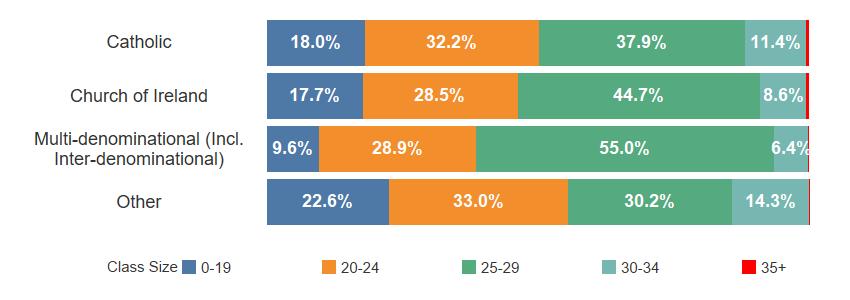

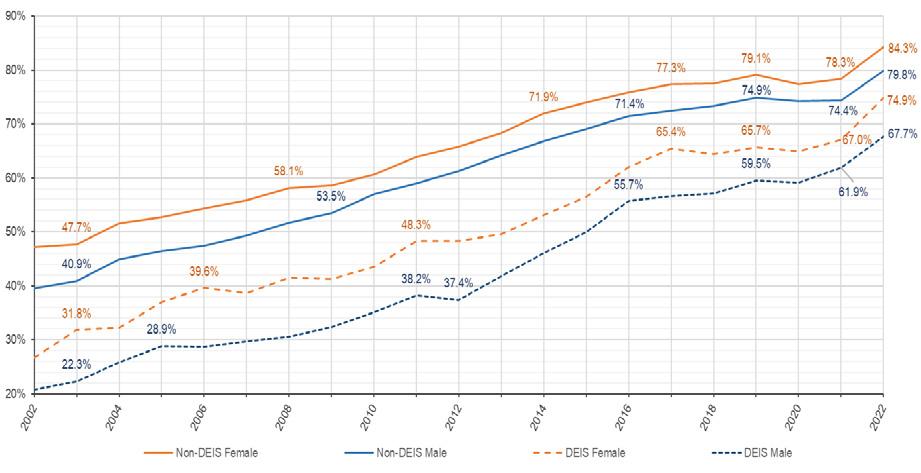
PUPILS BY CLASS SIZE AND IRISH CLASSIFICATION, 2022
per cent of pupils were in large per medium schools and 7 1 per cent in Irish medium schools in primary schools, by class size, by Irish Classification, 2022
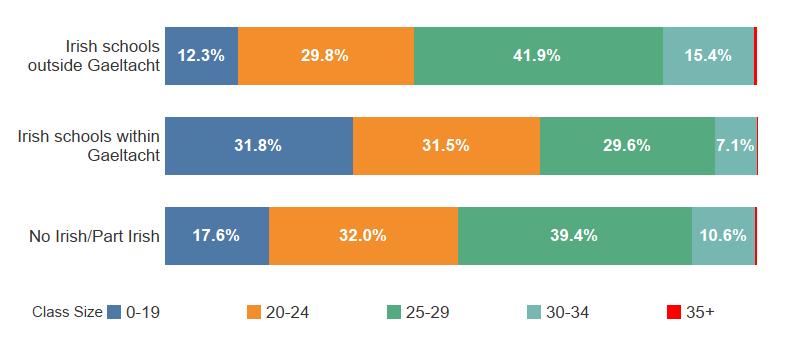
TRANSITION YEAR AS A % OF PREVIOUS JUNIOR
Finally, when examined by DEIS status, the data shows that DEIS Urban Band 1 schools, which have a separate staffing schedule to other school types, have by far the smallest classes with 85.3 per cent of pupils in classes of fewer than 25. Rural schools also have a high proportion of small classes, with more than half (56.4%) of pupils in classes of fewer than 25. For more information on DEIS Urban Band 1/2 and Rural see here
CYCLE YEAR 3, BY GENDER, BY DEIS STATUS, 2002-2022 PUPILS BY CLASS SIZE, 2002-2022AONTAS - National Association of Adult Education
2nd Floor, 83/87 Main St, Ranelagh, Dublin 6.
☎ 01 4068220 www.aontas.com
The Arts Council
70 Merrion Sq, Dublin 2.
☎ 01 6180200 www.artscouncil.ie
Association of Advertisers in Ireland Ltd
120 - 121 Lower Baggot Street, Dublin D02 FD45.
☎ 01-6599457 www.aai.ie
Association of Chartered Certified Accountants
La Touche House, 1st Floor IFSC, Dublin 1.D01 R5P3.
☎ +44 (0)141 582 2000 www.accaglobal.com/ie
Chambers of Commerce of Ireland
11 St Stephen's Green. D02 FY84.
☎ 01 4004300 www.chambers.ie
Association of Consulting Engineers of Ireland
46 Merrion Sqr, Dublin D02 VF66.
☎ 01 6425588 www.acei.ie
Association of Garda Sergeants & Inspectors
6th Floor, Phibsborough Tower, Dublin 7.
☎ 01 8303166 www.agsi.ie
Association of Occupational Therapists of Ireland


18 Herbert St, Grand Canal Dock, Dublin, D02 FK19.
☎ 01 874 8136 www.aoti.ie
Association of Secondary Teachers of Ireland
Thomas MacDonagh House, Dublin D08 P9V6.
☎ 01 6040160 www.asti.ie
An Bord Altranais
18/20 Carysfort Ave, Blackrock, Dublin. A94 R299
☎ 01 6398500 www.nmbi.ie
Chartered Institute of Logistics and Transport
1 Fitzwilliam Plc, Dublin 2. D02 DT68
☎ 01 6763188 www.cilt.ie
Chartered Institute of Management Accountants
The Seapoint Building, Clontarf Road. D03P 657.
☎ 087 2213443 cimaglobal.com/ireland
Chartered Institute of Personnel & Development
A3 The Locks, Charlotte Quay Dock, Dublin 4 www.cipd.ie
Computers in Education Society of Ireland
c/o Drumcondra Education Centre, D9.
www.cesi.ie
Construction Industry Federation
Construction House, Canal Road, Dublin 6.
☎ 01 4066000 www.cif.ie
Design and Crafts Council of Ireland
Castleyard, Kilkenny. R95 CAA6
☎ 056 7761804 dcci.ie
Dublin Institute for Advanced Studies
10 Burlington Road, Dublin. D04 C932.
☎ 01 6140100 www.dias.ie
Dublin Adult Learning Centre
3 Mountjoy Square, D1.
☎ 01 8787266 www.dalc.ie
Economic and Social Research Institute
Sir John Rogerson’s Quay, Dublin D02 K138.
☎ 01 8632000 www.esri.ie
Education Research Centre
DCU St. Patrick’s College, Drumcondra. D09 AN2F.
☎ 01 8373789 www.erc.ie
Engineers Ireland
22 Clyde Road, Ballsbridge, Dublin 4. D04 R3N2
☎ 01 6651300 www.engineersireland.ie
Self Help Africa Gorta
17 - 22 Parkgate Street, Dublin D08 NRP2
☎ 01 677 8880 www.selfhelpafrica.org/ie
Honourable Society of King’s Inn
Henrietta Street, Dublin 1.
☎ 01 8744840 www.kingsinns.ie
Law Society of Ireland
Blackhall Place, Dublin 7. D07 VY24.
☎ 01 6724800 www.lawsociety.ie
Accounting Technicians Ireland
47-49 Pearse Street, Dublin 2. D02 YN40
☎ 01 649 8100 W: accountingtechniciansireland.ie
Institute of Advertising Practitioners in Ireland
Grand Canal Quay, Dublin 2. D02 CD51
☎ 01 6765991 www.iapi.ie
The Institute of Banking
IFSC, 1 North Wall Quay, Dublin 1. D01 T8Y1
☎ 01 6116500 www.iob.ie
Institute of Certified Public Accountants in Ireland
17 Harcourt Street, Dublin 2. D02 W963
☎ 01 4251000 www.cpaireland.ie
Chartered Accountants Ireland
Chartered Accountants House, 47 Pearse St, Dublin 2.
☎ 01 6377200 www.charteredaccountants.ie
Institute of Guidance Counsellors
17 Herbert Street, Dublin 2.
☎ 01 6761975 www.igc.ie
Institute of Professional Auctioneers & Valuers
129 Lower Baggot Street, Dublin 2.
☎ 01 6785685 www.ipav.ie
Institute of Public Administration
57/61 Lansdowne Rd, Dublin D04 TC62
☎ 01 2403600 www.ipa.ie
Institute of Industrial and Systems Engineering
8 S Circular Road, Saint Catherine's, Dublin.
www.iise.ie
Insurance Institute of Ireland
5 Harbourmaster Place, IFSC, Dublin 1, D01 E7E8.
☎ 01 6456600 www.iii.ie
Irish Association of Social Workers
114 Pearse St., Dublin 2.
☎ 086 024 1055 www.iasw.ie
Society of Chartered Surveyors Ireland
38 Merrion Square, Dublin 2. D02 EV61
☎ 01 6445500 www.scsi.ie
Irish Congress of Trade Unions
31/32 Parnell Sq, Dublin 1.
☎ 01 8897777 www.ictu.ie
Irish Council for International Students
41 Morehampton Road, Dublin 4. D04 AE28
☎ 01 6605233 internationalstudents.ie
Irish Dental Association
Unit 2, Leopardstown Office Park, Sandyford, Dublin 18. ☎ 01 2950072 www.dentist.ie
Irish Farmers Association
Irish Farm Centre, Bluebell, Dublin 12. D12 YXW5
☎ 01 4500266 www.ifa.ie
Irish Recorded Music Association
IRMA House, 1 Corrig Ave, Dun Laoghaire, Co. Dublin. www.irma.ie
Irish Fish Producers' Organisation
77 Sir John Rogerson's Quay, Dublin Docklands, D02 NP08.
www.ifpo.ie
Irish Institute of Training and Development 4 Sycamore House, Naas, Co Kildare. W91 TF95 ☎ 045 881166 www.iitd.ie
Insurance Ireland
5 Harbourmaster Place, IFSC, Dublin 1, DO1 E7E8 ☎ 01 676 1820 www.insuranceireland.eu
Irish Management Institute Sandyford Road, Dublin 16. D16 X8C3
☎ 01 2078400 www.imi.ie
NewsBrands Ireland
Clyde Lodge, 15 Clyde Road, Ballsbridge, Dublin 4. ☎ 01 668 9099 newsbrandsireland.ie
Irish Medical Organisation 10 Fitzwilliam Place, Dublin D02 Y322 ☎ 01 6767273 www.imo.ie
Irish National Teachers Organisation 35 Parnell Square, D1.
☎ 01 8047700 www.into.ie
Irish Nurses and Midwives Organisation
The Whitworth Building, North Burnswick St, Dublin D07 NP8H
☎ 01 6640600 www.inmo.ie
Irish Pharmacy Union
Butterfield House,Butterfield Ave., Dublin 14. ☎ 01 4936401 www.ipu.ie
Irish Professional Photographers Association 38/39 Fitzwilliam Square,Dublin 2.
☎ 01 401 6878 ippva.com
Irish Society of Chartered Physiotherapists College of Surgeons St. Stephen’s Green, Dublin. D02 H903
☎ 01 4022148 www.iscp.ie
Irish Taxation Institute
South Block, Longboat Quay, Grand Canal Harbour, Dublin. D02 H927
☎ 01 6631700 www.taxinstitute.ie
Education and Training Boards Ireland (ETBI)
Piper's Hill, Kilcullen Road, Naas, Co Kildare
Phone: 045-901070 / 045-901698
www.etbi.ie
Marketing Institute of Ireland
South County Business Park, Leopardstown, Dublin 18. D18 E659
☎ 01 2952355 www.mii.ie
Meet in Ireland
Amiens Street, Dublin 1.
☎ 01 574 1946 www.meetinireland.com
The Olympic Federation of Ireland
IIS Building, National Sports Campus, Abbotstown, Dublin D15 Y52H
☎ 01 264 6440 www.olympics.ie
Pharmaceutical Society of Ireland


PSI House, Fenian Street, Dublin 2. D02 TD72
☎ 01 2184000 www.thepsi.ie
Irish Photographic Federation
✍ info@irishphoto.ie
F: @irishphotofederation www.irishphoto.ie
Dail Eireann
Leinster House, Dublin D02 XR20
☎ 01 6183000 www.oireachtas.ie
Dept of Agriculture, Food & the Marine Kildare Street. D02 WK12
☎ 01 6072000 www.gov.ie/agriculture
Department of Defence Station Road, Newbridge, Co. Kildare. W12 AD93
☎ 045 492000 www.gov.ie/defence
Dept of Education
Marlborough St, Dublin D01 RC96
☎ 01 8896400 www.gov.ie/education
Department of Enterprise, Trade and Employment
23 Kildare Street, Dublin D02 TD30
☎ 01 6312121 enterprise.gov.ie
Department of Finance
Upper Merrion Street, Dublin D02 R583
☎ 01 6767571 www.gov.ie/finance
Department of Foreign Affairs Iveagh House, 80
St. Stephen’s Green, D02 VY53
☎ 01 408 2000 dfa.ie
An Bord Pleanála
64 Marlborough Street, Dublin D01 V902
☎ 01 8588100 www.pleanala.ie
Central Statistics Office
Skehard Road, Cork. T12 X00E
☎ 021 4535000 www.cso.ie
Courts Service of Ireland
15/24 Phoenix Street North, Smithfield, Dublin 7.
☎ 01 8886000 www.courts.ie
Data Protection Commissioner
21 Fitzwilliam Square South, Dublin 2. D02 RD28
☎ 01 7650100 www.dataprotection.ie
Public Relations Institute of Ireland
84 Merrion Square, Dublin 2. D02 T882
☎ 01 6618004
www.prii.ie
Royal Institute of Architects of Ireland
8 Merrion Square, Dublin 2. D02YE68
☎ 01 6761703 www.riai.ie
Teagasc
Oak Park, Carlow. R93 XE12
☎ 059 9170200 www.teagasc.ie
Association of Optometrists Ireland
Kevin Culliton Rooms, 13 Greenmount House, Harolds Cross Rd, Dublin 6W.
☎ 01 453 8850 optometryireland.ie
The College of Progressive Education
38-40 Parliament Street, Dublin 2.
☎ 01 4884300
progressivecollege.ie
Society of Actuaries in Ireland
Pembroke House, 28-32 Pembroke Street Upper, Dublin 2, D02 NT28
☎ 01 634 0020 www.actuaries.ie
Society of the Irish Motor Industry
5 Upper Pembroke Street, Dublin 2.
☎ 01 6761690 www.simi.ie
Teachers Union of Ireland
73 Orwell Rd, Rathfarnham, Rathgar, Co. Dublin. D06 YP89.
☎ 01 4922588 www.tui.ie
Union of Students in Ireland
Ceann Áras na Mac Léinn
12 Shamrock Villas Dublin 6W. D6W XH75.
☎ 01 7099300
www.usi.ie
VECSI Student Cultural Exchange Association
Scotsmans Rd, Monkstown, Cork.
☎ 0214841470
www.vecsi.com
Veterinary Ireland
13 The Courtyard, Kilcarbery Park, Nangor Road, Dublin 22. D22 XH05
☎ 01 4577976
www.veterinaryireland.ie
Vocations Ireland
AMRI Office, c/o Missionaries of Africa, Cypress Grove Road, Templeogue, Dublin. D6W YV12
☎ 01 260 3707 vocationsireland.com
Department of Further and Higher Education, Research, Innovation and Science Marlborough St., D01 RC96
☎ 01 889 6400 www.gov.ie/dfheris
Department of Health
50- 58 Lwr Baggot St, D02XW14
☎ 01 6354000 www.gov.ie/health
Dept of Housing, Local Government & Heritage
Custom House, Dublin. D01 W6X0
☎ 01 8882000 www.gov.ie/housing
Department of Justice
51 St Stephen’s Green, Dublin D02 HK52
☎ 01 6028202 www.gov.ie/justice
Department of of Public Expenditure and Reform
Upper Merrion St, Dublin D02 R583
☎ 01 676 7571 www.gov.ie/per
Dept of Rural and Community Development
Trinity Point, 10-11 South Leinster Street. D02 EF85
☎ 01 773 6860 www.gov.ie/drcd
Department of Social Protection Store Street. Dublin 1.
☎ 01 7043000 gov.ie/welfareandwork
Dept of Environment, Climate & Communications
29/31 Adelaide Rd, Dublin 2.
☎ 01 6782000 www.gov.ie/decc
Department of the Taoiseach
Upper Merrion Street, Dublin 2.D02 R583
☎ 01 6194000 www.gov.ie/taoiseach
Dept of Tourism, Culture, Arts, Gaeltacht, Sport and Media
23 Kildare Street, Dublin 2, D02 TD30
☎ 01 631 3800 www.gov.ie/dtcagsm
Department of Transport Leeson Lane, Dublin 2D02TR60.
☎ 01 6707444 www.gov.ie/transport
Department of Children, Equality, Disability, Integration and Youth
50-58 Baggot Street Lower, Dublin 2. D02 XWI4.
☎ 01 6473000 www.gov.ie/dcediy
Garda Siochana
Phoenix Park, Dublin D08 HN3X.
☎ 01 6660000 www.garda.ie
HEAnet
3rd Floor, North Dock 2, 93/94 North Wall Quay, Dublin D01 V8Y6
☎ 01 6609040 www.heanet.ie
Met Eireann
Glasnevin Hill, Dublin D09 Y921
☎ 01 8064200 www.met.ie
Ombudsman
6 Earlsfort Terrace, Dublin 2, D02 W773
☎ 01 639 5600 www.ombudsman.ie
Office of Public Works
Jonathan Swift Street, Trim, Co. Meath C15 NX36.
☎ 046 942 2000 www.gov.ie/opw
Passport Office
42-47, Lower Mount Street, Dublin D02 TN83
☎ 01 6711633 dfa.ie/passports
Irish Prison Service
IDA Business Park, Ballinalee Road, Longford.
☎ 043-3335100 www.irishprisons.ie
Revenue Dublin Castle, Dublin 2.
☎ 01 6792777
www.revenue.ie
American College Dublin
1 Merrion Square, Dublin 2. D02 NH98
☎ 01 676 8939 www.iamu.edu
Atlantic Technological University (ATU)
www.atu.ie
ATU Connemara
Letterfrack. H91 AH5K | Tel: 091 742650
ATU Donegal Killybegs Shore Road. F94 DV52 | Tel: 074 918 6600
ATU Donegal Letterkenny Port Road. F92 FC93 | Tel: 074 918 6000
ATU Galway City Dublin Road. H91 T8NW | Tel: 091 753161
ATU Galway City - Wellpark Road Wellpark Road, Monivea Road, Galway | Tel: 091 770661
ATU Mayo Westport Road, Castlebar.
F23 X853 | Tel: 094 - 9025700
ATU Mountbellew
Co. Galway. H53WE00 | Tel: 090 9679205
ATU Sligo
Ash Lane. F91 YW50 | Tel: 071 91 55222
ATU Sligo St. Angela's Lough Gill. F91 C634 | Tel: 071 9143580
Burren College of Art
Newtown Castle, Ballyvaughan, Co. Clare.
☎ 065 7077200 www.burrencollege.ie
Carlow College College Street, Carlow, R93 A003
☎ 059 9153200 www.carlowcollege.ie
Cavan Institute
Cathedral Rd, Drumalee, Cavan, H12 E426
☎ 049 433 2633 www.cavaninstitute.ie
Church of Ireland Theological Institute
Braemor Park, Dublin D14 KX24
☎ 01 492 3506 www.theologicalinstitute.ie
DCU Church of Ireland Centre
CIC Office, Dunboyne House, DCU All Hallows.
☎ 01 700 6074 www.dcu.ie/church-of-ireland-centre
DCU Institute of Education
DCU St. Patrick's Campus, Drumcondra, Co. Dublin.
☎ 01 01 700 9161 dcu.ie/instituteofeducation
Dublin Business School
13-14 Aungier Street, Dublin D02 WC04
☎ 01 4177500 www.dbs.ie
Dublin City University
Dublin 9. ☎ 01 7005000 www.dcu.ie
Dundalk Institute of Technology
Dublin Road, Dundalk, Co. Louth. A91 K584
☎ 042 9370200 www.dkit.ie
Dun Laoghaire Inst of Art Design & Technology IADT

Kill Avenue, Dun Laoghaire, Co. Dublin. A96 KH79
☎ 01 2394000 www.iadt.ie
Maynooth University Froebel Department of Primary and Early Childhood Education
☎ 01 474 7413 www.froebel.ie
Griffith College Cork
Mews House, 62 Wellington Rd, Montenotte, Cork, T23 P5PC. ☎ 021 4507027 www.griffith.ie/cork
Griffith College Dublin
South Circular Road, Dublin DO8 VO4N
☎ 01 4150400 www.griffith.ie/dublin
Griffith College Limerick
3 Quinlan St, Limerick. V94 DK23.
☎ 061 310031 www.griffith.ie/limerick
Hibernia College
Block B, The Merrion Centre, Merrion Road, Dublin 4.
☎ 01 6610168 hiberniacollege.com
Marino Institute of Education
Griffith Avenue, D9. ☎ 01 8057700 www.mie.ie
Mary Immaculate College
South Circular Road, Limerick.
☎ 061 204300 www.mic.ul.ie
Maynooth University
Maynooth, Co. Kildare.
☎ 01 7086000 www.maynoothuniversity.ie
Milltown Institute of Theology & Philosophy
Milltown Park, Sandford Road, Ranelagh, Dublin 6. milltown-institute.ie
Munster Technological University
Cork Campus Bishopstown, Cork T12 P928
☎ 021 4326100 www.mtu.ie
Munster Technological University
Kerry Campus, Tralee, Co Kerry. V92 HD4V
☎ 066 7145600 www.mtu.ie
MTU Cork School of Music
Union Quay, Cork T12 E9HY
☎ 021 480 7310 csm.cit.ie
MTU Crawford College of Art & Design
Sharman, Crawford Sreet, Cork.
☎ 021 4335222 crawford.cit.ie
National College of Art and Design
100 Thomas Street, Dublin 8. D08 K521
☎ 01 6364200 ncad.ie
National College of Ireland Mayor Street, International Financial Services Centre, D1.
☎ 01 4498500 ncirl.ie
NUI Galway University Road, Galway. H91 TK33
☎ 091 524411 www.nuigalway.ie
Portobello Institute
43 Dominick Street Lower, Dublin 1.
☎ 01 8920000 www.portobelloinstitute.ie
Queens University Belfast University Road, Belfast BT7 1NN
☎ 0044 2890 245133 www.qub.ac.uk
Royal College of Surgeons in Ireland
123 St. Stephens Green, D2.
☎ 01 4022100 www.rcsi.com
St Patrick’s Pontifical University
Maynooth, Co. Kildare, W23 TW77
☎ 01 7083600 sppu.ie
Shannon College of Hotel Management
Shannon Airport, Co. Clare.
☎ 091 497200 shannoncollege.com
South East Technological University (SETU)
Main Campus, Cork Road, Waterford
www.setu.ie ☎ 051 302000

SETU Carlow Kilkenny Road, Carlow.
☎ 059 9175000 www.itcarlow.ie
SETU Waterford Cork Road, Waterford. X91 K0EK
☎ 051 302000 www.wit.ie
Trinity College Dublin College Green, Dublin 2. D02 PN40
☎ 01 8961000 www.tcd.ie
Technological University Dublin ☎ 01 220 5000
Blanchardstown: 01 8851000 City Centre: 01 2205000
Tallaght: 01 4042000 www.tudublin.ie
Technological University of the Shannon Midlands Campus Dublin Road, Athlone, Co. Westmeath. ☎ 090 6468000 www.tus.ie
Technological University of the Shannon Midwest Campus
Moylish Pk, Limerick. V94 EC5T
☎ 061 293000 www.tus.ie
University College Cork College Road, Cork, T12 K8AF
☎ 021 4903000 www.ucc.ie
University College Dublin
Belfield, Dublin 4. ☎ 01 7167777 www.ucd.ie
University of Limerick
National Technological Park, Limerick. V94 T9PX
☎ 061 202700 www.ul.ie
University of Ulster
Belfast/Coleraine/Jordanstown/Magee York Street, Belfast, Co. Antrim, BT15 1ED
☎ (048) 7012 3456 www.ulster.ac.uk
OTHER INSTITUTIONS
Open University in Ireland
Holbrook House, Holles Street, Dublin 2, D02 EY84
☎ 01 678 5399 www.open.ac.uk/republic-of-ireland
St. Mary’s University College
191 Falls Road, Belfast BT12 6FE, ☎ 048 90327678 www.stmarys-belfast.ac.uk
St. Nicholas Montessori College
12 Cumberland St. Dún Laoghaire, A96 HX78. ☎ 01 230 0080 www.smsi.ie
The College of Progressive Education
38-40 Parliament Street, Dublin 2. ☎ 01 4884300 progressivecollege.ie
Stranmillis University College
Stranmillis Road, Belfast. BT9 5DY. ☎ (048) 90381271 www.stran.ac.uk
BUSINESS COLLEGES
UCD Lochlann Quinn School of Business
☎ 01 716 4842 www.ucd.ie/quinn
UCD Michael Smurfit Graduate Business School
Carysfort Avenue, Blackrock, Co Dublin, A94 XF34
☎ 01 716 8934 www.smurfitschool.ie
DCU Ryan Academy
Innovation Campus, DCU Alpha, Glasnevin, Dublin 11 ☎ 01-7006786 www.ryanacademy.ie
Kemmy Business School University of Limerick ☎ 061 202116 www.ul.ie/business
AGRICULTURAL COLLEGES
College of Agri, Food & Rural Enterprise (CAFRE)
Enniskillen Campus, Co Fermanagh ☎ 028 6634 4853
Greenmount Campus, Co Antrim ☎ 028 9442 6601
Loughry Campus, Co Tyrone ☎ 028 8676 8101 www.cafre.ac.uk
Teagasc - Ballyhaise College
Co Cavan ☎ 049 4338108 www.teagasc.ie/ballyhaise
Teagasc College of Amenity Horticulture 191 Botanic Rd, Botanic, Dublin. D09 VY63.
☎ 01 804 0201 www.teagasc.ie
Teagasc - Clonakilty Agricultural College
☎ 023 883 2500 www.teagasc.ie/clonakilty
Teagasc - Kildalton College
Co Kilkenny ☎ 051 644400 www.teagasc.ie/kildalton
Education and Training Boards Ireland (ETBI)
Piper's Hill, Kilcullen Road, Naas, Co Kildare.
☎ 045-901070 / 045-901698 www.etbi.ie
Cavan & Monaghan Education & Training Board
Market Street, Monaghan, H18 W449
☎ 047 30888 www.cmetb.ie
Cork Education & Training Board
21 Lavitt's Quay, Cork, T12 HYT9
☎ 021 4907100
www.corketb.ie
City of Dublin Education & Training Board
CDETB Administrative Offices, Town Hall, 1-3 Merrion Road, Ballsbridge, Dublin 4. D04 PP46
☎ 01 688 0614 www.cdetb.ie
Donegal Education & Training Board
Administrative Offices
Ard O’Donnell
Letterkenny. F92 DP98
☎ 074 916 1600
www.donegaletb.ie
Dublin & Dun Laoghaire
Education & Training Board
Administrative Offices, Belgard Square East, Tallaght, Dublin 24. D24X62W
☎ 01 452 9600
www.ddletb.ie
Athlone Education Centre
Moydrum Road, Athlone, Co. Westmeath. N37 HO43
☎ 090 6420400 athloneeducationcentre.com
Blackrock Education Centre
Kill Ave., Dun Laoghaire, Co. Dublin. A96 EW01
☎ 01 2365000 www.blackrockec.ie
Carlow Education Centre
Kilkenny Road, Carlow. R93 E1X3
☎ 087 2079448 www.eccarlow.ie
Carrick-on-Shannon Education Centre, Marymount, Carrick-on-Shannon. N41 Y172
☎ 071 9620383 www.carrickedcentre.ie
Clare Education Centre
Government Buildings, Kilrush Rd, Ennis. V95 F782
☎ 065 6845500 www.clareed.ie
Ionad Múinteoirí Chonamara
Aird Thiar, Cárna, Conamara, Co. na Gaillimhe.
☎ 087 7916876 www.imchonamara.com
Cork Education Support Centre
Western Rd, Cork. T12 KC86
☎ 021 4255600 www.cesc.ie
Donegal Education Centre
Floor 2/3, Pier 1, Quay Street, Donegal. F94 A526
☎ 074 9723487 www.donegaledcentre.ie
Drumcondra Education Centre
Dublin 9. D09 C4H3
☎ 01 8576400 www.ecdrumcondra.ie
Dundalk Education Centre
Elca, Priorland Road. Dundalk.
☎ 086 7707400 www.dundalkec.ie
Galway & Roscommon
Education & Training Board
An Coilear Ban, Baile Atha an Ri, Co. Galway, H18 W449
☎ 091 874 500
www.gretb.ie
Kerry Education & Training Board
Centrepoint, John Joe Sheehy Road, Tralee, Co. Kerry V92 P2FE
☎ 066 712 1488
www.kerryetb.ie
Kildare & Wicklow Education & Training Board
Devoy Park, Áras Chill Dara, Naas West, Naas, Co. Kildare.
☎ 045 988 000
kildarewicklow.etb.ie
Kilkenny & Carlow Education & Training Board
Athy Road, Carlow
☎ 059 913 8560
www.kcetb.ie
Laois & Offaly Education & Training Board
Ridge Road, Portlaoise
☎ 057 862 1352
www.loetb.ie
Limerick & Clare Education & Training Board
Marshal House, Dooradoyle Rd, Dooradoyle, Limerick, V94 HAC4
☎ 061 442 100 www.lcetb.ie
Longford & Westmeath
Education & Training Board
Block A, Marlinstown Business Park, Marlinstown, Mullingar, Co. Westmeath, N91 RW96
☎ 044 934 8389
www.lwetb.ie
Louth & Meath Education & Training Board
County Hall, Railway St, Dillonsland, Navan, Co. Meath
☎ 046 906 8200
www.lmetb.ie
Mayo, Sligo & Leitrim Education & Training Board
Newtown, Garryduff, Castlebar, Co. Mayo
☎ 094 902 4188


www.msletb.ie
Tipperary Education & Training Board
Church Road, Nenagh, Co. Tipperary. E45 XD59
☎ 067 31250
tipperary.etb.ie
Waterford & Wexford Education & Training Board
Ardcavan Business Park, Wexford, Y35 P9EA
☎ 053 9123799 waterfordwexford.etb.ie
Dublin West Education Centre
Old Blessington Road, Tallaght, Dublin 24. D24 PX58
☎ 01 4528000 www.dwec.ie
Galway Education Centre
Cluain Mhuire, Wellpark, Galway. H91 R284
☎ 091 745600 www.galwayec.ie
Ionad na Múinteoirí Ionad Oideachais Ghort a' Choirce
Gort A Choirce, Leitir Ceanainn, Co. Dún na nGall.
☎ 074 9165556 ✉ ionadgac@gmail.com
Kildare Education Centre
Friary Road, Kildare Town, Co. Kildare. R51 KN66
☎ 045 530200 www.eckildare.ie
Kilkenny Education Centre
Seville Lodge, Callan Road, Co. Kilkenny. R95 RH97
☎ 056 7760200 www.eckilkenny.ie
Laois Education Centre
Block Road, Portlaoise, Co. Laois. R32 CP26
☎ 057 8672400 www.laoisedcentre.ie
Limerick Education Centre
Marshal House, Dooradoyle Road, Limerick. V94 HAC4
☎ 061 585060 www.lec.ie
Mayo Education Centre
Westport Road, Castlebar, Co. Mayo. F23HX48
☎ 094 9020700 mayoeducationcentre.ie
Monaghan Education Centre
Knockaconny, Armagh Road, Monaghan. H18 E890
☎ 047 74000
www.metc.ie
Navan Education Centre
Athlumney, Navan, Co. Meath. C15 RK03
☎ 046 9067040 www.ecnavan.ie
Sligo Education Centre
IT Sligo Campus, Ballinode, Sligo. F91 WFW9
☎ 071 9138700 www.ecsligo.ie
Tarbert Education Centre
Comprehensive School, Tarbert, Kerry. V31 WD66
☎ 069 60005 www.tarbertesc.ie
Tipperary Education Centre
St. Patrick's College, Thurles. E41 C424.
☎ 086 - 6008860 www.tippec.ie
Tralee Education Centre
North Campus, Dromtacker, Tralee, Co Kerry. V92 HK52
☎ 066 719 5000 www.edcentretralee.ie
Tuam Education Centre
St Patrick’s Primary School, Dublin Road, Co. Galway.
☎ 093 25877 www.tuamec.ie
Waterford Teachers' Centre
Newtown Road, Waterford. X91 XD98
☎ 051 311000 www.wtc.ie
West Cork Education Centre
The Square, Dunmanway, Co Cork. P47 FH27
☎ 023 - 8856757 westcorkeducationcentre.ie
Wexford Education Centre
Milehouse Road, Enniscorthy, Co. Wexford. Y21 T271
☎ 053 9239100
www.ecwexford.ie

WORK-BASED PROGRAMMES: HAIRDRESSING APPRENTICESHIP TRAINEESHIPS
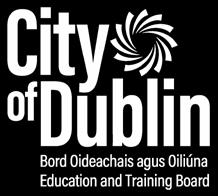
SKILLS TO ADVANCE
Part-time courses funded under BTEI
Full-time courses are eligible for SUSI Grant
